

10 Movie Review Examples That Will Help You Write Better Reviews
Studying movie review examples is a great place to start if you’re looking for inspiration for your own movie reviews.
This article has gathered different kinds of movie review examples that will help you write better and more insightful reviews in whatever style you choose.
There is an overwhelming library of movie reviews to sift through, but having studied many reviews by Pulitzer Prize-winning film critics along with your average movie review articles published online, I’ve been able to find a few movie reviews that provide a great template for crafting a review of your own.
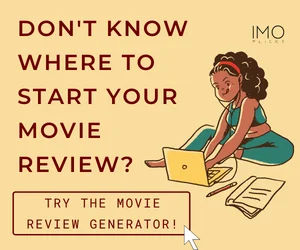
10 Detailed Movie Review Examples
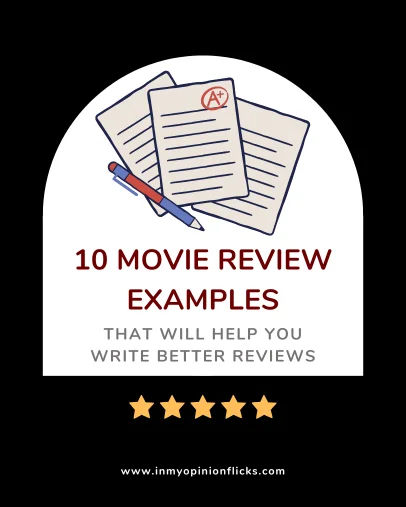
The Classic Movie Review
A classic movie review example has a neat structure that clearly communicates the author’s sentiment toward the film in a clean, straightforward manner.
Roger Ebert’s review of North is the perfect example of that.
1. “North” by Roger Ebert
This review starts with a catchy hook, making readers curious for Ebert to elaborate on his statements.
“I have no idea why Rob Reiner, or anyone else, wanted to make this story into a movie, and close examination of the film itself is no help.”
The opening sentence of this movie review example makes it clear to the audience that Ebert did not enjoy the film in question and if they would like to know why, they are encouraged to continue reading.
The whole first paragraph is chock full of strong adjectives setting the tone for the scathing critique this film is about to get.
Moving on to the next paragraph of this movie review example, Ebert gives a quick synopsis of what this film is about, filling the audience in on the story in case they’re unaware.
“He [Elijah Wood] plays a kid with inattentive parents, who decides to go into court, free himself of them, and go on a worldwide search for nicer parents.”
Following the paragraph summarizing the main plot of the film, the movie review dives straight into the critique explaining why this film garnered the strong adjectives it received in the opening paragraph:
“This idea is deeply flawed. Children do not lightly separate from their parents – and certainly not on the evidence provided here, where the great parental sin is not paying attention to their kid at the dinner table.”
In this movie review example, Ebert dives deep into the oddities of the narrative and what makes it so unbelievable.
He questions the director’s decisions and the plot’s direction as well in these middle paragraphs:
“What is the point of the scenes with the auditioning parents?… They are not funny. They are not touching. There is no truth in them.”
Ebert uses the middle paragraphs to dissect what does not work in the film.
In the final paragraphs of this movie review example, Ebert closes out by reiterating his sentiments towards the film, giving readers a good idea of whether the movie would be something he would recommend others watch.
“I hated this movie. Hated hated hated hated hated this movie. Hated it. Hated every simpering stupid vacant audience-insulting moment of it.”
“‘North’ is a bad film – one of the worst movies ever made.”
After reading Ebert’s movie review example there is no question of whether he liked the movie or not. I don’t know, he might’ve even mentioned hating it at one point…
And he makes it clear what plot and artistic choices played into his final assessment of the film.
Would you whip out your cash to experience the movie North after reading a review like this?
With this straightforward, informative, evidence-supported review, there is no confusion about the perceived quality of this film.
READ THE FULL REVIEW OF NORTH BY ROGER EBERT
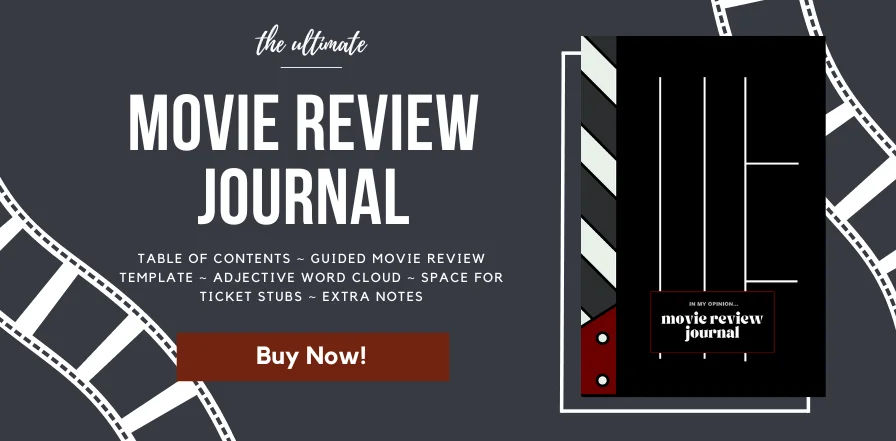
The Real World Parallel Review
A movie review that can parallel the events occurring within the movie with events occurring outside of the movie shows a deeper level of critical thinking.
This is one of the movie review examples that truly exemplifies a deep critical thinker.
2. “The Flash” by Justin Chang
This movie review example starts right away with a brief synopsis of what the movie, The Flash, is about.
“‘The Flash’ is a time-travel story and a cautionary tale, a warning of how dangerous it can be to change the past or mess around with alternate realities.”
Same as with the classic movie review, this reviewer also hints at his overall sentiments towards the film.
“…this initially enjoyable, increasingly sloppy megabucks mess…”
This review, unlike the classic movie review, spends more time following the plot of the story through a biased lens, further walking readers through the details of the story.
“He gets stuck in the past and… winds up unwisely joining forces with a teenage version of himself (also Miller, with floppier hair), who’s had a much happier childhood but doesn’t (yet) have the Flash’s superheroic powers.”
After indirectly criticizing the CGI and praising the main actor’s performance, Chang gets into his main criticism of the review: the popular trend of reintroducing old versions of superheroes into new superhero movies.
“Really, though, is nostalgia that satisfying anymore?”
And it’s really this last sentence of the movie review example that ties this compelling thought together, not only concluding the movie but drawing a parallel to how the movie creators are perpetrators of the same mistake that the movie’s main character made.
“Lost in an endless game of IP-reshuffling musical chairs, Barry realizes, possibly too late, the futility of dwelling on the past — a fatuous lesson from a movie that can’t stop doing the same.”
READ THE FULL REVIEW OF THE FLASH BY JUSTIN CHANG
3. “Bonnie and Clyde” by Roger Ebert
Another great movie review example, using a movie as a sense of societal self-reflection, is Roger Ebert’s review of Bonnie and Clyde . The final sentences of the review say:
“‘Bonnie and Clyde’ will be seen as the definitive film of the 1960s, showing with sadness, humor, and unforgiving detail what one society had come to… it was made now and it’s about us.”
READ THE FULL REVIEW OF Bonnie and Clyde BY Roger Ebert
4. “Black Panther” by Soraya Nadia McDonald
Yet another movie review example is this Black Panther review by Soraya Nadia McDonald.
The whole review deep dives into the cultural context of the movie and its timeliness or lack thereof.
“Honestly, the worst thing about Black Panther is that it had to be released in 2018 and not during the term of America’s first black president.”
This movie review example walks through the narrative praising the film’s actors, director, and cinematographer before ending on the note of its cultural relevance.
“Perhaps it’s even capable, just as The Birth of a Nation once was, of helping to steer an entire national conversation.”
READ THE FULL REVIEW OF Black Panther BY Soraya Nadia McDonald
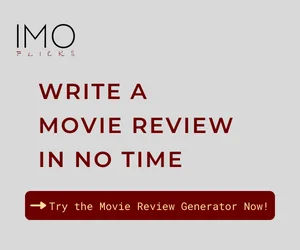
The Storytelling Movie Review
If you have a story of your own that you can parallel with the movie’s story, then connecting the movie’s narrative with your own is a particularly entertaining way to craft your review.
Instead of comparing the film to society as a whole, the following storytelling movie review examples compare the movie to specific stories they pull from their personal life.
5. “The Help” by Wesley Morris
One of my favorite reviews by Pulitzer prize-winning Wesley Morris is written in this style, drawing readers in with his own personal story:
“Three summers ago, I went to visit a friend in West Texas.”
“What happened in Texas?”, readers wonder as we curiously continue reading.
After 3 engaging paragraphs narrating a strange, racial encounter in Texas, Morris introduces the movie, The Help .
“This pretty much captures the cognitive dissonance of watching “The Help’’: One woman’s mammy is another man’s mother.”
The following paragraph gives a synopsis of the film and introduces the audience to the main characters:
“Meanwhile, the heart of the film itself belongs to Aibileen Clark (Viola Davis) and Minny Jackson (Octavia Spencer), the two very different maids and best friends at the center of the story.”
The center of this movie review example narrates the happenings of the movie from a biased point of view before presenting some debate points about the movie’s approach to race relations.
“‘The Help’ joins everything from “To Kill a Mockingbird’’ to “The Blind Side’’ as another Hollywood movie that sees racial progress as the province of white do-gooderism.”
Morris then praises the actors’ performances in this very character-based film but is unable to shake the social weight of the casting that this film requires:
“And yet here’s the question you ask as you watch a black actor in 2011 play a white lady’s maid, decades and decades after that was the only job a black woman in Hollywood could get. What went through the minds of Davis, Spencer, and Aunjanue Ellis, who plays Hilly’s maid, as they put on those uniforms and went to work?”
Morris finishes off the review sure to reference the personal story that he introduced in the beginning before leaving the reader with something to ponder.
“These are strong figures, as that restaurant owner might sincerely say, but couldn’t they be strong doing something else?”
Morris’s final statements in this movie review example make it clear his assessment of the film’s quality is good but its messaging is questionable, allowing the audience to make a judgment on whether they’d like to see the film for themselves.
“On one hand, it’s juicy, heartwarming, well-meant entertainment. On the other, it’s an owner’s manual.”
READ THE FULL REVIEW OF THE HELP BY WESLEY MORRIS
6. “Me Without You” by Stephen Hunter
This movie review example also tells a story although it’s not personal.
Instead of starting by talking about the movie or talking about himself, Hunter begins the review like a novel. With an untethered phrase that needs further explanation.
“Friendship isn’t rocket science. It’s much harder.”
He then lists out all of the complexities of trying to maintain a friendship, painting a picture to support his point.
“Oh, yeah, it’s easy to say just be loyal and true and that makes you a good friend. But suppose the other person does something that really irks you, like chew gum or vote Democratic?”
Hunter doesn’t leave you hanging for too long before segueing into how this thought point relates to the film.
“And that thorniness, that dark underbelly of it, is the gist of the acerbic British import ‘Me Without You…'”
As usual, a sign of good storytelling, he finishes this movie review example with his full-circle concluding statement on friendship.
“But the truth is, of course, that friendship matters to those of us who still claim membership in the human race…”
READ THE FULL REVIEW OF ME WITHOUT YOU BY STEPHEN HUNTER (Under the title: ‘Me’: Friendship as Relationship)
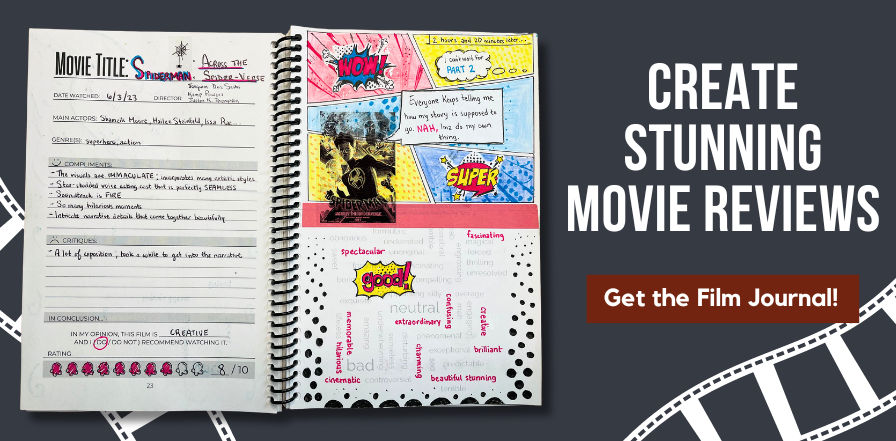
The Unconventional Movie Review
A less common but creative and fun way to approach a movie review is to approach it from a different angle or point of view. To write it in a way that’s unexpected.
7. “ET” by Roger Ebert
In another movie review example from Roger Ebert, instead of approaching this review traditionally, Ebert rather writes the review as a letter to his grandchildren.
Rather than addressing the readers, he addresses his grandchildren in his movie review:
“Dear Raven and Emil: Sunday we sat on the big green couch and watched “E.T. The Extra-Terrestrial” together with your mommy and daddy.”
After noting how his grandchildren reacted to climactic parts of the film, Ebert recounts the events of the movie, ET, continuing to include his grandchildren’s remarks and reactions.
“The camera watches Elliott moving around. And Raven, that’s when you asked me, “Is this E.T.’s vision?” And I said, yes, we were seeing everything now from E.T.’s point of view.”
Ebert uses this opportunity to make a simplified analysis of the director’s use of POV in the movie, praising the film’s direction without losing the context of a grandfather’s letter.
“Some other filmmaker who wasn’t so good might have had subtitles saying, “E.T.? Are you out there? It’s Mommy!” But that would have been dumb.”
Ebert ends this movie review example like anyone would end a letter, with good wishes and a signature.
“Well, that’s it for this letter. We had a great weekend, kids. I was proud of how brave you both were during your first pony rides. And proud of what good movie critics you are, too. Love, Grandpa Roger”
The average person has a 7-8th grade reading level, so a simple letter like this, is not only cute, creative, and endearing but it’s incredibly easy to read and understand the critic’s assessment of the movie.
READ THE FULL REVIEW OF ET BY Roger Ebert
8. “Spider-Man Into the Spider-Verse” by IMO Flicks
Another unconventional movie review example is one that I wrote for this blog website.
Instead of writing from my point of view, I decided to write from the point of view of an out-of-touch grandma, someone who may not have the background knowledge to really understand and appreciate the film.
I approached the film this way because I was tired of reviewing Marvel Superhero films but the thought of writing it as an out-of-touch grandma made the review so much more fun and less pressure-filled, even if it’s really not the most straightforward or informational read.
The review does not include a clear synopsis and the critiques of the film waver between genuine observations and areas that the grandma misunderstood.
It was a blast to write.
The grandmother writer uses the remarks of her grandchildren as a voice of reason for the film.
“My granddaughter told me to rate this spider film [ Spider-Man: Across the Spider-Verse ] out of 10 points. I initially wanted to give it 4 points out of 10… Apparently, my grandchildren think this rating is ridiculous. One of my grandsons almost threw a chair. He gave the film a 200/10, claiming it’s one of the best films he’s ever seen.”
This sort of review may not be as befitting for a serious homework assignment but if there’s space to think outside the box, I say go for it.
READ THE FULL REVIEW OF Spider-Man: Across the Spider-Verse
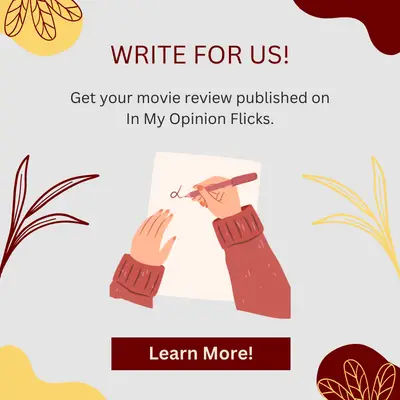
The Self-Aware Review
Similar to the unconventional movie review, but not quite as unconventional, these movie review examples are self-aware of their influential power. It breaks the fourth wall of movie reviews so to speak.
9. “Manchester By the Sea” by Ty Burr
This movie review example of Manchester By the Sea wants to encourage you to watch the movie but doesn’t want your expectations so high that you don’t experience the same subtle unexpected magic that the movie works on viewers.
Burr explains this in the first paragraph:
“Nothing destroys an audience’s appreciation of a small good movie like advance praise.”
Careful to not ruin the audience’s expectations, Burr goes on to begin every following paragraph with a phrase that denies all of the critiques that follow.
“So I won’t tell you that I’ve seen “Manchester by the Sea” twice now and both times felt haunted for weeks.”
“I won’t bother you with how the movie stands as a soul-satisfying comeback for its maker…”
“I could say, but I won’t, that we’ve all seen too many movies in which a lost soul comes out of his shell and rejoins the human race after he inherits a kid from a dead relative.”
The entire center of the film covers the movie in a way that says, “You didn’t see me. I was never here.” Good and well knowing that people are going to be more curious about this film and expect it to be as fantastic as Burr says.
But don’t worry, Burr accounts for this “undesired” outcome that he had been trying to avoid from the beginning with this closing paragraph.
“If I do tell you all this, forget I ever did. Just remember you heard somewhere that “Manchester by the Sea” is an experience worth having…”
READ THE FULL REVIEW OF MANCHESTER BY THE SEA BY TY BURR (Under the title: A Shore Thing)
10. “Mark Kermode” by Mamma Mia
Kermode’s review of Mama Mia takes his self-awareness in a different direction where he personally loves the movie Mama Mia and is not afraid of letting the world know it.
In fact, the movie has brought something to life in him as a movie critic.
“One minute I was a miserable critic; the next, everything had gone pink and fluffy.”
Kermode continues the movie review example, touching on the actor’s performances, the director’s execution of the film, and the soundtrack before returning to how the film affected him as a critic.
“I feel duty-bound to report that I came out of the screening an utter wreck.”
Further aware that as a serious critic, he probably shouldn’t like this film as much as he did, he lets his guard down and leans into the wonder of the film.
“I have certainly mellowed, and perhaps my critical faculties have withered and died. But I simply can’t imagine how Mamma Mia! Here We Go Again could be any better than it is.”
The self-aware review speaks to the readers as a friend rather than as a removed source of movie information.
A lot of the time, this personal voice can be merged with other review styles as well.
READ THE FULL REVIEW OF Mamma Mia by Mark Kermode
Common Questions
How to write a movie review.
To write a movie review you would need to watch the movie and take good notes, then you would craft an attention-hooking introduction, a few center paragraphs explaining your critiques of the film, before concluding on whether you’d recommend the film or not. This article breaks down the 10 steps to writing a movie review effortlessly .
What should a good movie review include?
A good movie review should include a synopsis of the film, a clear stance on whether the film was good or not, including why or why not, and a conclusion that makes it clear whether the critic would recommend others to watch the film or not.
What is the best movie review for students?
The best movie review example for students would be the classic movie review because it’s straightforward and the easiest to follow and grade.
In Conclusion…
There are so many movie review examples to choose from but the majority can fall into one of these 5 groups: the classic movie review, the real-world parallel, the storytelling review, the unconventional review, and the self-aware review.
If you would like to view 50 more outstanding movie review examples , I’ve grouped some here in a shared Word document available for free!
I hope this article was able to provide some movie review examples to help you craft your own. Happy movie reviewing!
What’s your favorite movie review example? Let me know in the comments below!
And be sure to subscribe for the latest blog updates (form in sidebar).
Peace, love, and lots of popcorn,
When I'm not over-analyzing movies, I'm eating chocolate, belting my favorite songs, and binge-watching reality dating shows. Feel free to share your opinions with me and follow me through my social links!
View all posts
Enjoy this blog? Please spread the word 🙂

- Share on Tumblr

You May Also Like

Is Red White And Royal Blue Good? | Feel-Good Escapism But Not The Best Movie
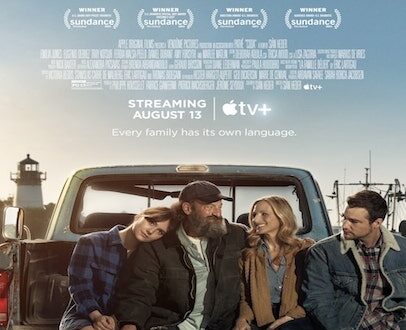
CODA Movie Review | Beautiful Beyond Words
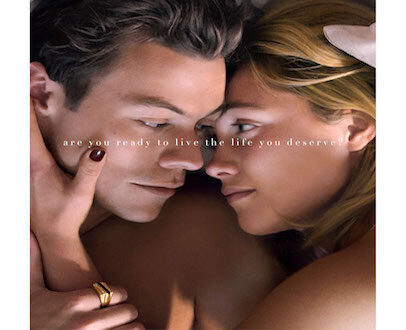
Don’t Worry Darling Harry Styles Accent Explained (it makes sense)
Leave a reply cancel reply.
Your email address will not be published. Required fields are marked *
Notify me of follow-up comments by email.
Notify me of new posts by email.
Press ESC to close
How to Write a Movie Review: A Step-by-Step Guide with Examples
- backlinkworks
- Writing Articles & Reviews
- October 3, 2023

Introduction
Watching movies is a popular pastime for many individuals. While some enjoy being entertained by the latest releases, others find satisfaction in analyzing and critiquing films. If you fall into the latter category, then writing a movie review can be a rewarding activity. Whether you aspire to become a professional film critic or simply want to share your opinion with others, this step-by-step guide will help you craft a compelling and engaging movie review.
Step 1: Watch the Movie
Before you can write a movie review, you need to watch the film attentively. Take notes while watching, paying attention to the plot, characters, cinematography, acting, and any other elements that stand out. Understanding the movie in its entirety is crucial to providing an informed perspective in your review.
Step 2: Gather Your Thoughts
After watching the film, take some time to gather your thoughts and reflect on your overall impressions. Did you enjoy the movie? What were its strengths and weaknesses? Consider the movie’s themes, messages, and intended audience. Jot down key points to use as the foundation of your review.
Step 3: Start with a Strong Introduction
The introduction sets the tone for your movie review. Begin with a captivating hook that grabs the reader’s attention and provides a brief overview of the film. Offer some context, such as the genre or director, and any interesting background information that adds value to the review. Make sure to state your overall opinion clearly and concisely.
Step 4: Analyze the Plot and Storyline
Provide a detailed analysis of the movie’s plot and storyline. Discuss the main narrative, subplots, and any twists or surprises. Evaluate the pacing, coherence, and depth of the story. Highlight any standout moments or memorable scenes that contribute to the overall narrative experience.
Step 5: Evaluate the Acting and Characters
An important aspect of any movie review is assessing the acting performances and the development of the characters. Discuss the actors’ portrayals, their chemistry, and whether they effectively brought their characters to life. Analyze the characters’ depth, growth, and believability. Give examples to support your claims.
Step 6: Critique the Cinematography and Visuals
The cinematography and visual elements greatly impact a movie’s overall appeal. Evaluate the camera angles, lighting, set design, costumes, and any special effects used. Explain how these choices contribute to the storytelling and enhance the viewer’s experience.
Step 7: Assess the Sound and Music
The sound design and music play a vital role in creating the right atmosphere for a film. Analyze the sound effects, soundtrack, and any background music utilized. Discuss how the audio elements complemented the visuals and enhanced the emotional impact of key scenes.
Step 8: Highlight the Strengths and Weaknesses
In this section, discuss the movie’s strengths and weaknesses. Offer constructive criticism where necessary, but also acknowledge the film’s positive aspects. Be specific and provide examples to support your claims, giving readers a well-rounded perspective of the overall quality of the movie.
Step 9: Conclusion
The conclusion should summarize your main points and provide a final assessment of the film. Reiterate your overall opinion and encourage readers to watch or avoid the movie based on your review. End with a thought-provoking statement or a call-to-action to engage your audience further.
Frequently Asked Questions (FAQs)
1. how long should a movie review be.
A movie review can vary in length, but a typical review ranges from 500 to 1000 words. However, if you feel the need to provide a more in-depth analysis, IT can extend beyond the usual word count.
2. Should I include spoilers in my review?
IT is best to avoid spoilers, as they can ruin the viewing experience for those who haven’t seen the film. If you must discuss specific plot details, clearly indicate spoiler warnings and use HTML tags to hide text, ensuring readers have the option to read or skip the spoilers.
3. How do I maintain objectivity in my review?
While a movie review reflects your personal opinion, try to maintain objectivity by offering balanced arguments and supporting your statements with evidence from the film. Acknowledge that different viewers may have different tastes and perspectives.
4. Is IT necessary to include a rating in my review?
Including a rating is not essential, but IT can provide a quick summary of your overall opinion. You can use a numerical scale, stars, or any other rating system you find suitable. Just ensure you explain the reasoning behind your rating within the body of the review.
5. How can I make my review stand out?
To make your review stand out, write in a clear and engaging style. Incorporate your unique voice and use captivating language to draw readers in. Including relevant screenshots from the movie or embedding a trailer can also enhance the overall appeal of your review.
writing a movie review provides an opportunity to express your thoughts and opinions about a film while helping others make informed decisions about their movie choices. By following this step-by-step guide, you can craft a well-written and insightful review that captures the essence of the movie. Remember to watch the film attentively, gather your thoughts, and provide a balanced assessment of its various elements. With practice, you’ll refine your skills as a movie reviewer and contribute to the world of film criticism.
Understanding the Different Pricing Models of Odoo
How to set up and manage multiple domains in wordpress.

Recent Posts
- Driving Organic Growth: How a Digital SEO Agency Can Drive Traffic to Your Website
- Mastering Local SEO for Web Agencies: Reaching Your Target Market
- The Ultimate Guide to Unlocking Powerful Backlinks for Your Website
- SEO vs. Paid Advertising: Finding the Right Balance for Your Web Marketing Strategy
- Discover the Secret Weapon for Local SEO Success: Local Link Building Services
Popular Posts

Shocking Secret Revealed: How Article PHP ID Can Transform Your Website!

Uncovering the Top Secret Tricks for Mastering SPIP PHP – You Won’t Believe What You’re Missing Out On!

Unlocking the Secrets to Boosting Your Alexa Rank, Google Pagerank, and Domain Age – See How You Can Dominate the Web!

Discover the Shocking Truth About Your Website’s Ranking – You Won’t Believe What This Checker Reveals!

10 Tips for Creating a Stunning WordPress Theme
Explore topics.
- Backlinks (2,425)
- Blog (2,744)
- Computers (5,318)
- Digital Marketing (7,741)
- Internet (6,340)
- Website (4,705)
- Wordpress (4,705)
- Writing Articles & Reviews (4,208)

- Freelancing
- Trending Stories

What’s the best way to pen down some phrases for tantalizing plots, spectacular plot twists, and beguiling characters to create the hype for any movie? You guessed it right, It’s a movie review. Now, the question arises how to write a movie review?
For the film buffs who have an underlying penchant for watching the latest movie in the market, movie reviews are the perfect salvation for them to determine if the latest flick is worth it or not.
Some avid fans also love spilling the beans about a movie after watching it. However, the remarks greatly vary on whether the film was a hit or miss. Even writing a movie review is art given it has to be a seamless blend of opinion, some vivid imagery, and conclusive remarks.
The majority often miscalculate the importance of acing the technique to jot down a movie review. If you are one of the people who are confused about how to write a movie review or wish to perfect your movie review writing skills, then fasten your seat belt and prepare for takeoff!
Table of Contents
What is a movie review?
In general, a movie review is a genre of art criticism and journalism. It is a complex overview, usually made by a professional critic, of films that have just been released, to help decide what film to watch.
Professional reviews differ from those made by amateurs. Without a doubt, reviews by experienced critics are far more structured, sharper, and detailed. That’s not all! They are more compact in wording. In a professional movie review, you will always find awareness of the film’s director, their previous works, and previous filmmaker’s pictures, as well as a deep understanding of different film genres and classics for each of them, and filming techniques and modern trends.
Purpose of movie review
For starters, reviews and comments about movies are usually posted on social media profiles or public pages, review sites, and blogs, among other platforms. The primary purpose of a movie review is to advise the reader about the film and its sentiments. Seems simple, right? Reporting all events that happen and stating one’s opinion about them is a common mistake that many people make. Of course, the movie review allows writers to express their opinions about some film or documentary without any restraint. But one can only strike the perfect balance when there is an unbiased unanimous critique. So the bottom line is that an ideal review will combine both – the writer’s opinions and the element of an enigma.
Be it a successful trilogy or top Netflix, ratings and reviews are the detrimental factors of whether someone will want to see the movie or would skip it. Like an untapped portal, one should act like this is the perfect opportunity to introduce the cinematography work to its readers while writing. Always assume they haven’t seen it before. As a result, it becomes easier to analyze events that happened on the screen.
A film review should be precise enough to provide assistance in making an honest decision i.e. whether the reader wants to see it or if they’d like it. If you are a media student who is assigned the task of movie review writing, then the lecturers want to get more insight into your critical thinking skills and the ability to report events in a comprehensible manner.
In addition, the reader who taps on reading a film review wants to assess the way you analyze the plot and characters. After all, movie reviews also involve the analysis of events that happen. Reviews test writing and vocabulary skills, adapting to different genres and events they portray. That’s not all. It also weighs your capacity to sum up some significant twists and turns and report it in a cohesive, rational, and engaging fashion.
How to write a good movie review? You have to write a movie review for school and now what? Where to start, how to make it look more “academic”? Today, we have the opportunity to use numerous tools to make every part of our lives easier, and movie review writing is no exception. Throughout this tutorial, you’ll learn how to compose a report about some film and what tools to use to simplify the process.
While movie reviews entail more responsibility than initially thought, people find them fun and with this guide, you will too.
Step-by-step guide to how to write a movie review
New beginnings are always hard. This is the point where you set the pace and determine how to approach the task at hand (movie review writing) in the most efficient manner. Below, we list down some of the most useful tips to kick-start the movie review writing process:
First and foremost, watch the movie with a critical eye for the illustration and explanation in the review. The first time the film is watched you might have missed details owing to the entertainment and joy. So watch the movie or documentary twice and take notes of both major and minor events and characters. Never trust to gulp in the intricacies of the movie meaning do not rely on the power of your memory.
Carry out thorough research – It’s human nature to overlook or forget to carry out detailed research of the film and its makers. Just watching the movie with keen observation is never enough, research plays an equally noteworthy role. Look for details such as the name of the filmmaker and his/her motivation to make that film or documentary work, locations, plot, characterization, and historic events. Basically, the research phase should serve to collect information that provides more depth to the review
Analyze the movie after you watch it – Never start working on the review if you aren’t sure about all the fragments in regards to the film. Evaluate the movie from beginning to end. Re-watch it, if necessary, if you find some parts confusing. Only when you understand events that happened on the screen will you find it easier to create the review
Draft an outline that you will follow to write the review in a concise and cohesive fashion
Include examples of claims you make about the movie. If the plot has holes, then mention an example of a situation or scene when that was evident. Also, if the character(s) is poorly developed or bad casting affects the movie quality, name examples too. Provide examples when commenting on dialogues, locations, plot, everything. If you want the reader to agree with you, it’s essential to back up your claims with evidence. You don’t want to make it seem like you’re praising or criticizing the movie without any reason whatsoever
Consider and comment on a movie’s originality and quality of scenes. Explain how the movie stands out or whether it just uses the same approach that worked for previous works in the industry
How to organize your movie review
The quality of your review depends on many things namely, structure, vocabulary, and much more. Never underestimate the importance of a well-structured outline, regardless of the genre of the movie.
Primarily, things should be organized before you start writing. It is a great way to save time later on. Apart from dabbling in points to add, have a well-structured plan to follow. Here’s how to organize your movie review:
- Introduction (This section will include the title, release date, and background information)
- Summary of the story
- Analysis of the plot elements (Explain the rising action alongside the climax)
- Creative elements (dialogues, characters, use of colors, camera techniques, mood, tone, symbols, costumes or anything that contributes or takes away from the overall plot)
- Opinion (supported with examples and facts from the story)
- Conclusion (announcing whether the filmmaker was successful in his/her purpose, re-state your evidence, explain how the motion picture was helpful for providing a deeper understanding of the course topic)
Movie review elements
Moving on, let’s discuss the movie review elements that are key features when penning the writing.
The title of the film/documentary – Mention the title of the film twice in our headline features the name of the movie or documentary. Don’t skip mentioning the headline in the text. Always name the feature you’ve watched in the introductory paragraph. This may seem like a stupid thing to point out, but it’s one of the most common mistakes that students make
Summary – The whole point of the review is to summarize the documentary or movie for people who haven’t watched it yet. To make this as effective as possible, always assume that your professor hasn’t seen it either (as mentioned above). Why is this important? You won’t leave out some important details thinking he/she watched it already so they won’t bother. As a reviewer, your job is to explain what happened in the film and express whether the filmmaker failed or succeeded. Again, saying you liked or disliked it isn’t a viable comment. Your opinion has to be supported by specific reasons and examples from the feature itself
Filmmaker – Do a little research on the person who directed the piece. Is that person a controversial figure? Is he/she known for a political stance? Does the filmmaker have a significant background? Devote a paragraph or two to the person behind the movie and their other works in order to establish the significance of the film you are reviewing for the director’s career
Significance to your class – How does the content of the documentary or film fit into your course topic? Is it important for historical accuracy? If you are watching the motion picture for history class, make note of over-dramatization. If the motion picture is based on the book you’ve analyzed in English class, you can mention similarities, differences, or some elements that the film contains, but the book doesn’t, and so on
Creative elements – Filmmakers work hard to include creative elements in their motion pictures. How are these elements important to the plot and movie in general? For example, costumes can either enhance the movie or betray its intent. Colors can be vivid and lift the atmosphere or mood in the movie or they can be dull and make it seem depressing. Good sound effects enrich the viewing experience while bad ones only destroy everything. Moreover, camera movements and angles also add elements to the story. Take notes of symbols in the story, if any.
Actors and characters – let’s not forget the casting! Were the actors realistic? Did they portray the role of a specific character successfully? Did they have good acting skills? Do you believe that some particular actor was the right fit for the role?
Movie review format
Structuring is extremely useful in any type of paper and a movie review isn’t an exception. A written outline will help you organize your thoughts properly, not to forget anything and to actually end up writing it faster. Here is an example outline you may use:
- Introduction – In this part you need to provide some general information about the picture: title, release date, main actors, filmmakers, film company and filming budget.
- Summary of the story – This is a short exposition of movie plot, characters and their interaction.
- Analysis of the plot elements – starting point, rising action, and climax.
- Analysis of creative elements – dialogues, characters, use of colors, camera techniques, mood, tone, symbols, costumes or anything that contributes or takes away from the overall plot.
- Analysis of the topic and its implementation – viewers’ understanding of the topic, relevance of the topic, and comparison with other resembling works.
- Opinion – Your point of view supported with examples and facts from the story.
- Conclusion – Announce whether the filmmaker was successful in his/her purpose. Explain how the motion picture was helpful in providing a deeper understanding of the course topic.
Movie review format for students
Feature films and documentaries may serve as primary resources for your research. As for the fiction movies, a student may use them for inspiration while writing, for instance, a compare and contrast essay on the similarities and differences of a book and film based on that piece of literature. In any case, films can be used as great supplemental learning tools.
If you look at our movie review examples available for free, you can notice that the structure of such papers is different from an ordinary essay’s outline. By their nature, film reports are also different from essays. You should not also confuse a brief summary with a detailed review, which also implies an in-depth analysis of the chosen piece.
So, in any film critique example, you can notice the following structure:
Title of the analyzed work. A writer has to specify the movie’s title in the opening part and put down the release date.
An abstract usually refers to the summary of the main points. In the case of the samples of movie reviews, that is a summary of the plot. Discuss what happened in the video and share your thoughts: was it a success or failure?
You may say that you hated the movie, or, vice versa, believe it’s the best motion picture in the world, but make sure to provide specific reasons. That is why you need to watch the full movie and pick various details like character quotes to prove your point of view.
To answer various questions that the audience may have, an author should provide replies to meaningful questions about the movie maker/director. Decide whether this person can be considered a controversial figure. Is there any sort of political stance? Finally, think about a significant background a movie creator may have (if any). Depending on the answers to these questions, the length of your paper may vary.
Relevance to your subject
Was it a good idea to assign this movie to your class? Think about whether the video content matches the topics that you study currently or have recently covered.
Perhaps, the movie has to do with historical accuracy. Include a note of embellishments or over-dramatization if you write for your history lesson. Comments and citations from credible sources can be useful.
Creative elements
You can see from any movie critique example that a list of creative tools is listed. Those could be costumes, decorations, colors, sound effects, music, and other visual and audio elements. A paper writer should discuss which of the elements add drama and which of them have comical purposes.
Mistakes to avoid while writing a movie review
Below, we list down some of the most common mistakes while writing a movie review. If you are a student who has an assignment or a movie enthusiast who wishes you pour their emotions with fellow fans, we recommend you give this section a thorough read,
Retelling the film plot in detail – The idea of a movie review is not to put the film on paper or spill the beans. Everyone abhors spoilers. So try sharing the general story by adding some spice to make your reader curious about seeing the film.
Giving a too general opinion of the film – Some writers take the generic term of general writing
Remember that things are rarely unequivocal. Even if you don’t like the content and quality of the film, don’t forget to mention if the music was actually pretty good, or if one of the actors managed to portray a believable character.
Lack of evidence – Presenting your opinion without any explanation why you think that way won’t be considered reliable. The unfounded statement isn’t a good resource for a decision, even if we are talking about a choice of which movie to watch.
Lack of film research – Don’t force your readers to conduct their own research, or to look for another review to find out the background information of a movie.
Absence of structure – If your work is not structured properly, it will be really difficult to follow your thoughts and understand your points. Reviews should be helpful to readers, and good structure helps get your message across correctly.
No conclusions and recommendations – As we mentioned above, providing recommendations regarding the film is one of the main purposes of writing a movie review. Do not deprive readers of your findings and thoughts. By recommending a good movie to watch, you may make someone’s evening.
Movie review essay
What’s your story? Any individual who has carried on with a full life has something entrancing to impart to the world. The secret to composing a life account is to deal with it like any great story: it ought to have a hero (you), a focal clash, and a cast of interesting characters to keep individuals locked in. You might need to consider a specific topic or idea that has been available in your everyday life to rotate your story around.
The wide classification of life accounts remains among the strong classes of verifiable composition. Blockbuster records show that readers love to find out about the lives of their kindred people, especially those with recognized individual stories. An account composed by its subject is known as an autobiography. As a firsthand record of the writer’s own life, an autobiography offers an unrivaled degree of closeness to perusers of the more extensive history classification.
If you want to know more about how to write an autobiography, then you have come to the right place. We have gathered all relevant information to help you understand everything that you need to know. Read on to figure out how to make the narrative of your life and clean your composition to make it sing.
Good movies make great reviews
Words and catchlines can pave the way to describe anything including any genre of film. So
Basically, you can write a movie review on pretty much any film. However, it is advisable by the experts and there is a general debate that is careful while dabbling in tricky or multi-themed genres. Careless choices result in trouble points and confusing reviews that fall flat on the readers. Hence, it is essential that you pick a film that you will be able to analyze and evaluate. Generally, for a movie review, students choose films they either like or don’t like.
What makes a movie great?
No critics have ever described any film as the epitome of perfection. Quintessential movies are dubbed as major successes on the basis of spectacular characters or fulfilling plotlines. Other things include visual aesthetics, the quality of directing and acting, and the impression it has.
Typically, you can suggest if a characteristic movie is great when it keeps the audience engaged. A great movie also leaves the audience with a powerful impression and then something to think about once the credits roll.
Key pointers to remember while writing a movie review
Understand that any piece of writing is not a do-or-die job. It demands consistency and devotion. However, the key to writing an exceptional movie review is understanding your target audience. So, keep the following key pointers in your mind while writing:
- Discuss the film plot – The goal is to discuss the movie without giving away spoilers and hurling the entire plot in your article. The more the mystery, the better the movie review.
- Share some information about the characters – Thrust the film’s main lead and supporting characters in the limelight. Discuss their relations and events. Since reading the review shouldn’t replace watching the film, just touch base on the points that make the film worth watching.
- Analyze the film – In general retrospect, the star cast or their impeccable acting skills set the film apart from its contemporaries. The work of the director, theme, music, and other features become objective and detailed in your evaluations.
- Share your opinion – Describe your feelings during, and after watching the movie and specify what you liked, and what you didn’t like. Provide your general impression about the film based on examples, descriptions, and comparisons to enable readers to make their own decisions.
- Give a recommendation – A review(no matter what kind) is a recount of opinions and is influenced by the writer’s preferences. Avoid being categorical and focus on the highs and lows of the film from a general prospect.
- Entertain the reader – The target audience has to feel entertained, amused or glad by the written material. The review should pique curiosity and many people read movie reviews because it is actually kind of fun in itself. Try to make an easy-to-read review, and write in an interesting manner.
The accomplishment of a decent movie review or any book for that matter comes from the capacity of the writer to show perusers the story from “an external perspective”, and cause the reader to feel like they are in your place and understand your point of view. Everyone couldn’t care less about your troublesome youth, your parents’ separation, or the way that in school you were the nerd with glasses. However, on the off chance that the troubles experienced by you will be shown so the peruser learns a few lessons for himself – this would qualify as a decent book.
Thus, you can see that writing a movie review is not an easy task. You should design and organize your time, read and get motivated by reading other reviews, surfing online by looking for composing styles, language structure, and artistic descriptions to describe the cinematography. Remember to sort out your last objective and why you need to compose a movie review. The entirety of this time investment with end with you feeling a sense of accomplishment and success as your labor of love gets completed.
Ideally, this article will help you in this intriguing yet hard way. So you do not have to worry anymore about writing. Just pick a pen or open your PC and start your magnum opus. Just remember that honesty is the best policy and to avoid bias at every cost.

You Might Also Like

What Is A Warrant In Writing? A Guide For The Uninitiated.

A Complete Guide On How To Write A Vision Statement? Some Tips And Tricks To Inspire You

An Ultimate Guide On How To Write A Synopsis
No comments, leave a reply cancel reply.
Save my name, email, and website in this browser for the next time I comment.
- PRO Courses Guides New Tech Help Pro Expert Videos About wikiHow Pro Upgrade Sign In
- EDIT Edit this Article
- EXPLORE Tech Help Pro About Us Random Article Quizzes Request a New Article Community Dashboard This Or That Game Popular Categories Arts and Entertainment Artwork Books Movies Computers and Electronics Computers Phone Skills Technology Hacks Health Men's Health Mental Health Women's Health Relationships Dating Love Relationship Issues Hobbies and Crafts Crafts Drawing Games Education & Communication Communication Skills Personal Development Studying Personal Care and Style Fashion Hair Care Personal Hygiene Youth Personal Care School Stuff Dating All Categories Arts and Entertainment Finance and Business Home and Garden Relationship Quizzes Cars & Other Vehicles Food and Entertaining Personal Care and Style Sports and Fitness Computers and Electronics Health Pets and Animals Travel Education & Communication Hobbies and Crafts Philosophy and Religion Work World Family Life Holidays and Traditions Relationships Youth
- Browse Articles
- Learn Something New
- Quizzes Hot
- This Or That Game New
- Train Your Brain
- Explore More
- Support wikiHow
- About wikiHow
- Log in / Sign up
- Arts and Entertainment
- Film Studies
How to Write a Movie Review
Last Updated: March 13, 2024 Fact Checked
wikiHow is a “wiki,” similar to Wikipedia, which means that many of our articles are co-written by multiple authors. To create this article, 179 people, some anonymous, worked to edit and improve it over time. There are 14 references cited in this article, which can be found at the bottom of the page. This article has been fact-checked, ensuring the accuracy of any cited facts and confirming the authority of its sources. This article has been viewed 5,584,162 times. Learn more...
Whether a movie is a rotten tomato or a brilliant work of art, if people are watching it, it's worth critiquing. A decent movie review should entertain, persuade and inform, providing an original opinion without giving away too much of the plot. A great movie review can be a work of art in its own right. Read on to learn how to analyze a movie like a professional film critic, come up with an interesting thesis, and write a review as entertaining as your source material.
Sample Movie Reviews

Writing an Intro for a Movie Review

- Comparison to Relevant Event or Movie: "Every day, our leaders, politicians, and pundits call for "revenge"– against terrorist groups, against international rivals, against other political parties. But few of them understand the cold, destructive, and ultimately hollow thrill of revenge as well as the characters of Blue Ruin. "
- Review in a nutshell: "Despite a compelling lead performance by Tom Hanks and a great soundtrack, Forrest Gump never gets out of the shadow of its weak plot and questionable premise."
- Context or Background Information: " Boyhood might be the first movie made where knowing how it was produced–slowly, over 12 years, with the same actors–is just as crucial as the movie itself."

- Using stars, a score out of 10 or 100, or the simple thumbs-up and thumbs-down is a quick way to give your thoughts. You then write about why you chose that rating.
- Great Movie: ABC is the rare movie that succeeds on almost every level, where each character, scene, costume, and joke firing on all cylinders to make a film worth repeated viewings."
- Bad Movie: "It doesn't matter how much you enjoy kung-fu and karate films: with 47 Ronin, you're better off saving your money, your popcorn, and time."
- Okay Movie: "I loved the wildly uneven Interstellar far more than I should have, but that doesn't mean it is perfect. Ultimately, the utter awe and spectacle of space swept me through the admittedly heavy-handed plotting and dialogue."

- Great: "Michael B. Jordan and Octavia Spencer's chemistry would carry Fruitvale Station even if the script wasn't as good. The mid-movie prison scene in particular, where the camera never leaves their faces, shows how much they can convey with nothing but their eyelids, the flashing tension of neck muscles, and a barely cracking voice."
- Bad: " Jurassic World's biggest flaw, a complete lack of relatable female characters, is only further underscored by a laughably unrealistic shot of our heroine running away from a dinosaur – in heels."
- Okay: "At the end of the day, Snowpiercer can't decide what kind of movie it wants to be. The attention to detail in fight scenes, where every weapon, lightbulb, and slick patch of ground is accounted for, doesn't translate to an ending that seems powerful but ultimately says little of substance."

- Does the film reflect on a current event or contemporary issue? It could be the director's way of engaging in a bigger conversation. Look for ways to relate the content of the film to the "real" world.
- Does the film seem to have a message, or does it attempt to elicit a specific response or emotion from the audience? You could discuss whether or not it achieves its own goals.
- Does the film connect with you on a personal level? You could write a review stemming from your own feelings and weave in some personal stories to make it interesting for your readers.
Composing Your Review

- When you name characters in your plot summary, list the actors' names directly afterward in parenthesis.
- Find a place to mention the director's name and the full movie title.
- If you feel you must discuss information that might "spoil" things for readers, warn them first.

- Cinematography: " Her is a world drenched in color, using bright, soft reds and oranges alongside calming whites and grays that both build, and slowly strip away, the feelings of love between the protagonists. Every frame feels like a painting worth sitting in."
- Tone: "Despite the insane loneliness and high stakes of being stuck alone on Mars, The Martian's witty script keeps humor and excitement alive in every scene. Space may be dangerous and scary, but the joy of scientific discovery is intoxicating."
- Music and Sound: " No Country For Old Men's bold decision to skip music entirely pays off in spades. The eerie silence of the desert, punctuated by the brief spells of violent, up-close-and-personal sound effects of hunter and hunted, keeps you constantly on the edge of your seat."
- Acting: "While he's fantastic whenever he's on the move, using his cool stoicism to counteract the rampaging bus, Keanu Reeves can't quite match his costar in the quiet moments of Speed, which falter under his expressionless gaze."

- Keep your writing clear and easy to understand. Don't use too much technical filmmaking jargon, and make your language crisp and accessible.
- Present both the facts and your opinion. For example, you might state something such as, "The Baroque background music was a jarring contrast to the 20th century setting." This is a lot more informative then simply saying, "The music was a strange choice for the movie."

- Great: "In the end, even the characters of Blue Ruin know how pointless their feud is. But revenge, much like every taut minute of this thriller, is far too addictive to give up until the bitter end.""
- Bad: "Much like the oft-mentioned "box of chocolates", Forest Gump has a couple of good little morsels. But most of the scenes, too sweet by half, should have been in the trash long before this movie was put out."
- Okay: "Without the novel, even revolutionary concept, Boyhood may not be a great movie. It might not even be "good.” But the power the film finds in the beauty of passing time and little, inconsequential moments – moments that could only be captured over 12 years of shooting – make Linklater's latest an essential film for anyone interested in the art of film."
Polishing Your Piece

- Ask yourself whether your review stayed true to your thesis. Did your conclusion tie back in with the initial ideas you proposed?
- Decide whether your review contains enough details about the movie. You may need to go back and add more description here and there to give readers a better sense of what the movie's about.
- Decide whether your review is interesting enough as a stand-alone piece of writing. Did you contribute something original to this discussion? What will readers gain from reading your review that they couldn't from simply watching the movie?

Studying Your Source Material

- The title of the film, and the year it came out.
- The director's name.
- The names of the lead actors.

- Make a note every time something sticks out to you, whether it's good or bad. This could be costuming, makeup, set design, music, etc. Think about how this detail relates to the rest of the movie and what it means in the context of your review.
- Take note of patterns you begin to notice as the movie unfolds.
- Use the pause button frequently so you make sure not to miss anything, and rewind as necessary.

- Direction: Consider the director and how he or she choose to portray/explain the events in the story. If the movie was slow, or didn't include things you thought were necessary, you can attribute this to the director. If you've seen other movies directed by the same person, compare them and determine which you like the most.
- Cinematography: What techniques were used to film the movie? What setting and background elements helped to create a certain tone?
- Writing: Evaluate the script, including dialogue and characterization. Did you feel like the plot was inventive and unpredictable or boring and weak? Did the characters' words seem credible to you?
- Editing: Was the movie choppy or did it flow smoothly from scene to scene? Did they incorporate a montage to help build the story? And was this obstructive to the narrative or did it help it? Did they use long cuts to help accentuate an actor's acting ability or many reaction shots to show a group's reaction to an event or dialogue? If visual effects were used were the plates well-chosen and were the composited effects part of a seamless experience? (Whether the effects looked realistic or not is not the jurisdiction of an editor, however, they do choose the footage to be sent off to the compositors, so this could still affect the film.)
- Costume design: Did the clothing choices fit the style of the movie? Did they contribute to the overall tone, rather than digressing from it?
- Set design: Consider how the setting of the film influenced its other elements. Did it add or subtract from the experience for you? If the movie was filmed in a real place, was this location well-chosen?
- Score or soundtrack: Did it work with the scenes? Was it over/under-used? Was it suspenseful? Amusing? Irritating? A soundtrack can make or break a movie, especially if the songs have a particular message or meaning to them.

Community Q&A

- If you don't like the movie, don't be abusive and mean. If possible, avoid watching the movies that you would surely hate. Thanks Helpful 1 Not Helpful 2
- Understand that just because the movie isn't to your taste, that doesn't mean you should give it a bad review. A good reviewer helps people find movie's they will like. Since you don't have the same taste in movies as everyone else, you need to be able to tell people if they will enjoy the movie, even if you didn't. Thanks Helpful 3 Not Helpful 0
- Structure is very important; try categorizing the different parts of the film and commenting on each of those individually. Deciding how good each thing is will help you come to a more accurate conclusion. For example, things like acting, special effects, cinematography, think about how good each of those are. Thanks Helpful 2 Not Helpful 0

You Might Also Like

- ↑ https://owl.purdue.edu/owl/subject_specific_writing/writing_in_literature/writing_about_film/terminology_and_starting_prompts.html
- ↑ https://www.spiritofbaraka.com/how-write-a-movie-review
- ↑ https://www.nyfa.edu/student-resources/9-tips-for-writing-a-film-review/
- ↑ https://en.oxforddictionaries.com/writing-help/top-tips-for-writing-a-review
- ↑ https://writingcenter.unc.edu/tips-and-tools/summary-using-it-wisely/
- ↑ https://twp.duke.edu/sites/twp.duke.edu/files/file-attachments/film-review-1.original.pdf
- ↑ https://www.dailywritingtips.com/7-tips-for-writing-a-film-review/
- ↑ https://owl.purdue.edu/owl/subject_specific_writing/writing_in_literature/writing_about_film/film_writing_sample_analysis.html
- ↑ https://learning.hccs.edu/faculty/onnyx.bei/dual-credit/movie-review-writing-guide
- ↑ https://writingcenter.unc.edu/tips-and-tools/conclusions/
- ↑ https://www.grammarly.com/blog/how-to-write-a-movie-review/
- ↑ https://gustavus.edu/writingcenter/handoutdocs/editing_proofreading.php
- ↑ https://writingcenter.unc.edu/tips-and-tools/editing-and-proofreading/
- ↑ https://edusson.com/blog/how-to-write-movie-review
About This Article
To write a movie review, start with a compelling fact or opinion to hook your readers, like "Despite a great performance by Tom Hanks, Forrest Gump never overcomes its weak plot." Then, elaborate on your opinion of the movie right off the bat so readers know where you stand. Once your opinion is clear, provide examples from the movie that prove your point, like specific scenes, dialogue, songs, or camera shots. To learn how to study a film closely before you write a review, scroll down! Did this summary help you? Yes No
- Send fan mail to authors
Did this article help you?

Featured Articles

Trending Articles

Watch Articles

- Terms of Use
- Privacy Policy
- Do Not Sell or Share My Info
- Not Selling Info
wikiHow Tech Help Pro:
Develop the tech skills you need for work and life
How To Write A Movie Review
Last updated on: Feb 9, 2023
How to Write a Movie Review - Steps and Examples
By: Cordon J.
Reviewed By: Rylee W.
Published on: Sep 7, 2021

It has become a trend to post your thoughts about a movie on public pages, social media platforms, review sites, blogs, etc.
Not only that, students in high school or college are also assigned to write a movie review in their academic life to test their review writing skills.
It’s easy if you have good observational and good analytical skills. Otherwise, it can become a bit of a headache.
You can learn how to write a movie review with the tips and examples provided in this step-by-step guide.

On this Page
What is the Main Purpose of Movie Reviews?
The chief purpose of writing film reviews is to provide information regarding the movie and its ideas to the readers.
In doing that, students often make a common mistake of elaborating all the events that occurred in a particular movie. They state personal opinions about the movie.
Where such a review permits writers to express their personal opinions regarding some documentary or film, these reviews require an objective and unbiased approach as well. Know that an ideal review combines both elements.
Your review deliberates why someone should watch the movie or not. Make sure to write your review by considering that no one has ever watched that particular film or documentary before. This helps a lot in analyzing events that have occurred on the screen.

Paper Due? Why Suffer? That's our Job!
The summary of the movie needs to be detailed enough to deliver assistance for the reader while making a true and honest decision.
How to Write a Good Movie Review?
It is always difficult to start writing any paper. If you are staring at a blank screen unable to come up with ideas, go through the steps given below to write a film review:
Let us discuss these steps in detail.
1. Watch the Movie Twice
It may sound obvious, but most of the students ignore it and simply copy-paste content posted by professional reviewers. It does not make a good impression, and more importantly, if you get caught with plagiarized content, you will have to face severe consequences.
You don't want that, do you?
So, watch the documentary or film twice and don't forget to take notes of minor and major characters and events.
If you rely too much on your memory, then you might forget or overlook something.
2. Conduct Thorough Research
Never start to write a movie review without conducting thorough research. A good reviewer not only watches the film but also gathers data relevant to it.
Search for the details like the name of the filmmaker, his motivation behind the movie, plot, location, historical events, and characterization, etc. See the intended target audience of the movie.
In short, the purpose of your research should be to gather information that delivers more depth and details to the review.
3. Analyze the Movie
Never ever start writing a review if you don’t even understand the movie and its concept. It is essential that you evaluate it from start to finish. Watch it again and again if you think it’s necessary or if certain elements are unclear. You can only make the writing process easier if you understand the events and the plot summary of the movie.
4. Outline Matters
Make sure you create an outline cohesively and concisely, comprising elements to follow while writing a movie review.
5. Include Examples
Add examples, along with the claims you make regarding the movie. If you think the plot of the film has some holes, then state an example of a scene or situation when that was apparent.
Moreover, if the bad casting or poor development of the characters affected the quality of the movie, name such examples as well. Mention examples while commenting on locations, plot, or any other film criticism.
Tough Essay Due? Hire Tough Writers!
If you want to persuade your readers to agree with you, try to back your claims with evidence. Make sure your readers get the perception that you are objective while reviewing.
Never make it obvious that your personal feelings are involved while praising or criticizing the movie. It lowers the efficiency of the review.
6. Comment on the Quality of Scenes
Discuss what makes this movie stand out. Or simply that it uses similar strategies which worked for earlier works in the film industry. For this, it is a good idea to read reviews given by other authors.
What is the Proper Way to Organize a Movie Review?
Organizing information before getting started is the best way of saving time. Never undervalue the significance of a well-structured outline, as it helps focus on the subject and participate in a logical flow.
This way, instead of figuring out what to include, you will have an organized and logical plan to follow.
“What is a movie review format?”
Here's how you need to organize the review of a particular movie:
- Introduction
- Summary of the movie
- Analysis of the elements of the plot
- Creative elements (mood, symbols, tone, camera techniques, costumes, dialogues, characters, use of colors, etc.)
- Opinion (with evidence)
Elements of a Movie Review
Following are some important elements that you must incorporate into your review.
The title of the film/documentary
Just because your headline includes the name of the documentary or movie, it does not mean that it can be skipped in the text.
Make sure you always mention the name of the movie in the introductory part of your review. It may sound logical and obvious, but most of the students repeatedly make this mistake.
The main point of your review is to summarize the movie or documentary for those people who haven't yet watched the movie.
Know that as a reviewer, you need to discuss what exactly happened in the movie and state whether the moviemaker succeeded or failed in doing his job.
Research on a Filmmaker
Conduct research on who directed the movie. Find out if a person is a controversial figure, known for a political stance, and whether he/she has an interesting background, etc.
Write a paragraph on the people behind the creation of the movie and what they did to create this particular movie.
MOVIE REVIEW EXAMPLE
Mistakes to Avoid While Writing a Movie Review
- Do not forget the film you are writing a review about. Sounds obvious, right? But most of the students get off the train while discussing some historical event regarding film and start writing about that event specifically.
- Make sure you do not get off the train while writing your review. It will be considered irrelevant information.
- Avoid using personal nouns, over and over, such as “I like this, I dislike this, it bothered me, I do not think this should be done that way, etc.”
- Do not fail to check facts regarding the background, casting, director, release date, etc. of the movie.
- Do not give your opinion without stating any reason why you think that particular way.
- Do not write a review without following a structure.
- Do not write generalizations like cool effects, great acting, a bad movie, or it was a good movie, etc.
- Do not write a review without analysis or substance of the feature.
A movie review is all about the symmetry of personal opinion and unbiased reports. If you’re still finding it difficult to write, there’s nothing to worry about.
5StarEssays.com is here to help you with all of your academic papers. Get in touch with our expert “ write an essay ” service and avail exceptional essay writing services at affordable rates.

Cordon. is a published author and writing specialist. He has worked in the publishing industry for many years, providing writing services and digital content. His own writing career began with a focus on literature and linguistics, which he continues to pursue. Cordon is an engaging and professional individual, always looking to help others achieve their goals.
Was This Blog Helpful?
Keep reading.
- How to Write A Bio – Professional Tips and Examples

- Learn How to Write an Article Review with Examples

- How to Write a Poem Step-by-Step Like a Pro

- How To Write Poetry - 7 Fundamentals and Tips

- Know About Appendix Writing With the Help of Examples

- List of Social Issues Faced By the World

- How To Write A Case Study - Easy Guide

- Learn How to Avoid Plagiarism in 7 Simple Steps

- Writing Guide of Visual Analysis Essay for Beginners

- Learn How to Write a Personal Essay by Experts

- Character Analysis - A Step By Step Guide

- Obesity Essay: A Complete Guide and Topics

- Thematic Statement: Writing Tips and Examples

- Expert Guide on How to Write a Summary

- How to Write an Opinion Essay - Structure, Topics & Examples

- How to Write a Synopsis - Easy Steps and Format Guide

- Learn How To Write An Editorial By Experts

- How to Get Better at Math - Easy Tips and Tricks

- Creative Writing - Easy Tips For Beginners

- Types of Plagiarism Every Student Should Know

People Also Read
- types of plagiarism
- synthesis essay topics
- process analysis essay topics
- literary analysis essay writing
- rhetorical analysis essay
Burdened With Assignments?

Advertisement
- Homework Services: Essay Topics Generator
© 2024 - All rights reserved
BibGuru Blog
Be more productive in school
- Citation Styles
How to write a movie review [Updated 2023]
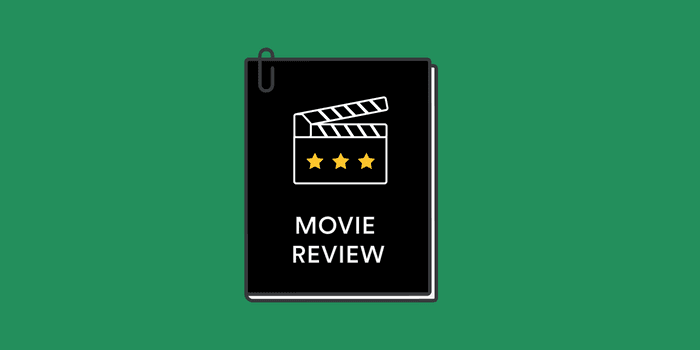
Writing a movie review is a great way to practice critical analysis skills. In this post, we explore what a movie review is, how to start a film review, and steps for writing and revising it.
What is a movie review?
A movie review is a concise evaluation of a film’s content and formal elements (cinematography, sound, lighting, etc.). Also known as a film review, a movie review considers not just what a film means, but how it means. Essentially, when you write a film review, you are conducting a critical analysis or close reading of a movie.
How to write a movie review
To write a successful review about a movie, you need to evaluate a film’s content, as well as its form. In this section, we break down these two components.
A film’s content includes its plot (what it’s about), characters, and setting. You’ll need to determine the main plot points of the film and how the film’s story works overall.
Are there parts that don’t make sense? Are certain characters more important than others? What is the relationship between the movie’s plot and its setting? A discussion of a film’s content provides good context for an analysis of its form.
Form refers to all of the aesthetic and/or formal elements that make a story into a movie. You can break down form into several categories:
- Cinematography : This element comprises all aspects of the movie that derive from the way a camera moves and works. You’ll need to pay attention to elements like camera angles, distances between the camera and the subject, and types of shots (i.e. close-up, aerial, etc.).
- Lighting : Films use lighting in various ways to communicate certain effects. For instance, noir films tend to utilize chiaroscuro lighting (deep contrasts between light and dark) to express a sense of secrecy or foreboding.
- Sound : The way a film uses sound can vary considerably. Most movies have a soundtrack, sometimes with music composed specifically for the film. Some films play around with ambient sounds or use silence at key points to signify important moments. What is the relation of sound to the image in specific scenes or sequences? Do sounds link images? Does it ever become more important than the image?
- Editing : The movies we watch online or in theaters have been heavily edited in order to achieve a particular flow. When you are preparing to write a movie review, pay close attention to elements like the length of shots, transitions between scenes, or any other items that were finalized after filming.
- Costumes, Props, and Sets : Are the costumes and props believable in relation to the film’s content and setting? Are costumes particularly elaborate or understated?
The important thing to remember when you are analyzing the formal elements of a movie is that every image, sound, movement, and object has meaning and has been planned. Your review needs to take into consideration how these elements work together with the film’s storyline to create a whole experience.
Once you’ve considered both the content and form of the movie that you’re reviewing, you can begin to evaluate the film as a whole. Is it a successful movie? Would you recommend it? Why or why not?
Step-by-step review writing tips
1. watch the movie.
The first time that you watch the movie, look for overarching themes or patterns, and establish what the film is primarily about. Take note of the main characters, as well as the setting.
2. Watch the movie again and take notes
Next, watch the movie again and take notes as you are doing so, keeping in mind the formal aspects discussed above. Write down anything that seems significant.
3. Evaluate the film’s form and content
Using the categories described above, and any handouts or guides provided by your instructor, evaluate the film’s formal elements along with its content. Are there elements of the movie that strike you as unfamiliar or perplexing? Are there elements that are repeated to emphasize a point or perception?
4. Write your review
A good movie review will contain:
- an introductory paragraph that tells the reader what movie you’re reviewing
- a paragraph that summarizes the movie
- several body paragraphs that explore significant formal elements and how they relate to the content
- a concluding paragraph that discusses your overall reaction to the film and whether or not you would recommend it to others
5. Create citations
You’ll need cite the film and any secondary sources that you consulted while writing. Use BibGuru’s citation generator to instantly create accurate citations for movies, as well as articles, books, and websites.
You may also want to consult a guide on how to cite a film in MLA or another major citation style .
6. Revise and proofread
Once you’ve written your review, you should set aside some time to revise and proofread it before you turn it in.
Movie review checklist
You can use this checklist to ensure that you’ve considered all of the formal elements, as well as the content, of the film that you’re reviewing:
🔲 Cinematography (camera moves and types of shots)
🔲 Lighting (natural vs. artificial light, contrasts between light and dark)
🔲 Sound (soundtrack, sound vs. silence, loud vs. soft sounds)
🔲 Editing (length of shots, transitions between scenes)
🔲 Costumes, props, and sets (believable vs. staged)
🔲 Content (plot, characters, setting)
Frequently Asked Questions about how to write a review about a movie
A movie review should contain a brief summary of the film, several paragraphs of analysis that focus on form and content, and a concluding paragraph that sums up your reaction.
Before you write anything, you need to watch the film at least once. Take notes as you’re watching and pay attention to formal elements and patterns. Then, write your review. The final step is to revise your work before you turn it in.
The tone for a movie review should be critical, yet objective. The goal of most reviews is to persuade a reader to either see a film or not.
The best film reviews balance plot summary with critical analysis of significant formal elements. A reader should be able to decide if she wants to see the film after reading the review.

Make your life easier with our productivity and writing resources.
For students and teachers.

How to write a film review - The ULTIMATE guide
August 14th, 2021 | by maria
A film review sounds easier to write than it is. When tasked with reviewing an audiovisual piece, you realise there is more to it than hitting your keyboard and start writing. A review should give the reader enough info to judge whether or not they will watch the film.
Sounds easy, right? Well, that’s just the tip of the iceberg. The review needs to be detailed enough to provide the relevant info while not being too revealing. In any case, no one wants a spoiler alert. There is a delicate balance of not giving out too much info or plot details or surprises.
How to write a film review - Top tips
Here are our top tips to help you write an in-depth, interesting and most of all structure film review. Let’s check out the tips below!
Start with an outline
An outline gives an overview of how the review will go. The good thing with an outline is it helps give you a good general view of the whole piece.
By writing the outline, you are organising the thoughts and allowing your review to flow. By being organised, you become more efficient and you're able to deliver a catchy film review.
The outline will also help with the accuracy as you’ll know the information to include and leave out unnecessary info.
Writing the overview
Once you’re done with the outline, it’s time to get down to business. When writing the overview, you need to know what the movie or film is all about.
To this end, you need to watch and understand every aspect of the film. At first, you need to watch the movie or film in one sitting.
Here, you need to grasp the general idea of the film. Write whatever you got from the movie and your general reaction to the film, noting the main focus and lessons you think the film wants to pass across.
Watch the film again, this time being keen with every attribute of the film. The main essence of the second time of watching the film is to get the main elements of the film and the story being told.
In your outline, describe how the story is told, know its point of view, and the drama involved in telling the story. For instance, note the twists and turns (or lack of) used in telling the story.
Write down the story’s conclusion, how the conflict was narrated, and how it was resolved. Discuss how the characters went through their experiences and how they brought life to the story.
The technical aspects
You can re-watch the movie for the third time, noting the technical elements of the film. Alternatively, you can note this during the second re-watching period.
Some of the aspects to keep in mind include locations, camera work, lighting, and the general settings of the film. Pay attention to the editing and critique of the post-production work done, including the special effects and sequencing.
When looking at the technical side of the movie, tell of the continuity and rhythm and the blending of different sequencing. Other aspects to include are the film’s cultural standards and historical context and how they were used to tell the story.
Describe how the overall message was delivered. Was it POV, established authority, or emotional appeal?
Writing the review
So, how is it possible to include all that in one review? And additionally, not give spoilers but yet deliver the general synopsis? Break down your review into several sections, which include;
- Basic story outline
- Special effects and editing
- Other interesting aspects of the film that jump out
When it comes to the overview, break it down into several sections, each representing a paragraph. Use the pointers above in each paragraph and describe in as many details as possible. For instance, when writing about the story outline, give a bit about the start and development of the story.
In the other paragraph, describe the character and their acting skills. Did they deliver the story and give life to the scripts and their roles? Words like "ecstatic" and "boring" could be used to describe the actors. It's also wise to compare how the actors faired in this film as compared to other films.
In the last paragraph. Describe the technical side of the film and how the directors used light, locations, and how they edited the film. Did they deliver and give the story the justice it deserved?
In the end, it's better to use a grading system to tell if the movie or film met your expectations as far as the delivery is concerned. Once done, you can summarise the outline and give a detailed but brief review.
We hope you enjoyed this article and don’t miss out on any of our other blogs ! Sign up to Filmstro and follow us on Twitter , Facebook and subscribe to our Youtube channel.
Check out our royalty-free music today by clicking here.
- Privacy Policy
- Terms and Conditions
- Knowledge Base
- Request music
- Request App Features
- Composer Application
- Educational course licensing
- Student License
- Account Dashboard
- Register YouTube Channel
- Affiliate Program
Filmstro V3
All new app coming soon.
- Browse Music
WE WANT TO SUPPORT YOU
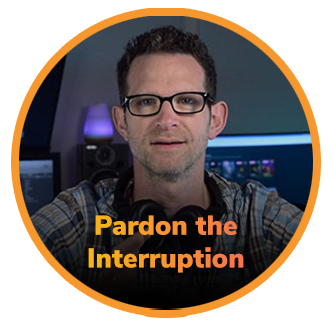
Power your passion projects with a passive income stream! We pay out an industry record of 50% commission on every new subscriber you send our way. And the best bit? You receive cash for every recurring transaction as well!
Refer once. earn forever., join our affiliate program.

Get 5 FREE Tracks - with 100% unrestricted use - when you sign up to our newsletter today!
Download the free Filmstro App
Take full control of your dynamic Soundtrack and keyframe your music.
- SELECT MONTHLY $14.99/m
- SELECT YEARLY $99/yr -45%
Need a Commercial license for Ads, TV, or Films?

Music for anything
Make professional soundtracks in minutes
- Unlimited use of our award winning soundtrack app
- Unlimited downloads of royalty free music
- Exclusive curated content
- 100% royalty free music
- Worldwide cover - for ever
With a free account you get:
- Unlimited FREE music for personal use incl. monetized YouTube
- Exclusive, high-quality & curated content
Welcome Back
Start creating.

Or continue with email
Forgotten your password?
by clicking “Sign up” you agree to our ToS and Privacy Policy
Do not have an account? Sign up now
Get started for free
No credit card required.
Have an account? Login
Reset your password
Back to Login
- 1-800-611-FILM
How to Write a Movie Review: 10 Essential Tips
As long as there have been films, there have been film critics. Starting with the early days of cinema, where reviews appeared in newspapers and magazines as brief, descriptive pieces, as filmmaking evolved as an art form, so did the role of the critic. James Agee, André Bazin, and Pauline Kael shaped the discourse around cinema, and today, famous film critics like the iconic Roger Ebert , The New York Times’s A.O. Scott , and The New York Times’s Manohla Dargis continue to leave an indelible mark on the world of cinema.
With the rise of the internet, film criticism now encompasses a wide range of voices and perspectives from around the globe. Sites like Letterboxd make it possible for anyone to write short-form reviews on film. Even stars like The Bear’s Ayo Edebiri have accounts and share opinions on the latest box-office hits.
How to Write a Movie Review
Today, contemporary YouTube and TikTok critics such as Red Letter Media , deepfocuslens , and DoMo Draper don’t just write film reviews, they shoot videos and skits. Through their creative formats, they offer refreshing and unique perspectives while building communities of diehard film and television enthusiasts. Whether you choose to write reviews for your own blog, other websites, or social media channels, by learning how to write a movie review, any aspiring filmmaker can start to watch films intentionally.
@domodraperr Replying to @xsindeviltriggerx I’ll get right on that, Sir!🫡 #comments #movies #film #satire #fyp #mulan #disney ♬ I’ll Make a Man Out of You (feat. Black Gryph0n) – Cover – Samuel Kim
TikTok film critic “DoMo Draper” provides commentary on new and old films, often calling out racism, social injustice, misogyny, and prejudice.
While there’s no perfect approach to writing a review, there are best practices that every aspiring reviewer should consider.
Here are ten tips on writing a compelling piece.
1. Watch the film at least once.
For new reviewers, it’s impossible to capture everything after one viewing. Watching the film first, then watching to take notes, is an easy way to improve the quality of your final review. This will also make it easy to recall in-the-moment thoughts and reactions.
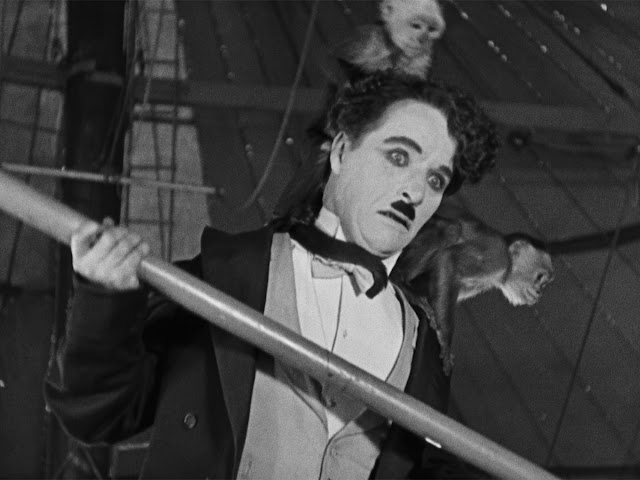
Take a review by Christian Blauvelt of Charlie Chaplin’s silent film The Circus , for example. Since the film does not have sound, properly critiquing the film requires close attention. Viewers have to pay attention to the various nuances in Chaplin’s performance, follow the story, and take in the cinematography. Regarding The Circus , Blauvelt writes, “The film lacks a conventional plot, but is rather a pearl necklace of strung-together episodes. ” The statement isn’t a criticism, but a keen observation likely gleaned from more than one viewing.
So while every film reviewer has their own approach, many choose to watch a film more than once to deliver the best possible review. Image The Criterion Collection.
2. Express your opinions and support your criticism.
Professional reviewers do not shy away from sharing whether they thought a movie was good, bad, or indifferent. In a review for the film Mother!, reviewer Candice Frederick describes the film as “uncomfortable,” and “controversial,” helping viewers understand the tone of the movie. While Frederick seemed to enjoy the film, her honesty about how it would make audiences feel was vital in writing the review.
Be sure to back up these thoughts with specifics–a disappointing performance, beautiful cinematography, difficult material that leaves you thinking, and so on. Professional reviewers should express why and how they came to their criticism.
3. Consider your audience.
Are you writing for a fan site or a news outlet? Who will read your pieces, and what are their interests? Knowing who your readers are and where the review will be published can help you decide what elements of the movie to highlight. For example, take these two very different reviews for the film ‘Synecdoche, New York’.
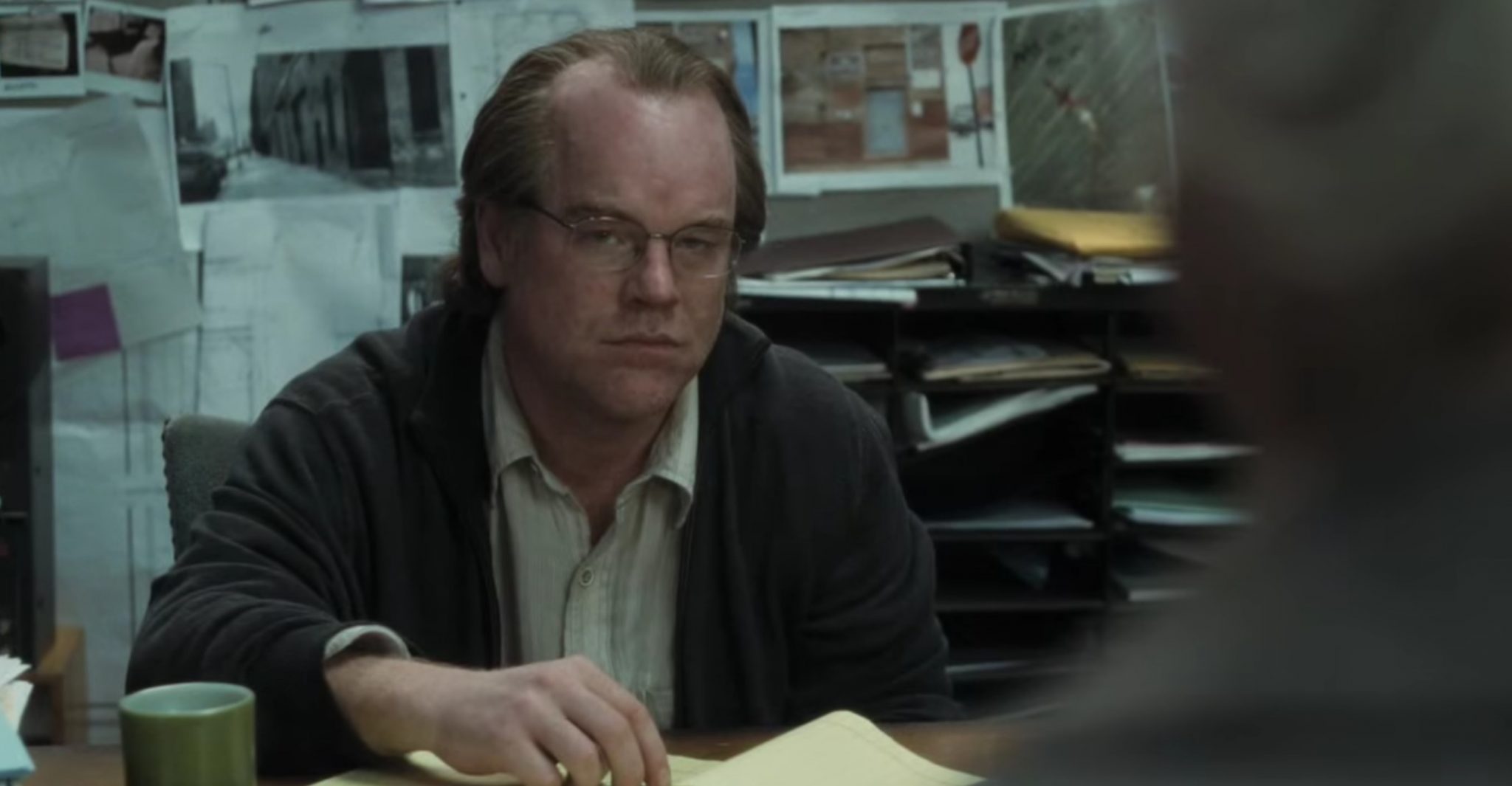
The first review was written by Alonso Duralde for The Today Show , and clocks in at around 500 words. The film focuses on the bullet points: characters, plot, and a concise review. The second review is over 3,000 words and published on the Critical Critics blog . This review goes into massive depth (and yes, includes spoilers) about the film, providing an incredible amount of analysis. The first review is tailored for the casual filmgoer, while the second is for cinephiles. Each review serves a different purpose.
It’s also a good idea to adjust your writing style to fit the target audience. For example, Alonso Duralde is a talented film reviewer and likely wrote the review to fit the tone of The Today Show site. Image via Director’s Library.
4. Talk about the acting.
When reviewing a film, it’s important to take space to discuss the performances. Does the film feature a seasoned actor in a new kind of role or a brilliant performance from a rising star? How was the acting? In a review by Brett Milam for the award-winning film Whiplash , he goes into rich detail about performances by both breakthrough actor Miles Teller and seasoned professional JK Simmons.
Regarding Teller, Milam writes, “This is a performance. This is art,” and about Simmons, “I found him fascinating to just look at.” Those are just small examples of the analysis he provides regarding their acting. As the film mostly focuses on the relationship between their two characters, Miles as the protagonist and JK as the antagonist, the review of the performances lends well to the plot of the film: student and teacher going head to head in an intense and determined showdown.
Feedback about how well the actors handled the script, the dynamics in an ensemble, and so much more can help describe how the actors did in any given film.
5. Call out directors, cinematographers, and special effects.
Reviews that include highlights or missteps of directors, cinematographers, and costume designers can help provide support to your critiques. By providing specific examples of what worked, what surprised you, and what fell short of expectations, reviewers can write a well-thought-out review that goes beyond whether or not you liked it.

In a review for A Wrinkle in Time , Monique Jones artfully crafts a piece that diplomatically cites the missteps of the film. From analyzing the quality of the CGI to the camera techniques to inconsistencies in the rules of the fantasy universe, Jones fairly offers a critique that guides the filmmakers and crew on future endeavors. To write this type of review, it helps to have some knowledge of the filmmaking process so you can properly assess the screenwriting, cinematography, special effects, acting, and more. Image via Disney.
6. No spoilers!
The point of writing a movie review is to get people interested in seeing a movie. That’s why it’s absolutely best practice to not reveal spoilers in a film review. Film reviewer Robert Daniels approaches this creatively. In his review of Annihilation , he provides commentary on what would be considered spoilers. However, he places that part of the review at the bottom of the article under a bold header/image that warns the reader he’s about to spoil the film. For reviewers who want to dissect the entire film, this is a good way to both tease the film for anyone who hasn’t seen it and cater to people who want to know what the ending is.
Remember: the goal of any film review is to discuss the plot without revealing any twists or the ending of the film.
7. Study the professionals.
As with all writing endeavors, the more you read, the better. However, with the modern landscape of film reviewing, which can go beyond writing and extend to content creation for social media platforms, there are a ton of reviewers to take notes from. First, determine what kind of reviewer you want to be, and what kind of medium you plan to deliver your reviews on. If you plan to post to Medium, for example, studying the reviewers already established on the site can be a great starting point.
Then, read film reviews for some of your favorite films. Determine which style of review you like and don’t like. Question why, and use your critical eye to consider why one reviewer has a hundred thousand followers and another only has two. If you’re looking to be featured on a website or a magazine, read the publications where you’d like your writing to appear as a template for your reviews, and don’t forget to read the submission guidelines. A few examples of film review professionals include Rotten Tomatoes , Roger Ebert , and Film Comment.
8. Reread, rewrite, and edit.
While writing film critique is based on opinion, and follows the style of the reviewer, it’s still important to edit work. Writers should check for spelling, grammar, and readability. No matter how good a writer’s opinions are, they will not be taken seriously if the director’s name isn’t spelled correctly. Tools such as Grammarly and Hemingway Editor can be great for correcting and finding areas that need improvement.
9. Find your voice.
The best reviewers have a distinct personality that comes across in their writing. Los Angeles Times film reviewer Carlos Aguilar wrote an impassioned piece about the film Beatriz at Dinner , going into a lot of detail about his experiences working in the film industry and his Mexican heritage. By sharing anecdotes about casual racism he’s experienced and connecting it to the film’s protagonist, and what she goes through, the review feels personal and relatable.
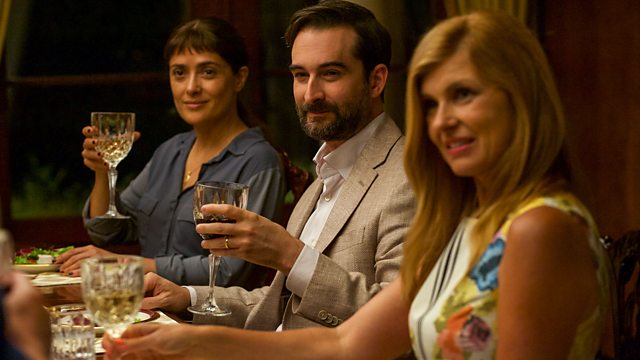
“If at a film festival – to which I’ve gotten access to because I’m a published writer – in a progressive city like Los Angeles, I must keep my guard up when people question my right to be there, then how are the voiceless supposed to feel safe, respected, or hopeful?” Aguilar writes.
For new reviewers, developing this type of unique voice does not happen overnight, so take every opportunity to write as an opportunity to develop your style. Image via BBC.
10. Know your taste.
As a film reviewer, it can be helpful to identify your taste in film. By knowing specific preferences, strengths, and biases, reviewers can offer nuanced critiques that resonate with audiences and provide valuable guidance on which films they might enjoy. Additionally, it helps to maintain credibility and integrity as a reviewer by ensuring that assessments are authentic and reflective of personal cinematic sensibilities.
Try to explore various genres, directors, and themes to understand what resonates emotionally, intellectually, and aesthetically. Pay attention to the types of stories that engage you, which can help define your preferences.
Learn More About Filmmaking at NYFA
Film students with writing experience actually make great reviewers, as many of them are required to study a range of topics relating to film that can include cinematography, screenwriting, producing, and much more. Ready to build even more skills in filmmaking? Request more information about New York Film Academy’s filmmaking programs and workshops today!
- Writing Style
- How to write …
- Analysis of Speech
- Storytelling
- Career Development
How to Write a Film Review: Preparation, Steps, Examples
- by Anastasiya Yakubovska
- 06.10.2022 25.09.2023
- How to write ...
How to write a film review (true, professional, and comprehensive) and not be limited to the phrase “What a great movie!”? In this article, you will find answers to the next questions:
- How long is a movie review?
- How many paragraphs does a movie review have?
- Features of the Film Review
- What is the main purpose of a film review?
- Functions of the Movie Review
- How to Write a Film Review: Preparation for Writing
- 10 Questions You Need to Answer Before You Start Writing a Movie Review
- How to Write and Structure a Film Review: Step by Step
What Is a Film Review?
A film review is a critical judgment or discussion that informs about the release of a new film and contains its analysis, assessment, summary, as well as personal impressions and experiences after watching.

How long is a movie review?
On average, the length of a film review is about 1000 words.
How many paragraphs does a movie review have?
It is recommended that the film review should consist of 5-7 paragraphs.
Read also article “How to Write a Book Review: Step by Step and Examples”.

Features of the Film Review
A film review is a persuasive piece of writing, it has some features as:
- A less formal style of writing.
- You need to write objectively about the film.
- But, on the other hand, movie reviews contain personal thoughts and feelings.
- The film review’s audience is wider and more diverse.
Movie reviews can be written by two groups of reviewers: professional critics and ordinary consumers. Therefore, the text of the review will differ. In the first case, when the reviewer is a professional critic, he will describe the movie instead of evaluating it. While consumer critics mostly write from a personal perspective.
What is the main purpose of a film review?
The main purpose of a film review is to inform readers about the film (what can expect from it) and to help them determine if they want to watch the movie.
Functions of the Movie Review
The film review performs several functions at once: it informs, analyzes, persuades, and entertains. If you can include all of these points in your review, then you will have an excellent result in the end.
How to Write a Film Review: Preparation for Writing
Writing a review is, of course, a creative process, but you should not forget about the analytical approach to creating a convincing and high-quality text. You must take the work responsibly, which we will do now.
To write a professional film review, you first need to complete the following preparation steps:
- Of course, the first step is to find a film, if it has not been previously chosen by the manager/client/boss. There will be more chances to write a good review if the film was liked by both – film critics and you personally.
- Watch the movie at least 2-3 times. After the first viewing, you will get a general impression of the picture, and try to fully immerse yourself in the atmosphere of the film. Pay attention to the details the next time you watch it: the sound, the actor’s play, the editing, the plot.
- If you have difficulty understanding the events covered in the film (for example, historical), be sure to find additional information and research the topic.
- If after two viewings you still do not have a final assessment of the film in the form of a brief thesis, watch the film again. You can look at other works of the director who worked on this film, this will help you determine his characteristic style. Also, as an option, you can look at the game of actors in other films (for comparison).
- When watching a movie, take notes: key scenes, interesting plot twists, inconsistencies, details, and quotes. Then, based on them, you can build a review text, and a good quote can become an excellent epigraph.
- Find information about the filming: location, duration, season, details about the filming process, difficulties the production team faced, casting, etc. Such information will make the review more attractive to readers.
- If the film is nominated for awards and prizes, please include this information in your film review. For a potential viewer, such an assessment of the film will be a weighty argument in the direction of -> compulsory viewing.
10 Questions You Need to Answer Before You Start Writing a Movie Review
- Does the film split into multiple parts? A sequel, prequel, or one of the movie series?
- What is the film genre (action, comedy, historical, drama, fantasy, Western, political, thriller, gangster, horror, tragicomedy, romance, sports, mystery, science fiction)? Is the movie based on real or fictional events?
- Did the screenplay writer create an exciting plot?
- Is the rhythm of the film slow and quiet, heavy and static, or chaotic and frantic?
- What is the film’s rating according to the MPAA? ( G – General Audiences. All ages admitted. PG – Parental Guidance Suggested. PG-13 – Parents Strongly Cautioned. R – Restricted. Under 17 requires an accompanying parent or adult guardian. NC-17 – Adults Only.)
- Are there any films with a similar/same theme? Sometimes it is worth mentioning some of them in a review, as a comparison.
- How can you characterize the work of a cinematographer? How accurately are the most expressive compositional, lighting solutions, as well as camera angles, selected and embodied?
- Is the film entertaining or covers a serious themes?
- Was the casting successful? Did all the actors cope with their roles?
- Is the atmosphere of the film tense, mysterious, sinister, relaxed, or romantic?
The answers to all of the above questions will help you understand how to write a film review, and above all, create a draft version of your future review. But, of course, this is not enough for the final result.
How to Write and Structure a Film Review: Step by Step
Writing a film review is a long and complicated process. Therefore, it is better to break it down into stages and move step by step. This will help you not to get lost and not get confused in the details.
- The catchy introduction.
The introductory part of the review should contain important information about the film: title, director, release date, and genre.
You can mention nominations and awards, as well as indicate the box office (if the numbers are impressive) and the cast.
In addition to “technical” aspects and a simple presentation of the plot, it is necessary to express your impression of the film in the form of a thesis, for example, to tell:
- about the connection of the film’s central idea with current events and social problems;
- about the similarity of the film’s plot with a personal life situation, personal experience, and feelings;
- about the connection of technical elements (lighting, sound, editing) with the theme of the film.
2. Pass the verdict.
Do not torment the reader and express your opinion about the film in the first paragraphs of the review.
You should not leave all the most interesting “for later”. If you decide to give a final assessment of the film at the end of the review, what are the chances that the reader will read to this end?
3. Write a summary of the plot.
Choose 4-5 main events.
Avoid the film’s ending and spoilers. Keep the intrigue. If you want to spoil and share an unusual story development, warn the reader about this.
4. Bring the feelings.
In addition to presenting the plot of the film, you should add emotions to the text of the review and show what you felt while watching it.
5. Define the main purpose of the movie.
Perhaps the film’s purpose is hidden in its plot. Or maybe the film does not pretend to solve global problems at all. Perhaps the film is entertaining, and this is its advantage – it is relaxed and simple.
Sometimes the main idea of a serious and deep film can be found in an interview with a film crew, a screenwriter, or a director.
6. Add some details of the filmmaking process.
It is important to know the measure and not to overdo it with the terminology. Here’s what you can write about:
- Cinematography: visual mood, lighting elements, shot sizes and widths, camera angles, etc.
- Sound. The main goal is to create the necessary atmosphere in the film. Sound in movies includes music, dialogue, sound effects, ambient noise, background noise, and soundtracks.
- Editing is the creation of a finished motion picture from many shot scenes. A film editor must creatively work with the layers of images, story, dialogue, music, pacing, as well as the actors’ performances to effectively “re-imagine” and even rewrite the film to craft a cohesive whole.
- Mise-en-scène (from French – placement on the stage) is the mutual arrangement of the actors and their environment on the set, natural or pavilion. Mise-en-scene includes landscapes, visual effects, the psychological state of the characters, etc.
7. The deep meaning.
You may be able to spot specific symbolic items, repetitive moments, or key phrases that give depth to the film.
8. Give examples.
It is not enough to say “ an excellent game of actors ”. Explain what exactly caught your attention (appearance, facial expressions, costumes, or movements of the actor).
9. A convincing conclusion.
Write about the moments in the film that made the biggest impression on you. Share a recommendation. To whom and why do you advise to watch this movie?
10. Reread the review text several times .
Edit, and correct mistakes that can spoil the impression even from a professionally written film review.
Examples of Film Reviews
To consolidate the received information, let’s move from theory to practice. Below are two examples of film reviews.

Apocalypse Now
Review by Roger Ebert
Francis Ford Coppola’s film “Apocalypse Now” was inspired by Heart of Darkness, a novel by Joseph Conrad about a European named Kurtz who penetrated to the farthest reaches of the Congo and established himself like a god. A boat sets out to find him, and on the journey the narrator gradually loses confidence in orderly civilization; he is oppressed by the great weight of the jungle all around him, a pitiless Darwinian testing ground in which each living thing tries every day not to be eaten.
What is found at the end of the journey is not Kurtz so much as what Kurtz found: that all of our days and ways are a fragile structure perched uneasily atop the hungry jaws of nature that will thoughtlessly devour us. A happy life is a daily reprieve from this knowledge.
A week ago I was in Calcutta, where I saw mile upon square mile of squatter camps in which hundreds of thousands live generation after generation in leaky huts of plastic, cardboard and scrap metal, in poverty so absolute it is impossible to see any hope of escape. I do not mean to equate the misery of those hopeless people with a movie; that would be indecent. But I was deeply shaken by what I saw, and realized how precious and precarious is a happy life. And in such a mood I watched “Apocalypse Now” and came to the scene where Col. Kurtz (Marlon Brando) tells Capt. Willard (Martin Sheen) about “the horror.”
Kurtz is a decorated hero, one of the best soldiers in the Army, who has created a jungle sanctuary upriver inside enemy territory, and rules Montagnard tribesmen as his private army. He tells Willard about a day when his Special Forces men inoculated the children of a village against polio: “This old man came running after us and he was crying, he couldn’t see. We went back there, and they had come and hacked off every inoculated arm. There they were in a pile, a pile of little arms. . . .”
What Kurtz learned is that the Viet Cong were willing to go to greater lengths to win: “Then I realized they were stronger than we. They have the strength, the strength to do that. If I had 10 divisions of those men, then our troubles here would be over very quickly. You have to have men who are moral and at the same time who are able to utilize their primordial instincts to kill without feeling, without passion, without judgment.” This is the “horror” that Kurtz has found, and it threatens to envelop Willard, too.
The whole movie is a journey toward Willard’s understanding of how Kurtz, one of the Army’s best soldiers, penetrated the reality of war to such a depth that he could not look any longer without madness and despair.
The film has one of the most haunting endings in cinema, a poetic evocation of what Kurtz has discovered, and what we hope not to discover for ourselves. The river journey creates enormous anticipation about Kurtz, and Brando fulfills it. When the film was released in 1979, his casting was criticized and his enormous paycheck of $1 million was much discussed, but it’s clear he was the correct choice, not only because of his stature as an icon, but because of his voice, which enters the film from darkness or half-light, repeating the words of T.S. Eliot’s despairing “The Hollow Men.” That voice sets the final tone of the film.
Film review: example
Diana biopic Spencer wobbles between the bold and the bad
By Nicholas Barber
You may feel that you’ve had enough of Princess Diana’s story on the big and small screens, what with Naomi Watts taking the role in Oliver Hirschbiegel’s awful Diana in 2013, and then Emma Corrin playing her in the most recent season of The Crown, with the mantel set to be passed in Elizabeth Debicki in the next run. But, to give it its due, Pablo Larraín’s Spencer marks the only time the People’s Princess has been shown delivering a lecture on Anne Boleyn to an old coat that she has just stolen off a scarecrow, and then having a chat with the ghost of Boleyn herself shortly afterwards. The Chilean director doesn’t go in for conventional biopics, as anyone who has seen Jackie (starring Natalie Portman) or Neruda will know. And here again he has gone for a surreal portrait of his iconic subject. The snag is that his experimental art house spirit keeps bumping up against the naffness and the familiarity of British films set in stately homes, so his psychodrama ends up being both ground-breaking and rib-tickling.
It’s set over three days in 1991, from Christmas Eve to Boxing Day, at Sandringham House in Norfolk. The rest of the Royal Family has arrived for their holiday in a fleet of chauffeur-driven cars, but Diana (Kristen Stewart) rocks up on her own in a Porsche convertible, having taken a detour to visit the aforementioned scarecrow: her dilapidated childhood home, from the days when she was Lady Diana Spencer, is a field or two away from Sandringham. Her late arrival concerns the sympathetic head chef (Sean Harris) and bothers the Scottish army veteran (Timothy Spall) who has the job of ensuring that everything goes the way the Queen wants it to. Her Majesty’s insufferable Christmas traditions include weighing all the guests when they arrive and when they leave to ensure that they’ve been sufficiently gluttonous. But Diana is in no mood for festive japes. Her Christmas present from Charles (Jack Farthing) – a necklace with pearls the size of golf balls – is identical to the one he has given his mistress. And the whisper in the servants’ quarters is that the Princess is “cracking up”. The filmmakers apparently agree.
Steering away from the same territory as The Crown, Larraín and Knight don’t fill the film with awkward meals and heated arguments (although there are one of each of those). Prince Charles does some grumbling, but the Queen has hardly any lines and Prince Philip has none: they are closer to menacing waxworks than people. For most of the time, Diana is either talking to her young sons, her trusted personal dresser (Sally Hawkins) or to herself. It’s interesting, this lack of dramatic conflict and discernible plot, but it can leave the film seeming as listless and purposeless as Larraín’s Diana herself. Her favourite occupation is to wander around the estate until she finds something that has an ominous symbolic connection to her, and then make an unconvincing speech about it. Ah, pheasants! So beautiful, yet bred to be killed!
Stewart is such inspired casting that she makes all this eccentric nonsense watchable. She’s been practising Diana’s signature moves for years – dipped head, hunched shoulders – and she certainly knows what it’s like to put up with intrusive tabloid photographers. She also looks suitably fabulous in the many outfits that Diana is required to wear over the long weekend. And unlike Watts’s performance in 2013, hers doesn’t seem distractingly like an impersonation. Mind you, she delivers all her lines in little bursts of hissing whispers, so if you don’t see it with English subtitles, as its first audiences did at the Venice Film Festival, you might not understand more than half of what she says.
The effect is a bit odd, but there are lots of odd things in the film, not least the tone and the pacing, which lurch around like someone who’s had too much after-dinner port. Between Jonny Greenwood’s squalling jazz soundtrack, the hallucinations, and the blush-making sexual confessions, Spencer is a folly that wobbles between the bold and the bad, the disturbingly gothic and the just plain silly. In some scenes, it’s heart-rending in its depiction of Diana’s self-harm and bulimia. In others, it’s almost as risible as the Diana biopic from 2013, and that’s saying something. I didn’t know any more about Diana afterwards than I did beforehand, but I can’t say I didn’t enjoy it. This is a film that echoes The Shining at the start and 2001: A Space Odyssey at the end. The Crown Christmas Special it ain’t.
Sources of information:
- “The Film Analysis Handbook” by Thomas Caldwell.
- https://payforwriting.com/writing/creating-review/how-to-write-movie-review
- www.mtsu.edu
- www.sciencedirect.com/science
- Image: freepik.com
- Poster from the film Apocalypse Now
How useful was this post?
Click on a star to rate it!
Average rating 5 / 5. Vote count: 5
No votes so far! Be the first to rate this post.
Breakout English

How to write a film review
Writing a review is an option in many different English language exams, and films are such an obvious choice for reviews, so knowing how to write a film review is pretty important. It’s a great topic for the classroom too. Everyone watches films and there is a lot of opportunity to teach vocabulary, either film-related vocabulary or film review adjectives. I like to start off a class about films with some chat, or my personal favourite, the Movie Music Quiz , which also now has an excellent Movie Picture Quiz version too.

The structure of a film review
Like any writing task, it’s essential to know the structure of a film review before you start writing. A basic film review template shows you how to write a film review using a simple structure. Film reviews for First (FCE) and Advanced (CAE) Cambridge exams, as well as Trinity ISE exams, should all use a 4 paragraph structure. Another thing to remember is that your review should always have a title, and that title should include the name of the film.
- Introduction – Essential details and mini-summary
- Summary – A description of the film and some important details
- Analysis – An evaluation of different elements
- Conclusion – Your opinion and a recommendation
Introduction
In the introduction of a film review, it is crucial to mention the film title and the names of the director and the main actors. A brief summary of the film’s plot and background information can also be included, but it should not give away too much detail. The introduction should engage the reader and entice them to continue reading the review. Additionally, it is important to mention the genre and target audience of the film, which will give the reader an idea of what to expect.
In the summary section, the film review should give a comprehensive but concise description of the film, focusing on the plot, characters, and any significant events. The summary should be written in a way that does not give away the ending or spoil the film for the reader. It is important to maintain objectivity and not include personal opinions in this section. This section should provide enough detail for the reader to have a clear understanding of the film without giving too much away.
The analysis section is where the reviewer can showcase their critical skills and provide an in-depth evaluation of the film. The review should examine various elements of the film such as the script, direction, cinematography, acting, and special effects. You could also make a comparison to similar films in the same genre. The analysis should be written in an objective style with the opinion only showing through the language used.
In the conclusion, the reviewer should give their personal opinion of the film, summarising their thoughts on its strengths and weaknesses. They should also consider the target audience and whether they believe the film will appeal to them. Finally, the reviewer should provide a clear recommendation. The conclusion should be concise, leaving the reader with a clear understanding of the reviewer’s overall opinion of the film.
Using adjectives in reviews
Reviews are a great way to show off your language with impressive adjectives. If you read a film review in a newspaper or magazine, you’ll notice that the reviewer rarely, if ever, gives an explicit direct opinion. However, their opinion of the film is always crystal clear. This is through the use of adjectives.
Many adjectives have a clear connotation. They are either perceived as positive or negative. Compare these two examples. Which one is a positive description and which is negative?
- It’s a first-rate experience with an imaginative plot and a star-studded cast.
- The second-rate writing combined with weak performances is typical of this director’s work.
When using adjectives in a film review, it is important to choose words that accurately convey the reviewer’s opinion. Adjectives with strong connotations, either positive or negative, can be very effective in expressing the reviewer’s thoughts about the film. However, it is also important to use a variety of adjectives to avoid repetition and keep the review interesting. The use of adjectives can also help to paint a picture of the film, allowing the reader to get a sense of its atmosphere and tone.
The materials
Many exams, such as the Cambridge First (FCE) and Advanced (CAE) exams, as well as Trinity ISE exams, require students to write a film review as part of their writing task. These materials will provide students with a solid understanding of the structure of a film review and help them to develop their writing skills. This will give them the confidence they need to write a review that meets the requirements of the exam and impresses the examiner.
The materials will help you learn how to write an introduction, summary, analysis, and conclusion of a film review. You will also see a range of useful adjectives that you can use to express your opinions in their reviews. Finally, you will get an opportunity to practise writing film reviews, which will help you to develop your skills. Then you can check your answers with the samples provided in the answer key. Whether you’re preparing for an exam or just looking to improve your writing skills, these materials will provide you with everything you need to write a great film review.
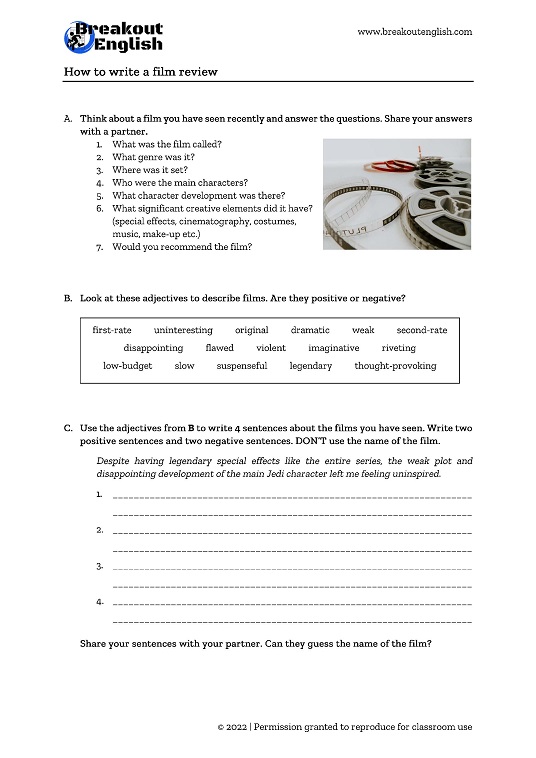
1 thought on “How to write a film review”
Interesting and useful material to be used in class. thanks!
Comments are closed.

- Share full article
Advertisement
Supported by
Movie Review | 'Freedom Writers'
To Ms. With Love: A Teacher’s Heart Fords a Social Divide

By Manohla Dargis
- Jan. 5, 2007
As a cinematic subspecies, films about teachers working with throwaway kids tend to follow a predictable arc involving conflict and resolution, smooth beats and bitter tears. Sometimes, as with “Dangerous Minds,” the 1995 film in which Michelle Pfeiffer uses her cheekbones to disarm high school toughs, the results are risible. Sometimes, as with the egregiously offensive “187” (1997), wherein Samuel L. Jackson makes like Charles Bronson with some bad students, it’s an argument for universal home schooling.
“Freedom Writers,” a true story about a white teacher trying to make a difference in a room crammed with black, Latino and Asian high school freshmen, has the makings of another groaner. One worrisome sign is Hilary Swank, the two-time Academy Award winner with the avid smile who recently vamped across screens as a femme fatale in Brian De Palma’s period thriller “The Black Dahlia.” Ms. Swank is an appealing actress of, at least to date, fairly restricted range. In her finest roles — a transgender man in “Boys Don’t Cry,” a boxer in “Million Dollar Baby” — she plays women whose hard-angled limbs and squared jaws never fully obscure a desperate, at times almost embarrassingly naked neediness.
In “Freedom Writers” Ms. Swank uses that neediness to fine effect in a film with a strong emotional tug and smartly laid foundation. She plays Erin Gruwell, who in 1994 was a 23-year-old student teacher assigned to teach freshman English at Wilson High School in Long Beach, Calif.
Twenty-two miles from downtown Los Angeles, this ethnically diverse port city, birthplace of both Bo Derek and Snoop Dogg, is south of Compton (home of N.W.A.), right at the edge of Orange County (home of “The O.C.”). In 1992 the Rodney King riots that rocked Los Angeles spilled into Long Beach; recently the city made news for an alleged hate crime involving black teenagers charged with severely beating three white women.
By the time Erin steps into her classroom, a scant two years after the riots, the climate inside is at once frosty and scorching. Turned out in a cherry-red suit and black pumps, her strand of pearls gleaming as bright as her teeth, Erin cuts an unavoidably awkward, borderline goofy figure.
The students are understandably skeptical, excruciatingly contemptuous. From where they sit, slumped and hunched, some with their backs literally turned away from the front of the room, Erin looks like the stranger she is. She’s an interloper, a do-gooder, a visitor from another planet called Newport Beach, and the class sees through her as if she were glass because the writer and director Richard LaGravenese makes sure that we do too.
Funny how point of view works. If so many films about so-called troubled teenagers come off as little more than exploitation, it’s often because the filmmakers are not really interested in them, just their dysfunction. “Freedom Writers,” by contrast, isn’t only about an amazingly dedicated young teacher who took on two extra jobs to buy supplies for her students (to supplement, as Mr. LaGravenese carefully points out, a $27,000 salary); it’s also, emphatically, about some extraordinary young people. In this respect Mr. LaGravenese, whose diverse writing credits include “The Ref” and “The Bridges of Madison County,” appears to have taken his egalitarian cue from the real Erin Gruwell, who shares author credit with her students in their 1999 book, “The Freedom Writers Diary,” a collection of their journal entries.
Mr. LaGravenese keeps faith with the multiple perspectives in the book, which includes Ms. Gruwell’s voice and those of her students, whose first-person narratives pay witness to the effects of brutalizing violence, dangerous tribal allegiances and institutional neglect. The film pops in on Erin and her increasingly troubled relationship with her husband, Scott (Patrick Dempsey), and there’s a really lovely scene between the two that finds them talking ruefully over a bottle of wine about the divide between fantasy and reality in marriage, a divide one partner tries to bridge and the other walks away from. But while we keep time with Erin, we also listen to the teenagers, several of whom tell their stories in voice-over.
Among the most important of those stories is that of Eva (the newcomer April Lee Hernandez), whose voice is among the first we hear in the film. Through quick flashbacks and snapshot scenes of the present, Eva’s young life unfolds with crushing predictability. From her front steps, this 9-year-old watches as her cousin is gunned down in a drive-by shooting. Later her father is arrested; she’s initiated into a gang. One day, while walking with a friend under the glorious California sun, a couple of guys pull up in a car and start firing in their direction. Eva dodges bullets and embraces violence because she knows nothing else; she hates everyone, including her white teacher, because no one has ever given her a reason not to.
In time Eva stops hating Erin, though the bullets keep coming. It’s a hard journey for both women, one that includes other students, most of whom are played by actors who look too old for their roles and are nonetheless very affecting. None of these actors are outstanding, but two are memorable: the singer Mario, who plays an angry drug dealer, Andre, and another newcomer, Jason Finn, whose big, soft, moon face swells with fury and vulnerability as a homeless teenager named Marcus.
Mr. LaGravenese isn’t a natural-born filmmaker, but he’s a smart screenwriter whose commitment to characters like Marcus makes up for the rough patches in his directing. Like Ms. Swank, who shares the screen comfortably with her younger co-stars, he gives credit where credit is due.
“Freedom Writers” is rated PG-13 (Parents strongly cautioned). There is some gun violence and adult language.
The headline for a film review in Weekend on Friday about “Freedom Writers” misidentified the California city in which the movie is set. It is Long Beach, not Los Angeles.
The listing of credits omitted a producer. Danny DeVito was a producer, along with Stacey Sher and Michael Shamberg.
How we handle corrections
By providing your information, you agree to our Terms of Use and our Privacy Policy . We use vendors that may also process your information to help provide our services. This site is protected by reCAPTCHA Enterprise and the Google Privacy Policy and Terms of Service apply.
The Best Movie Reviews We’ve Ever Written — IndieWire Critics Survey
David ehrlich.
- Share on Facebook
- Share to Flipboard
- Share on LinkedIn
- Show more sharing options
- Submit to Reddit
- Post to Tumblr
- Print This Page
- Share on WhatsApp
Every week, IndieWire asks a select handful of film critics two questions and publishes the results on Monday. (The answer to the second, “What is the best film in theaters right now?”, can be found at the end of this post.)
While this survey typically asks smart critics to direct readers toward good movies, we hope that the reverse is also true, and that these posts help movies (good or bad) direct readers towards smart critics.
In that spirit, we asked our panel of critics to reflect on their favorite piece of film criticism that they’ve ever written (and we encouraged them to put aside any sort of modesty when doing so).
Their responses provide rich and far-reaching insight into contemporary film criticism, and what those who practice it are hoping to achieve with their work.
Siddhant Adlakha (@SidizenKane), Freelance for The Village Voice and /Film

Let’s cut right to the chase. Christopher Nolan is probably my favourite working director, and going five thousand words deep on his career after “Dunkirk” was an itch I’d been waiting to scratch for nearly a decade. “The Dark Knight” was my dorm-room poster movie — I’m part of the generation that explored films through the IMDb Top 250 growing up — though as my cinematic horizons expanded and my understanding of storytelling grew, I didn’t leave Nolan’s work behind as I did the likes of “Scarface” and “The Boondock Saints.” What’s more, each new film by Nolan hits me like a tonne of bricks. I’m waiting, almost eagerly, for him to disappoint me. It hasn’t happened yet, and I needed to finally sit down and figure out why.
In “Convergence At ‘Dunkirk,’” by far the longest piece I’ve ever written, I’d like to think I unpacked a decade worth of my awe and admiration, for a filmmaker who uses the studio canvas to explore human beings through our relationship to time. Tarkovsky referred to cinema as “sculpting in time.” Time disorients. Time connects us. Time travels, at different speeds, depending on one’s relationship to it, whether in dreams or in war or in outer space, and time can be captured, explored and dissected on screen.
What’s more, Nolan’s films manipulate truth as much as time, as another force relative to human perception, determining our trajectories and interpersonal dynamics in fundamental ways. All this is something I think I knew, instinctively, as a teenage viewer, but putting words to these explorations, each from a different time yet connected intrinsically, is the written criticism that I most stand by. It felt like something that I was meant to write, as I interrogated my own evolving emotional responses to art as time went on.
Carlos Aguilar (@Carlos_Film), Freelance for Remezcla

At the 2017 Sundance premiere of Miguel Arteta’s “Beatriz at Dinner,” starring Salma Hayek, I found myself in shock at the reactions I heard from the mostly-white audience at the Eccles Theatre. I was watching a different movie, one that spoke to me as an immigrant, a Latino, and someone who’s felt out of place in spaces dominated by people who’ve never been asked, “Where are you really from?” That night I went back to the condo and wrote a mountain of thoughts and personal anecdotes that mirrored what I saw on screen.
This was a much different piece from what I had usually written up to that point: coverage on the Best Foreign Language Oscar race, pieces on animation, interviews with internationally acclaimed directors, and reviews out of festivals. Those are my intellectual passions, this; however, was an examination on the identity that I had to built as an outsider to navigate a society were people like me rarely get the jobs I want.
My editor at Remezcla, Vanessa Erazo, was aware of the piece from the onset and was immediately supportive, but it would take months for me to mull it over and rework it through multiple drafts until it was ready for publication in time for the film’s theatrical release. In the text, I compared my own encounters with casual racism and ignorance with those Hayek’s character faces throughout the fateful gathering at the center of the film. The reception surpassed all my expectations. The article was shared thousands of times, it was praised, it was criticized, and it truly confronted me with the power that my writing could have.
A few months later in September, when Trump rescinded DACA, I wrote a social media post on my experience as an undocumented person working in the film industry, and how difficult it is to share that struggle in a world were most people don’t understand what it means to live a life in the shadows. The post was picked up by The Wrap and republished in the form of an op-ed, which I hope put a new face on the issue for those who didn’t directly knew anyone affected by it before. Once again that piece on “Beatriz at Dinner” regained meaning as I found myself filled with uncertainty.
Ken Bakely (@kbake_99), Freelance for Film Pulse

Like many writers, I tend to subconsciously disown anything I’ve written more than a few months ago, so I read this question, in practice, as what’s my favorite thing I’ve written recently. On that front, I’d say that the review of “Phantom Thread” that I wrote over at my blog comes the closest to what I most desire to do as a critic. I try to think about a movie from every front: how the experience is the result of each aspect, in unique quantities and qualities, working together. It’s not just that the acting is compelling or the score is enveloping, it’s that each aspect is so tightly wound that it’s almost indistinguishable from within itself. A movie is not an algebra problem. You can’t just plug in a single value and have everything fall into place.
“Phantom Thread” is Paul Thomas Anderson’s dreamy cinematography. It is Jonny Greenwood’s impeccably seductive, baroque music. It is Vicky Krieps’s ability to perfectly shatter our preconceptions at every single turn as we realize that Alma is the movie’s actual main character. We often talk about how good films would be worse-off if some part of it were in any way different. In the case of “Phantom Thread,” you flat-out can’t imagine how it would even exist if these things were changed. When so many hot take thinkpieces try to explain away every ending or take a hammer to delicate illusions, it was a pleasure to try and understand how a movie like this one operates on all fronts to maintain an ongoing sense of mystique.
Christian Blauvelt (@Ctblauvelt), BBC Culture
I don’t know if it’s my best work, but a landmark in my life as a critic was surely a review of Chaplin’s “The Circus,” in time for the release of its restoration in 2010. I cherish this piece , written for Slant Magazine, for a number of reasons. For one, I felt deeply honored to shed more light on probably the least known and least respected of Chaplin’s major features, because it’s a film that demonstrates such technical virtuosity it dispels once and for all any notion that his work is uncinematic. (Yes, but what about the rest of his filmography you ask? My response is that any quibbles about the immobility of Chaplin’s camera suggest an ardent belief that the best directing equals the most directing.) For another, I was happy this review appeared in Slant Magazine, a publication that helped me cut my critical teeth and has done the same for a number of other critics who’ve gone on to write or edit elsewhere. That Slant is now struggling to endure in this financially ferocious landscape for criticism is a shame – the reviews I wrote for them around 2009-10 helped me refine my voice even that much more than my concurrent experience at Entertainment Weekly, where I had my day job. And finally, this particular review will always mean a lot to me because it’s the first one I wrote that I saw posted in its entirety on the bulletin board at Film Forum. For me, there was no surer sign that “I’d made it”.
Richard Brody (@tnyfrontrow), The New Yorker
No way would I dare to recommend any pieces of my own, but I don’t mind mentioning a part of my work that I do with special enthusiasm. Criticism, I think, is more than the three A’s (advocacy, analysis, assessment); it’s prophetic, seeing the future of the art from the movies that are on hand. Yet many of the most forward-looking, possibility-expanding new films are in danger of passing unnoticed (or even being largely dismissed) due to their departure from familiar modes or norms, and it’s one of my gravest (though also most joyful) responsibilities to pay attention to movies that may be generally overlooked despite (or because of) their exceptional qualities. (For that matter, I live in fear of missing a movie that needs such attention.)
But another aspect of that same enthusiasm is the discovery of the unrealized future of the past—of great movies made and seen (or hardly seen) in recent decades that weren’t properly discussed and justly acclaimed in their time.”. Since one of the critical weapons used against the best of the new is an ossified and nostalgic classicism, the reëvaluation of what’s canonical, the acknowledgment of unheralded masterworks—and of filmmakers whose careers have been cavalierly truncated by industry indifference—is indispensable to and inseparable from the thrilling recognition of the authentically new.
Deany Hendrick Cheng (@DeandrickLamar), Freelance for Barber’s Chair Digital

It’s a piece on two of my favorite films of 2017, “Lady Bird” and “Call Me By Your Name”, and about how their very different modes of storytelling speak to the different sorts of stories we tell ourselves. Objectively, I don’t know if this is my best work in terms of pure style and craft, but I do think it’s the most emblematic in terms of what I value in cinema. I think every film is, in some way, a treatise on how certain memories are remembered, and I think cinema matters partly because the best examples of it are prisms through which the human experience is refracted.
Above everything else, every movie has to begin with a good story, and the greatest stories are the ones that mirror not just life, but the ways in which life is distorted and restructured through the process of remembering. Every aspect of a film, from its screenplay on down, must add something to the film’s portrayal of remembering, and “Lady Bird” and “Call Me By Your Name” accomplish this organic unity of theme with such charm yet in such distinct ways, that they were the perfect counterpoints to each other, as well as the perfect stand-ins for cinema as a whole, for me.
Liam Conlon (@Flowtaro), Ms En Scene
My favorite piece of my own work is definitely “The Shape of Water’s” Strickland as the “Ur-American.” I’m proud of it because it required me to really take stock of all the things that Americans are taught from birth to take as given. That meant looking at our history of colonialism, imperialism, racism, anticommunism and really diving into how all Americans, whether they’re liberal or conservative, can internalize these things unless they take the time to self-examine. Just as “Pan’s Labyrinth’s” despotic Captain Vidal was a masterful representation of Francisco Franco’s fascism, Richard Strickland represents a distinctly American kind of fascism. Writers Guillermo del Toro and Vanessa Taylor took great care in Strickland’s creation, and my piece was my own way of self-examining to make sure I never become or abide by a person like Strickland ever again.
Robert Daniels (@812filmreviews), Freelance

This is tricky, but “Annihilation” is definitely my favorite piece of film criticism that I’ve written. My writing style is a combination of criticism and gifs, and sometimes the words are better than the gifs, and the gifs are better than the words. With “Annihilation,” I thought the balance was perfect . My favorite portion: “Lena is just an idea, part of an equation that’s been erased from a chalkboard and rewritten with a different solution. The shimmer is part of her, even down to the DNA” is up there as one of my best. It was also a struggle to write because that film had more wild theories than the Aliens in Roswell. Also, the amount of research I had to do, combining Plato’s Ideal Forms, Darwin, the Bible, and Nietzsche, was absurd. However, it did make it easier to find matching gifs. The result made for my most studious, yet lighthearted read.
Alonso Duralde (@ADuralde), The Wrap
I’m the worst judge of my own material; there’s almost nothing I’ve ever written that I don’t want to pick at and re-edit, no matter how much time has passed. But since, for me, the hardest part of film criticism is adequately praising a movie you truly love, then by default my best review would probably be of one of my favorite films of all time, Charlie Kaufman’s “Synecdoche, New York.”
David Ehrlich (@davidehrlich), IndieWire

I can’t summon the strength to re-read it, but I remember thinking that my piece on grief and “Personal Shopper” was emblematic of how I hope to thread individual perspective into arts criticism.
Shelley Farmer (@ShelleyBFarmer), Freelance for RogerEbert.com and Publicist at Film Forum
My favorite piece is a very recent one: For this year’s Women Writers Week on Roger Ebert, I wrote about “Phantom Thread”, “Jane Eyre,” and twisted power dynamics in hetero romance . I loved that it allowed me to dig deep into my personal fixations (19th century literature, gender, romance as power struggle), but – more importantly – it was exciting to be part of a series that highlighted the breadth of criticism by women writers.
Chris Feil (@chrisvfeil), Freelance for The Film Experience, This Had Oscar Buzz Podcast

My answer to this would be kind of a cheat, as my favorite work that I do is my weekly column about movie music called Soundtracking that I write over at The Film Experience. Soundtracks and needle drops have been a personal fascination, so the opportunity to explore the deeper meaning and context of a film’s song choices have been a real labor of love. Because of the demands and time constraints of what we do, it can be easy to spend our all of our energy on assignments and chasing freelance opportunities rather than devoting time to a pet project – but I’ve found indulging my own uncommon fascination to be invaluable in developing my point of view. And serve as a constant check-in with my passion. Pushed for a single entry that I would choose as the best, I would choose the piece I wrote on “Young Adult”‘s use of “The Concept” by Teenage Fanclub for how it posits a single song as the key to unlocking both character and narrative.
Candice Frederick (@ReelTalker), Freelance for Shondaland, Harper’s Bazaar
“ Mother ” written for Vice. It’s one of my favorites because it conveys how visceral my experience was watching the movie. It’s truly stifling, uncomfortable, and frantic–and that’s what my review explains in detail. I wanted to have a conversation with the reader about specific aspects of the film that support the thesis, so I did.
Luiz Gustavo (@luizgvt), Cronico de Cinema

Well, I recently wrote a piece for Gazeta do Povo, a major outlet at Paraná state in Brazil, about Guillermo del Toro’s “The Shape of Water” (it is not on their site, but they were kind enough to let me replicate on my own website ). I don’t know the extent of the powers of Google Translator from Portugese to english, so you have to rely on my own account: is a text in which I was able to articulate de cinematographic references in the work of Mr. Del Toro, as well his thematic obsessions, the genre bending and social critique. All of this topics were analyzed in a fluid prose. On top of that, it was really fun to write!
This article continues on the next page.
Continue Reading: The Best Movie Reviews We’ve Ever Written — IndieWire Critics Survey Next »
Most Popular
You may also like.


Movie Review Outline

Last March 4, 2018, the 90th Academy Awards was held at the Dolby Theater in Los Angeles. Big names and personalities from all over Hollywood came to pay their respects and tribute to the nominees that were selected by the Academy for being the best at their craft. But what makes a best picture? What particular criteria would make for a best director? How is the best actor or actress chosen?
- Entertainment News Outline Examples
- Famous Movie Marketing Examples
The Academy is made up of at least a panel of judges who have their own personal opinion on which motion picture truly deserves to win. It is almost very impossible that a mainstream movie would be nominated for the Best Picture. But just in case it gets nominated however, it will only be limited to the other categories such as Best Cinematography or Best Sound Mixing (Star Wars: The Last Jedi). There are roughly 5800 members of the Academy of Motion Pictures that help decide on what movie truly deserves to win an Oscar. You may also see essay outline .
All movies released by Hollywood undergo screening as to whether it does not only meet their criteria for a great and worthwhile movie, but as to whether that movie was able to deliver a strong message to the public. Now, you may not part of the Academy, but that does not mean that you cannot voice out your opinion about what you feel about the movie. Although movie reviews are often very subjective, keep in mind that your comments about the film are also there to make room for improvement on whatever aspect you think needs improving; be it in the cinematography part, the acting, or perhaps the sloppy story per se. You may also see free outline .
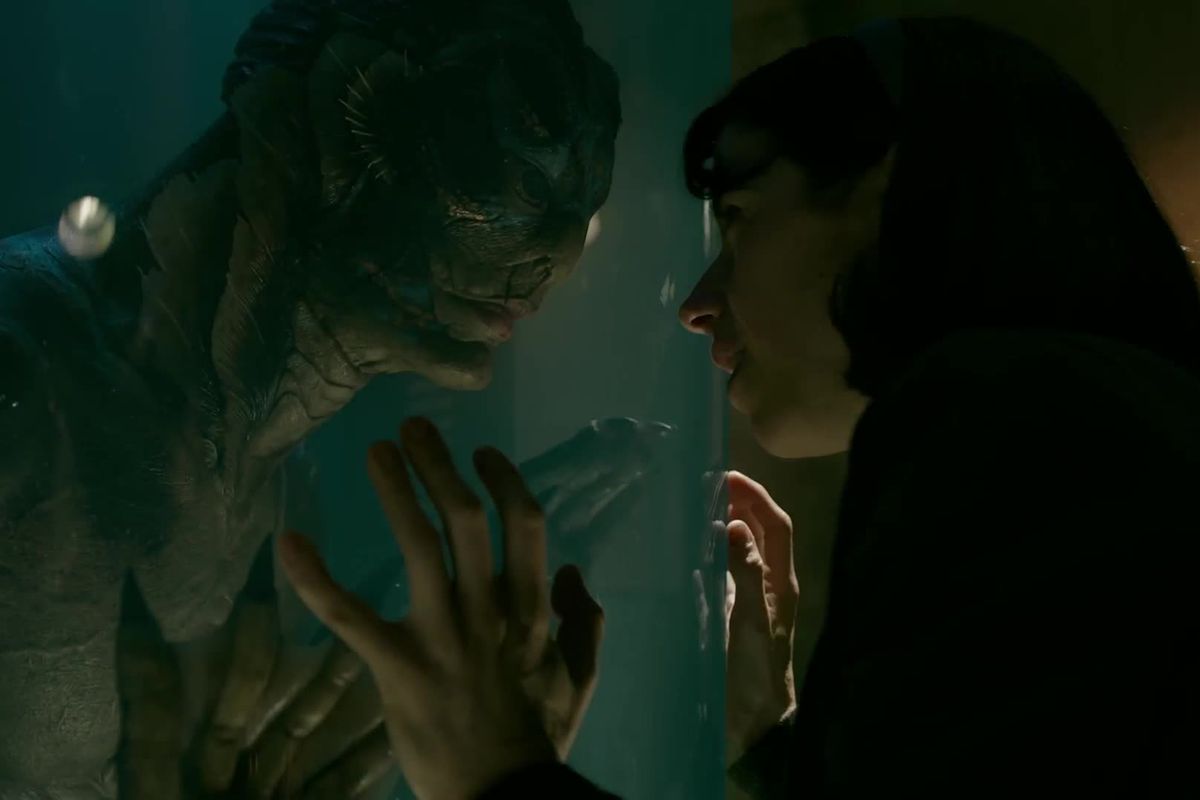
Film Review Outline
Although there is no right or wrong format in writing a movie review, it is always to best present it in such a way that all the thoughts are neat and organized that will provide the readers a very smooth transition of your review. You may also see topic outline .
I. Introduction.
A. Describe a scene, incident, or dialogue from the film. When writing a movie review about a certain motion picture, do not start directly with your opinion or criticism on the film, but instead begin by recalling a certain part of the movie that you find the most intriguing, something that you cannot forget so easily and start talking about it. You may also see program outline .
B. Remind the reader of the last film by this director or lead actor. If this movie was the director’s first ever solo movie (Jordan Peele on his movie Get Out ), then you can try proceeding to the movies that the lead actor or actress has starred on. If that was also a first for the lead actor, then try connecting the film with a current event or situation. You may also see speech outline .
C. Or connect the film with some current event. Although this is not normally seen in movie reviews, it is still very much applicable especially when you are unable to do the previous option. In Get Out, the film may still address racism, but it is not done in a traditional way. The kind of racism this film addresses is a little more subtle– a type that is more covert and not so obvious. You may also see script outline .
This particular racism is possibly the reason why you have to watch the tone you speak while talking to police to not sound treating and wind up in the obituaries. Jordan Peele was a true genius when he not only directed, but also produced and wrote “Get Out” layering the film with symbolism and satire that mirrors the current black experience. You may also see biography outline .
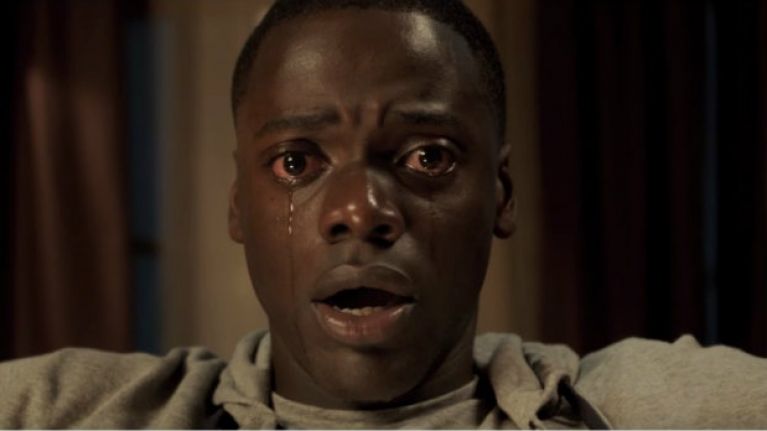
II. Thought Organization
1. Description/summary. You have already given a scene that was able to intrigue you. Now that is done and over with, it is time that you provided the audience a detailed version of the movie itself. Not necessarily scene per scene, but present it in a way that all the important points of the movie are covered and accounted for. You may also see content outline .
2. Analysis (Literary, Dramatic, and Cinematic). After giving a detailed synopsis about the motion picture, you then proceed to the analysis stage wherein you begin to break down the technical and physical aspects of the film that have either impressed you, or completely failed you, or you feel like that it could be worked on and eventually improved. As mentioned before, it can range from the cinematography, the story, the color grading, the music, the story, the acting, the special effects. Whatever you aspect you feel like needs recognition, put it there. You may also see leadership outline .
3. Evaluation (Was the film entertaining or not? Why?). Once you finished your analysis, provide your final evaluation of the film as to whether you have enjoyed it or not. If you have enjoyed it, provide a reason why. If not, provide a reason why. Provide justice to the film. You may also see tentative outline .
4. Conclusion. Start strong and end strong to any form of literature that you are going to write.
Film Review Outline Example
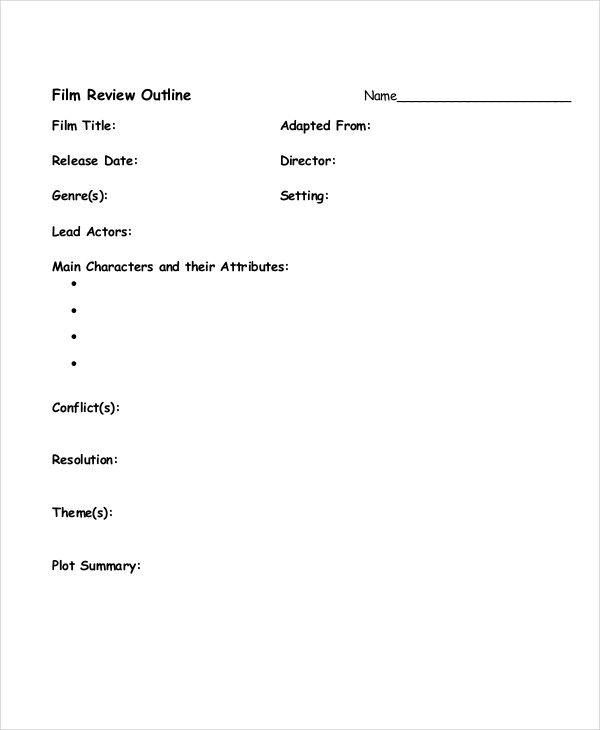
Studying Your Source Material
1. Gather basic facts about the movie. Be it before or after the movie, you should learn to gather the important details of the movie such as:
- The title of the film, and the year it came out.
- The director’s name.
- The names of the lead actors.
2. Take notes on the movie as you watch it. That’s like a job of a journalist or something. But if you are really serious about reviewing a specific movie, grab a notepad or even your laptop. You may also see chapter outline example .
- Write whatever aspect you think stands out in a positive or negative way. Think about how this detail relates to the rest of the movie and what it means in the context of your review.
- Take note of patterns you begin to notice as the movie unfolds.
- Don’t be afraid to hit the pause button once in a while. Rewind if you need to.
Documentary Movie Review Outline
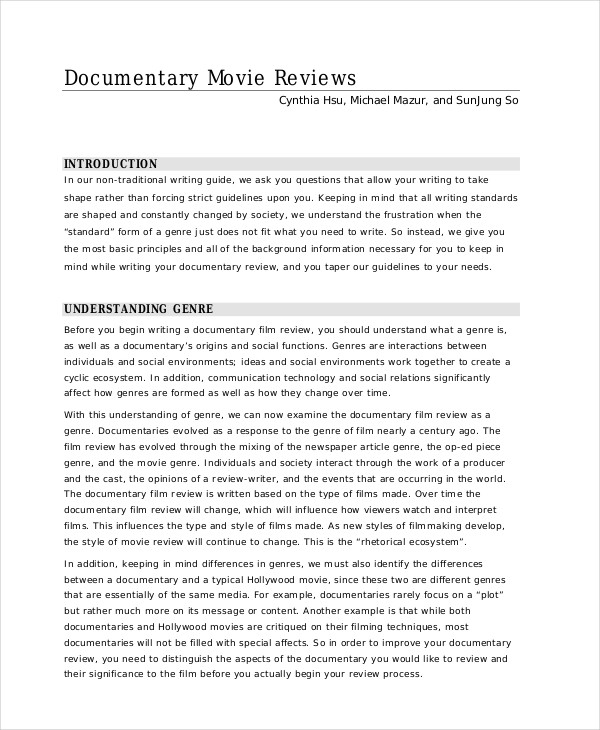
- Direction. How do you think the director wanted his or her story to be told? If there are some specific gaps that were not answered in the movie or it was just plain slow, you can ask the director about it. At the same time, do a comparison to the movies that were directed by the same person and identify which you liked better. You may also see research paper outline .
- Cinematography. What techniques were used to film the movie? What setting and background elements helped to create a certain tone?
- Writing. Script writing is the heart of every good story, which also includes the dialogues and the character’s personality. Did you think the plot was interestingly unique, or was it too cliche and boring?
- Editing. Another important aspect in making movie magic are the people behind the computer making the magic. The transition of the scenes, the kind of cuts they use, the color grading, the sound or special effects used, the computer-generated image (CGI). All these are very important to make a movie be as realistic and creative as possible. You may also see training outline .
- Costume design. Do the costumes fit the scene or the action sequence that he or she is playing? In the world of cinema and film, you need to have an eye for fashion especially when you want to make the icon more memorable. Take the costume of Wonder Woman or Indiana Jones.You may also see book outline .
- Set design. Consider how the setting of the film influenced its other elements. Did it add or subtract from the experience for you? If the movie was filmed in a real place, was this location well-chosen?
- Score or soundtrack. Indiana Jones. Star Wars. The Extra Terrestrial (E.T.). All composed by the man and the legend, John Williams. He does not choose any song willy-nilly. He takes the time to conduct an in-depth analysis of each scene in order to determine what specific mood must be set for that particular sequence in order to achieve maximum effect, especially among the audience. You may also see thesis outline .
4. Watch it one more time . It’s impossible to fully understand a movie you’ve only seen one time, especially if you’re pausing it often to take notes. Take the time to review it once more completely, without any disturbances and look back on the things that you’ve written as to whether they are correct or not. You may also see APA outline .
Performance Review Outline
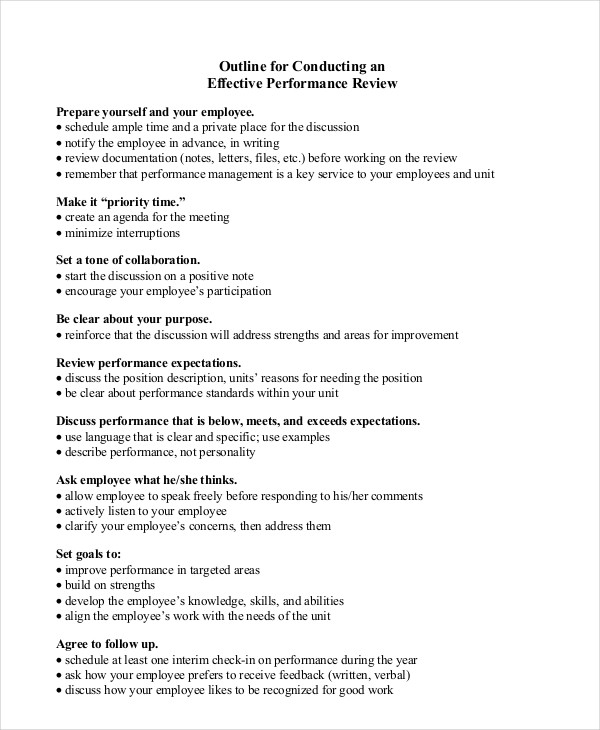
Reviewing your Movie Review
Edit your review. Once you’ve finished the first draft, read it through and decide whether it flows well and has the right structure. At this stage, you may need to shift around paragraphs or even delete the unnecessary parts in order to have the correct flow of ideas and thoughts. Give your review at least one editorial pass, before you consider it to be editorially sound. You may also see rough outline .
- Proofread your review. In proofreading your movie review, make sure that you are able to get all the details right, the scenes, the names, every single detail, so that it can be considered an accurate portrayal of the movie. You may also see presentation outline .
- Publish or share your review. You might want to consider publishing your review online or on the newspapers. In doing so, this will accomplish two things: people who would have wanted to make their review about that particular movie, but was unable to do so now have the means of sharing what they think through your words, or allow yourself to be open to feedback from other “film critics” to engage in an intellectual discourse about the film. You may also see course outline .
AI Generator
Text prompt
- Instructive
- Professional
10 Examples of Public speaking
20 Examples of Gas lighting
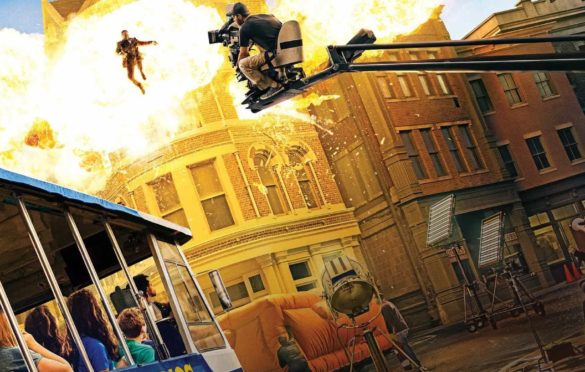
The Best Movie Taglines — 75 Examples And Why They Work
- What is Pathos
- What is Logos
- What is Telos
- What is Kairos
- What is Ethos
- Ethos, Pathos & Logos
- What is an EPK
- What is a Creative Director
- What is Branded Content
- What is a Creative Brief
- How to Pitch a TV Show Like a Pro
- How Does Rotten Tomatoes Work?
- How to Make a Movie Poster
- The Filmmaker’s Guide to The Clio Advertising Awards
- A Complete Guide To The Funniest Commercials
- How to Make a Commercial
- How to Develop Your Brand
- Complete Guide to Advertising on Instagram
- How Does Instagram Promotion Work and Is It Worth It?
- How Can You Kickstart Your Social Media Advertising?
- Small Business Advertising Ideas from LeBron James Commercials
- How To Create a Successful Branded Content Campaign
- How and Why To Make Facebook Video Ads That Work
- How to Make a Commercial People Will Actually Share
- Video Branding Strategies to Get More Followers Right Now
- Social Media and Digital Communications for Successful Short Films
- Digital Advertising Trends
- Most Inspiring Ads
- Best Movie Taglines
- Best Marketing and Advertising Campaigns
- Best Creative Brief Template
- Best Explainer Video Trends for Your Brand
ow can you describe your entire movie in only a few words? All that hard work, time, and money comes down to a simple phrase: the movie tagline. We combed through countless taglines, and picked the best movie taglines of all time so you can better craft your own. Let’s go!
The IMportance of a Tag
1. what is a movie tagline.
The best tagline is a delicate art unto itself. A balance of informative, compelling, and silly. The very best ones cut dangerously close to the very worst.
So what's the secret?
How can you learn the art of the tagline? Let's first define it. Then we'll start in the past.
TAGLINE DEFINITION
What is a tagline.
A movie tagline is a short text which serves to clarify an idea for, or is designed with a form of, dramatic effect. Many tagline slogans are reiterated phrases associated with the film.
General considerations for movie taglines:
- It can speak directly to the plot of the film
- It can speak to the experience you might have watching the film
- It will often use puns or turns of phrase
Some examples of movie taglines could be unrelated to the plot of the movie. They can also be super plot-specific.
Some work because of the puns. Others work because they don't work at all. But they are concise and memorable.
Let's take a walk down memory lane.
Classic Movie Taglines
2. a look at the classics.
Ahh, the classics. Some of them feel a little dated, but the core of what would define the greatest taglines were established in the early days.
Double Indemnity
"From the moment they met it was murder."
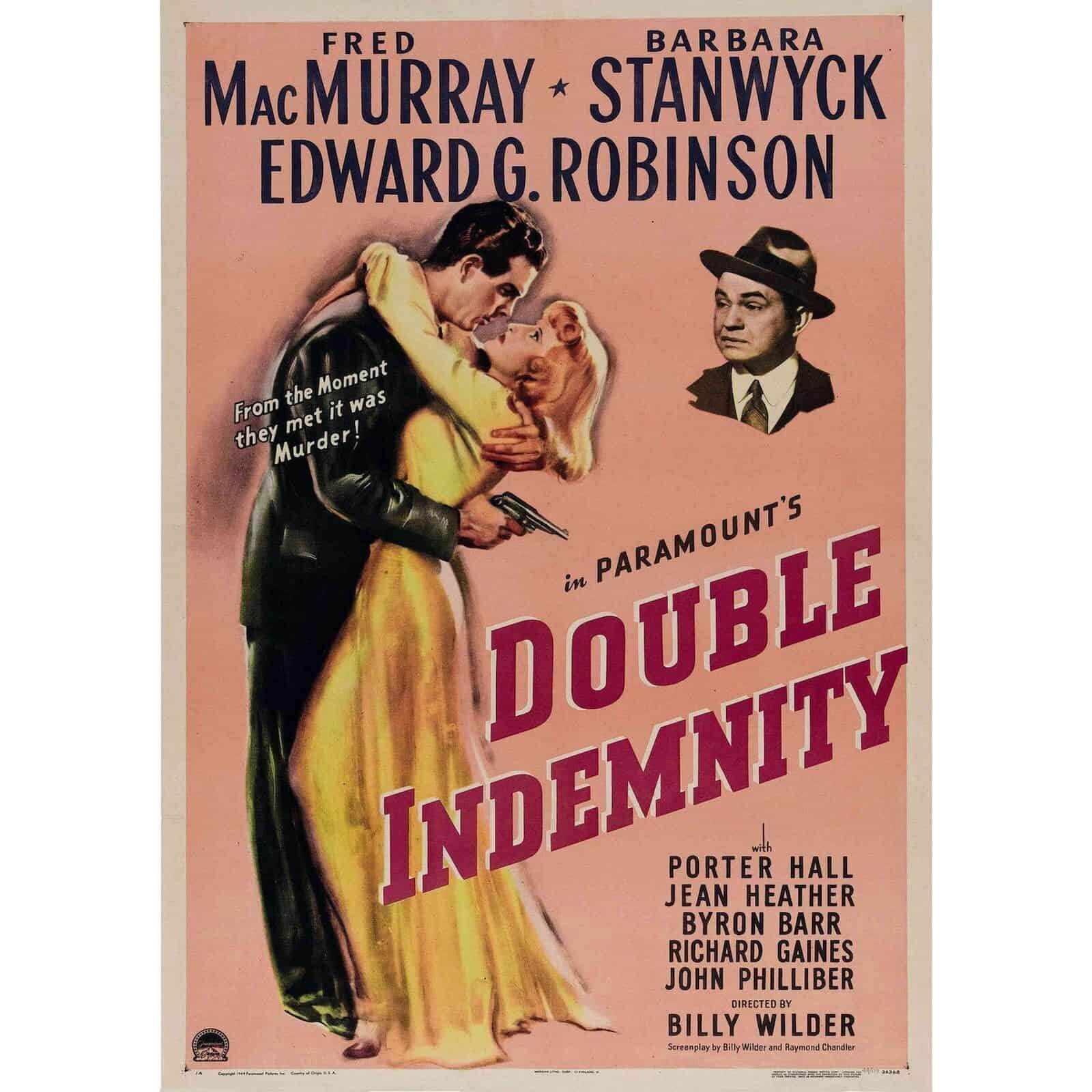
One of the great noir tagline examples
Billy Wilder's Double Indemnity is a work of noir genius. Every line of dialogue is as sharp as the tagline itself. If you haven't seen it, you're in for a treat.
Learn more dialogue tips for your own writing and also for your inevitable tagline. It might spark the creativity that you need.
Father of the Bride
"The Bride gets the THRILLS, the father gets the BILLS."
This one feels a bit dated, but the rhyme works, and the comedy of the situation is pretty clear.
The Lady Eve
"When you deal a fast shuffle, love is in the cards."
Another Barbara Stanwyck starrer, The Lady Ev e is about a con where real feelings get involved. There is a pivotal card game as well, so the famous tagline says it all in snappy fashion.
12 Angry Men
"Life is in their hands -- Death is on their minds."
More Henry Fonda! Sidney Lumet's terse jury room drama gets a movie tagline that brings the stakes to the fore. This is necessary because it's a movie about a conversation in one room.
The Magnificent Seven
"They were 7... and they fought like 700."
A play upon the number in the title that also gets us excited for an epic showdown. The best movie taglines do this with such ease.
"A man went looking for America, and he couldn't find it anywhere."
Easy Rider was a true game changer. The tagline, and movie capture a cultural moment where everything shifted. It speaks to a specific movement. Powerful.
The Sound of Music
"The Happiest Sound in All the World."
Perhaps the most famous musical of all time, with a movie tagline that emphasizes genre and a desired emotional result.
Some modern musicals like "La La Land" stand without a tagline but captured audiences in a very different way. Learn more about how to write a musical , and analyze the hit.
Taxi Driver
"On every street in every city in this country, there is a nobody who dreams of being a somebody."
Intrigued? Martin Scorsese and Paul Schrader's study of existential loneliness is a film buff favorite. Robert De Niro had already broken out, but as Travis Bickle, he became a true screen icon.
Bonnie and Clyde
"They're young, they're in love, and they kill people."
The "sudden left turn approach" teases our interest. Juxtapose the young couple with murder, and you've got people hooked.
"The story of a man who was too proud to run."
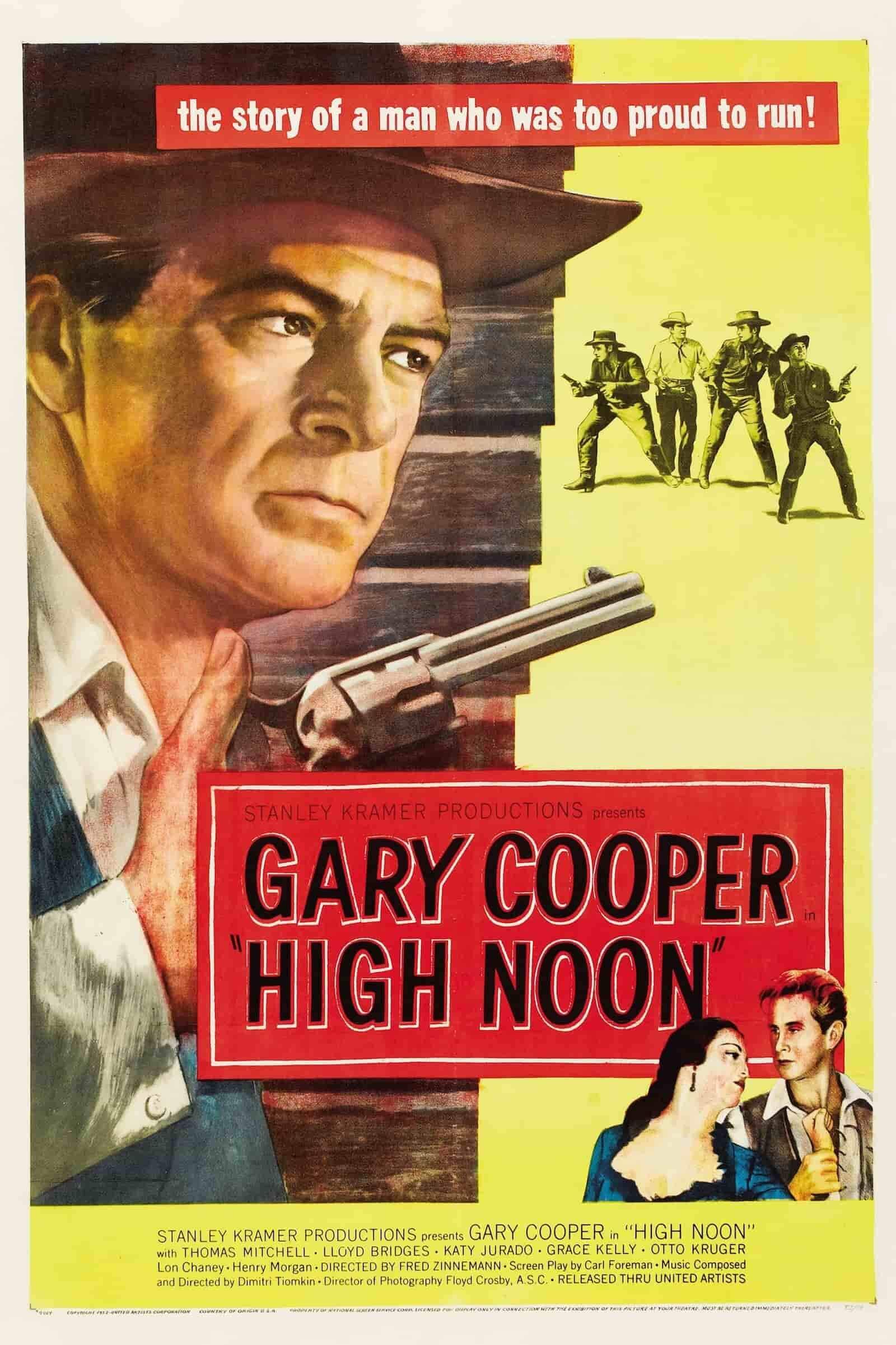
One of the most memorable movie tags
Pure, straightforward and admirable. A lot like it's star, Gary Cooper. If you aren't inspired by the old-fashioned heroism hinted at in this movie tagline, you will be when you see the movie.
Treasure of the Sierra Madre
"The nearer they get to the treasure the farther they get from the law."
Another movie tagline that implies an uncertain danger within the story, almost asking the audience a question .
RELATED POSTS
- Read More: How to Become a Writer →
- Read More: 22 Screenwriting Tips for Better Dialogue →
- Read More: Analyzing La La Land: Writing a Musical →
COMEDIC MOVIE TAGLINES
3. these get ‘em laughing.
Comedy is a great genre mainly if you're looking for the best taglines. Best taglines often have a little humor even if the subject matter isn't a comedy in nature... If it is?
Well, then they have free reign to be silly. Here are our picks for the best:
Dumb and Dumber
"For Harry and Lloyd, every day is a no-brainer."
Ghostbusters
"Who you gonna call?"
This is one of those best taglines that became synonymous with the movie itself, and part of the cultural lexicon.
Catch Me if You Can
"The true story of a real fake."
A fun play on words which is an excellent movie tagline tactic, and reflects this particular movie's plot .
Grosse Pointe Blank
"Even a hitman deserves a second shot."
The title is a pun; the tagline is a pun. If you don't like puns, you probably don't like movie taglines…
Naked Gun 33 & ⅓
"From the brother of the director of Ghost."
The Naked Gun movies are spoofs. The taglines are spoofs of taglines. Here, they take on the movie tagline tactic of mentioning tenuous connections to recent big hits.
"If you only see one movie this year... you need to get out more often."
Another funny parody of a typical movie tagline tactic.
Office Space
"Work sucks."
It's funny because it's true.
Weekend at Bernie's
"He may be dead but he’s the life of the party."
Weekend at Bernie's belongs on any list. It would be here even if the tagline was awful. Fortunately, it's pretty good.
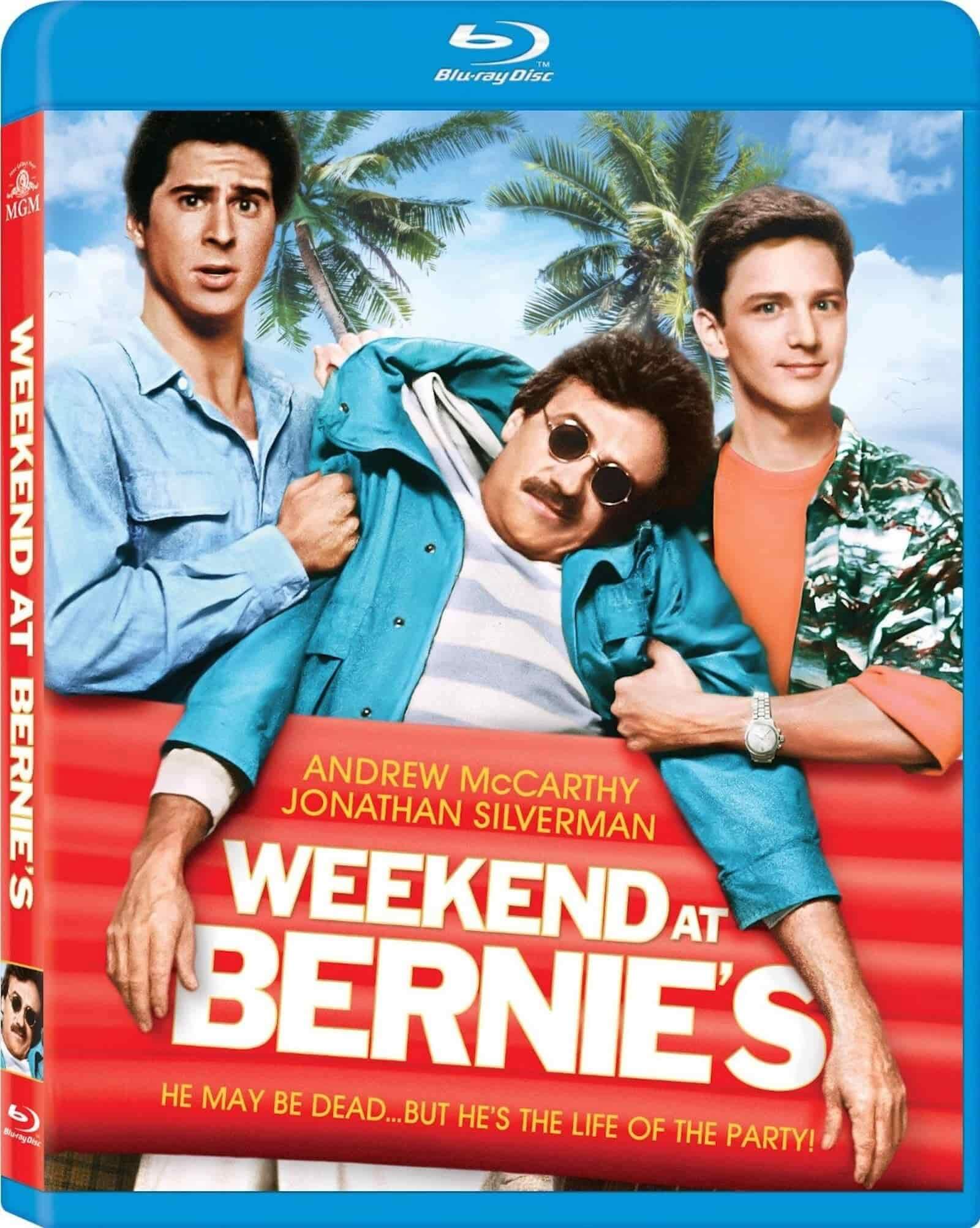
A personal favorite
"If at first you don't succeed, lower your standards."
The beloved Farley and Spade comedy has a great tagline. This tactic is to put a spin on a well-known turn of phrase. It's effective and done in taglines quite a bit.
Chicken Run
"Escape or die frying."
Puns. Common sayings. Short and to the point. This one has it all.
The Truman Show
"On the air and unaware."
This tagline tells you the story of the movie with a nice little rhyme. This sort of movie tagline is part of why people sometimes confuse a tagline with the more informative cousin: the logline.
If you want to know more this, check out our post on how to formulate loglines .
StudioBinder also provides an entirely free masterclass for tv writing . Video essays like "How to Write a Treatment" can be very helpful in the stages prior to crafting your tagline.
Mars Attacks!
"Nice Planet. We'll take it"
Simple, yet effective.
O’ Brother Where Art Thou
"They have a plan but not a clue"
This one is a lot like the Dumb and Dumber tagline, but not quite as strong because it doesn't tell us that much about the movie.
Ferris Bueller's Day Off
"One man's struggle to take it easy."
An effective tactic in many of the best taglines is to combine opposites. A struggle to take it easy is a contradiction. It makes us wonder a bit. It catches us off guard. Keep this in mind when you think about taglines, or getting people's attention. It works.
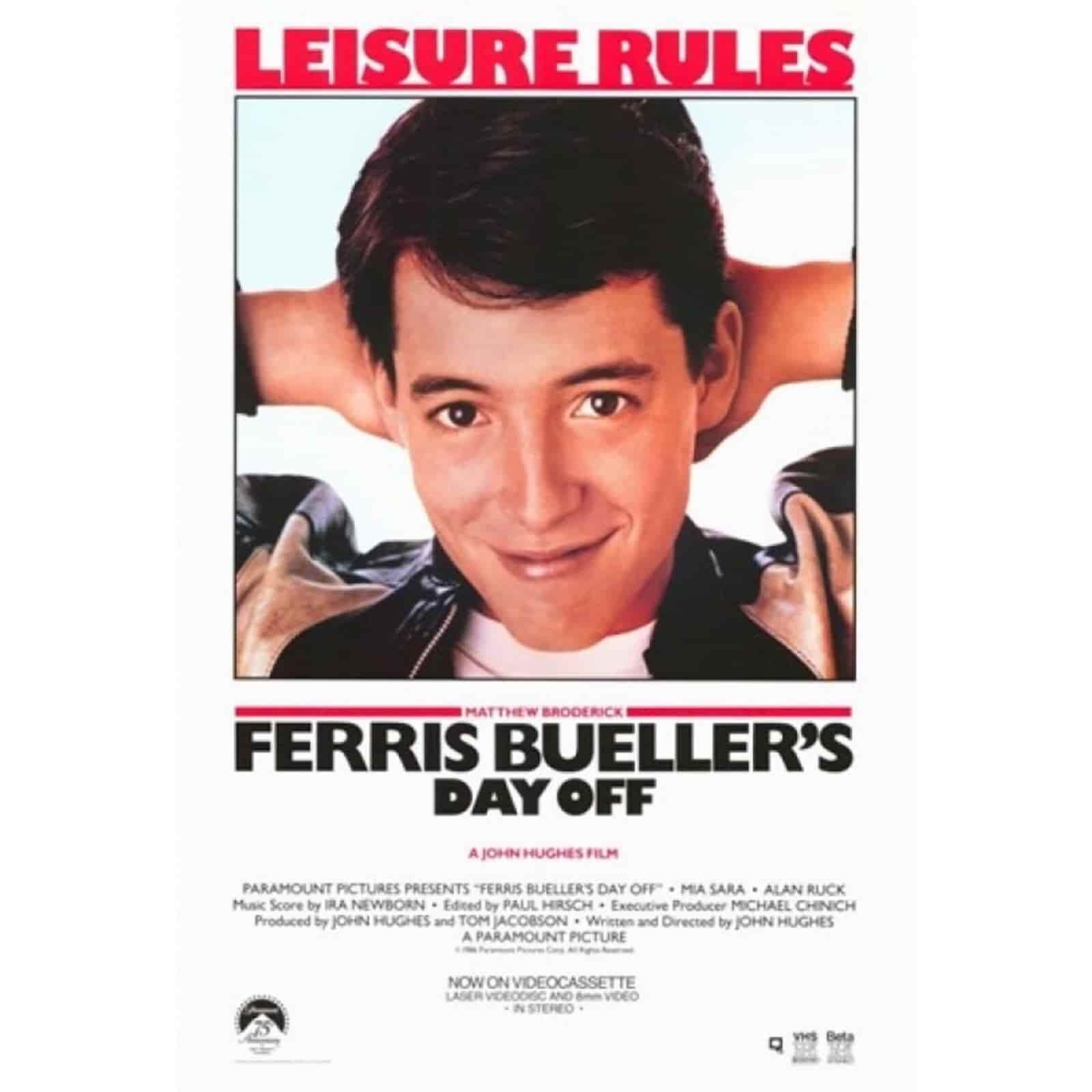
Irony in tags
My cousin vinny.
"A comedy of trial and error."
Every comedy that has a courtroom involved is forever jealous of My Cousin Vinny for nabbing this one.
The First Wives Club
"Don't get mad. Get everything."
There can be no more perfect tagline for a movie about divorce.
Hot Shots! Part Deux
"Just Deux it."
Hotshots went with the French word for two in their sequel. Combine that with Nike's famous slogan, and you have a solid comedy tagline.
Related Posts
- The Best Comedies of All Time →
- How to Write a Logline Producers Will Love →
- FREE Masterclass: TV Writing and Development →
Horror Movie Taglines
4. make them scream.
The best horror taglines tease out the fear factor in an audience. But they sometimes play with comedic elements like any other tagline might.
"Here they grow again."
Another pun. This one feels pretty close to comedy.
"Man is the warmest place to hide."
This tagline is both disgusting and a little funny. You want to know more, and you don't…
Whatever Happened to Baby Jane
"Sister, sister oh so fair why is there blood all over your hair?"
The sister on sister crimes of this cult classic are all on full creepy display in the tagline.
"You'll never go in the water again."
For many moviegoers, this tagline came true.
Nightmare on Elm Street
"If Nancy doesn't wake up screaming, she won't wake up at all..."
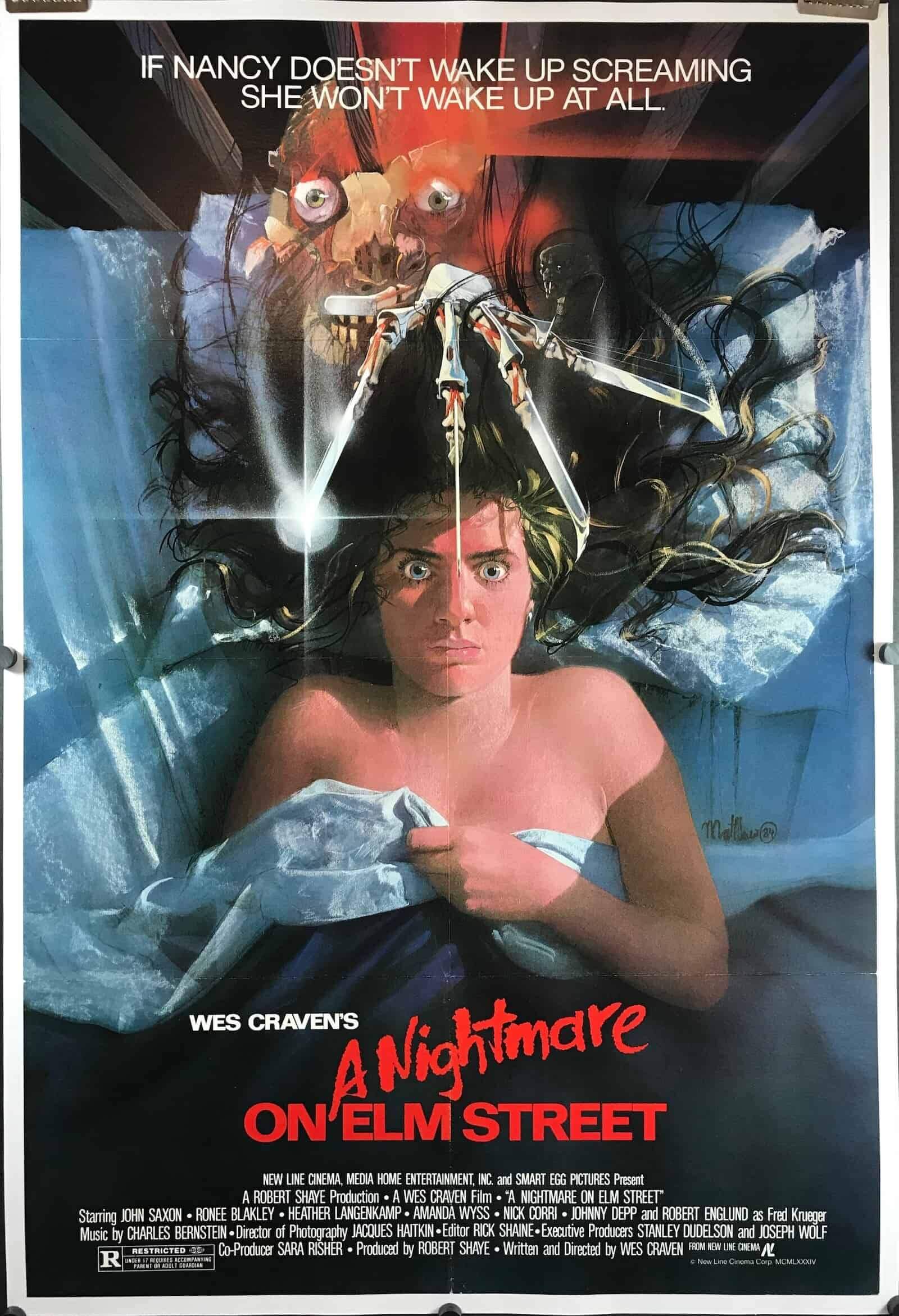
This poster is paired perfectly with its tagline
This tagline exemplified the horror movie craze of the 1980's. The tagline and the movie poster captures exactly what makes Nightmare on Elm street scary.
- Read More: How to Make a Movie Poster →
- Read More: Format Your Screenplay the Right Way →
- Read More: Know Plot Through and Through →
Disney Movie Taglines
5. a whole new world.
Disney has its own unique and compelling kind of branding. They've built an actual media empire, and the movies and their taglines have been a part of it.
"For anyone who ever wished upon a star."
This movie belongs in the horror section. Scariest movie ever. In their marketing genius, Disney gave it a tagline that makes it seem whimsical and full of magic.
"Still the fairest of them all."

Disney's classic
Snow White was Disney's first animated feature. This movie tagline for the rerelease played on the nostalgia for the groundbreaking film and its lush visuals.
The tagline says it all
"Midnight never strikes when you're in love."
This is clever, but I actually feel like it's not true in the plot. Doesn't midnight strike when she's in love with the prince? Still works.
"Hear the pictures. See the music."
Fantasia was an expensive bomb for Walt Disney. Maybe because the tagline was a little confusing. There is some of his signature genius in it. Remember what we said about opposites within a movie tagline?
Monsters Inc.
"We scare because we care."
More modern day for Disney/Pixar. This movie tagline is incorporated into the plot, and it's another effective use of contrast within the tagline.
- The Pixar Storytelling Method →
- How to Write a Memorable Movie Synopsis →
- Screenwriting Software for Your Whole Production →
SUPERHERO MOVIE TAGLINES
6. power up with superheroes.
There are a lot of superhero movies and not a lot of great superhero movie taglines. Probably because most of the movies themselves are pretty ho-hum.
But here are a select few that are pretty good, and have become part of the cultural lexicon.
"With great power comes great responsibility."
We're on like our 5th reboot of Spidey since Tobey Maguire first donned the tights in 2002. Nothing from any of them has come close to having the lasting impact this one creative tagline has had.
"You'll believe a man can fly."
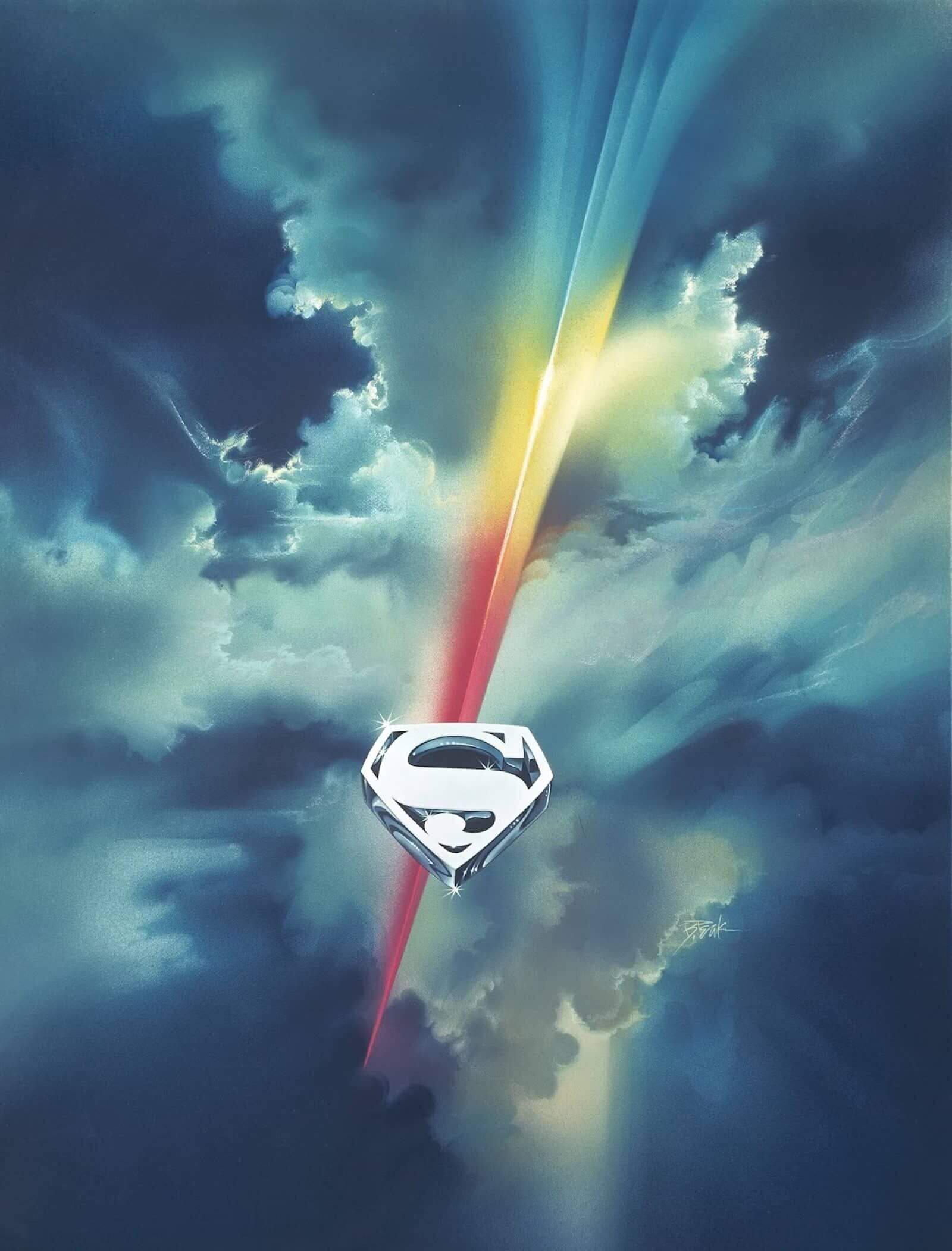
This movie tagline is simple and beautiful.
In 1978, unlike today, audiences weren't exactly flocking to see movies about men in bright colors fighting crime. It was quite the opposite.
However, this movie suggested there was a little magic there that was worth the price of admission.
Of course, if you re-watch it now, you will most definitely NOT believe the man is flying. The effects didn't age so well.
The Dark Knight
"Why So Serious?"
This movie tagline doesn't belong on the list. It tells us almost nothing about the movie, and it's probably not what got anyone in the theater. But it has stayed with us all. The movie is arguably the best of the genre, and the tagline, as a result, is with us forever.
If you want a deeper dive on The Dark Knight , check out our post that dissects the screenplay structure using the story circle technique .
Dramatic Movie Taglines
7. make them feel something.
Drama taglines try, to use the parlance of our times, to give you the feels. All the feels, if possible. If you're trying to come up with a drama tagline think about a desired emotional state, and shoot for that.
So for this section think about how each movie tagline conjures a specific emotion or two.
Erin Brockovich
"She brought a small town to its feet and a corporation to its knees."
Inspired? That's the goal of this movie tagline.
"The first casualty of war is innocence."
Now this line is just terribly sad. You feel this emotion before you've even seen the film.
Saving Private Ryan
"The mission is a man."
Determined. Hopeful. Inspired, again?
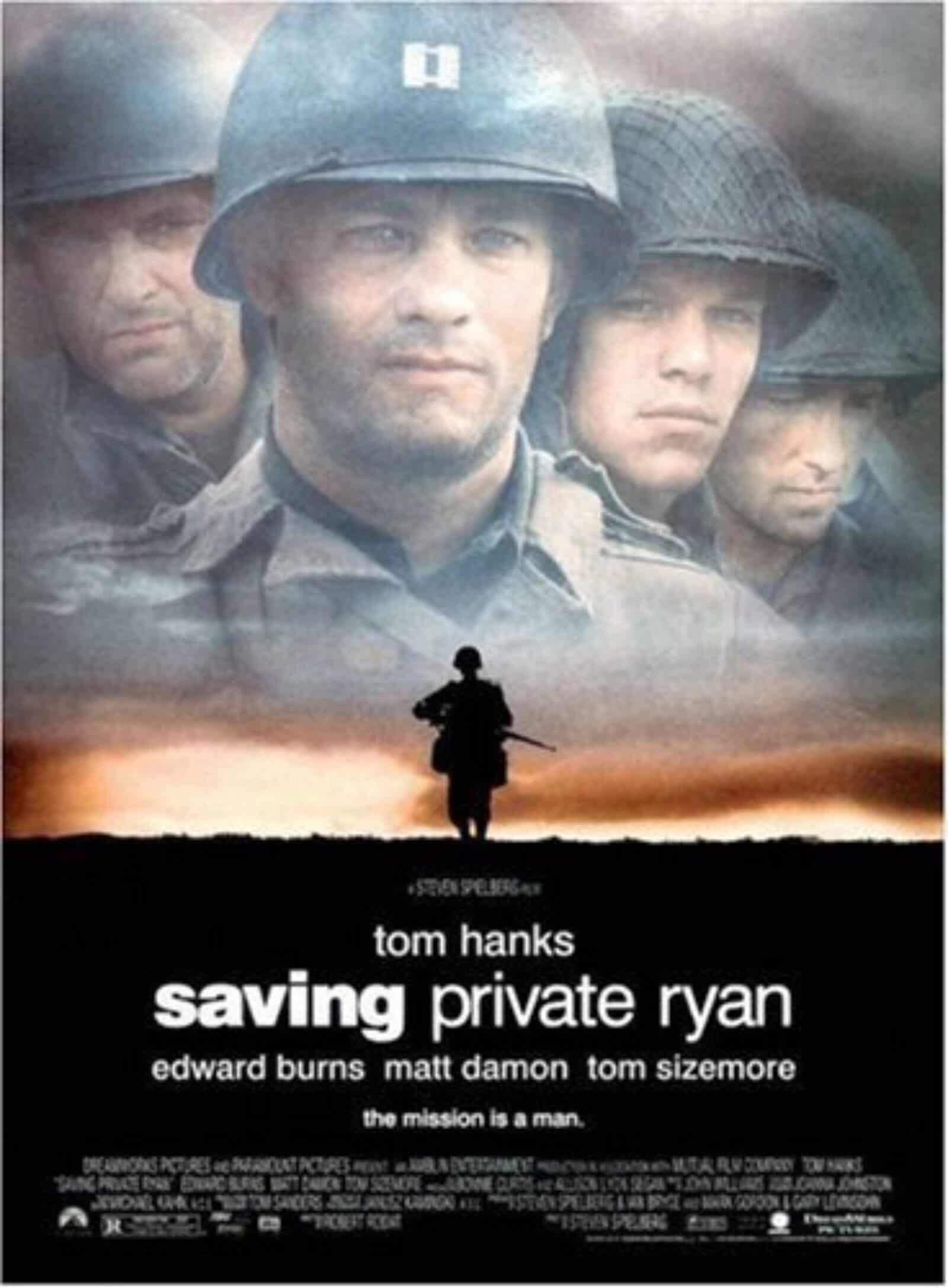
Dramatic yet inspiring tagline
"50 million people watching but no one saw a thing."
Edward Scissorhands
"His story will touch you even though he can't."
Touched...yet matched with this movie poster, slightly horrifying. A fair assessment of this film's paradox.
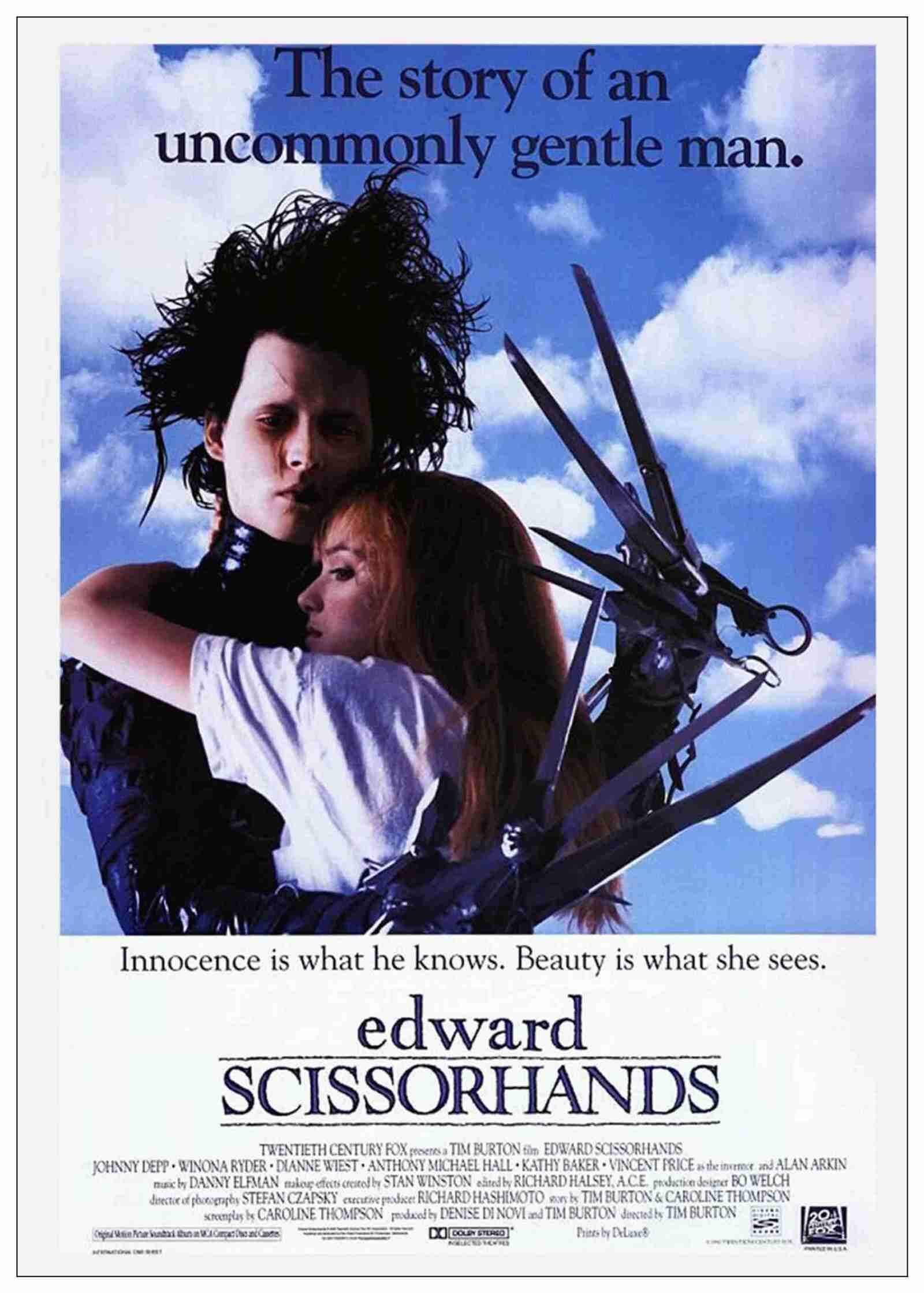
This movie tagline defies genre, just like the movie
"Good girls want him bad. Bad girls want him worse."
Jealous? Intrigued?
The Social Network
"You don't get to 500 million friends without making a few enemies."
Schadenfreude. That's not exactly a simple emotion, but when it comes to all things Mark Zuckerberg, it's what we lead with.
"There is more than one way to lose your life to a serial killer."
A combination of fascinated and worried.
Lost in Translation
"Everyone wants to be found."
Ennui. Angst.
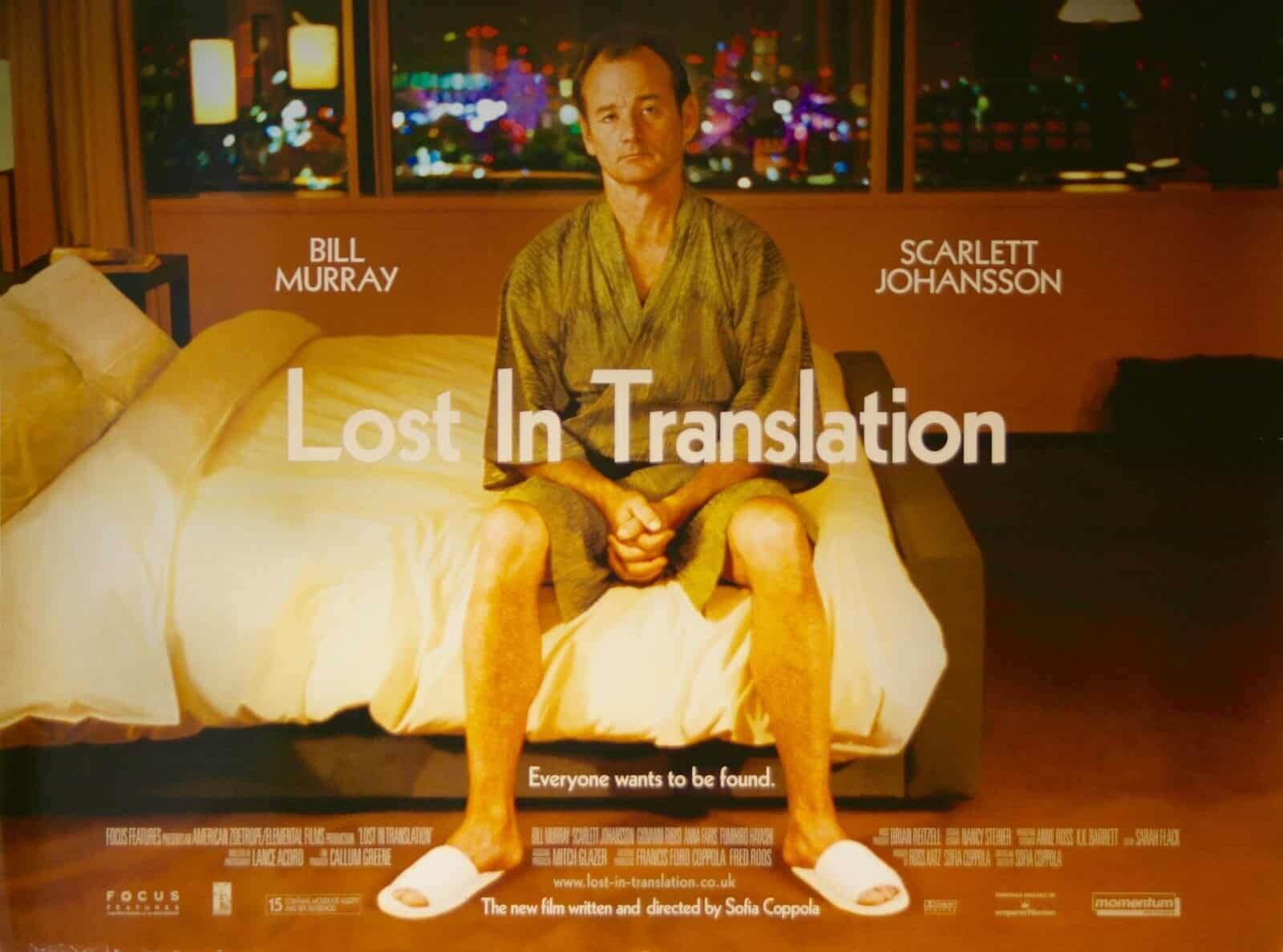
This tagline sums up Bill Murray’s character
School ties.
"Just because you were accepted doesn't mean you belong."
"Some memories are best forgotten."
Curious and reflective.
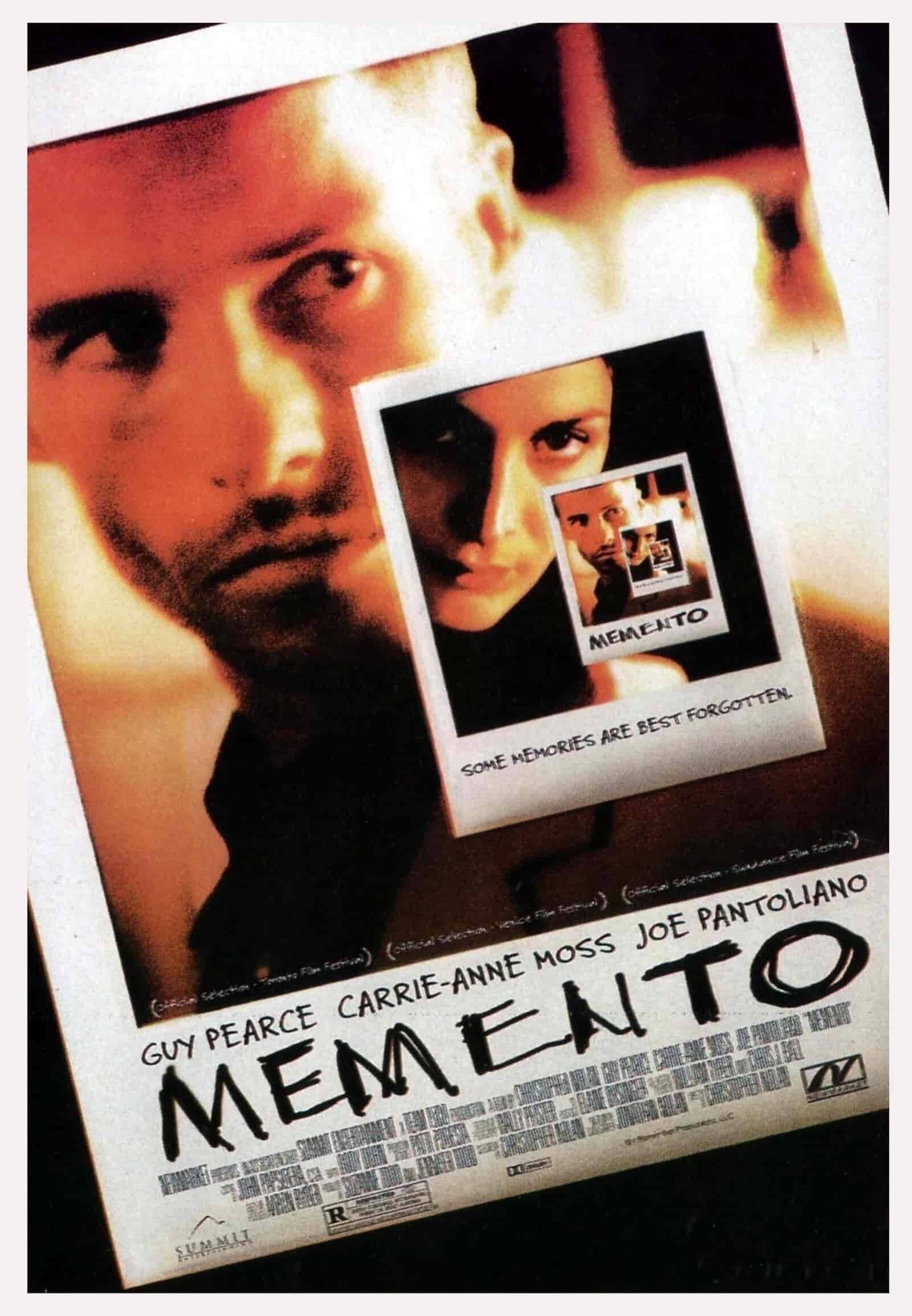
This poster is almost unnecessary with this tagline
Boogie nights.
"Everyone has one special thing."
Dare I say... excited?
Ordinary People
"Everything is in its proper place except the past."
Close Encounters
"We are not alone."
Filled with wonder.
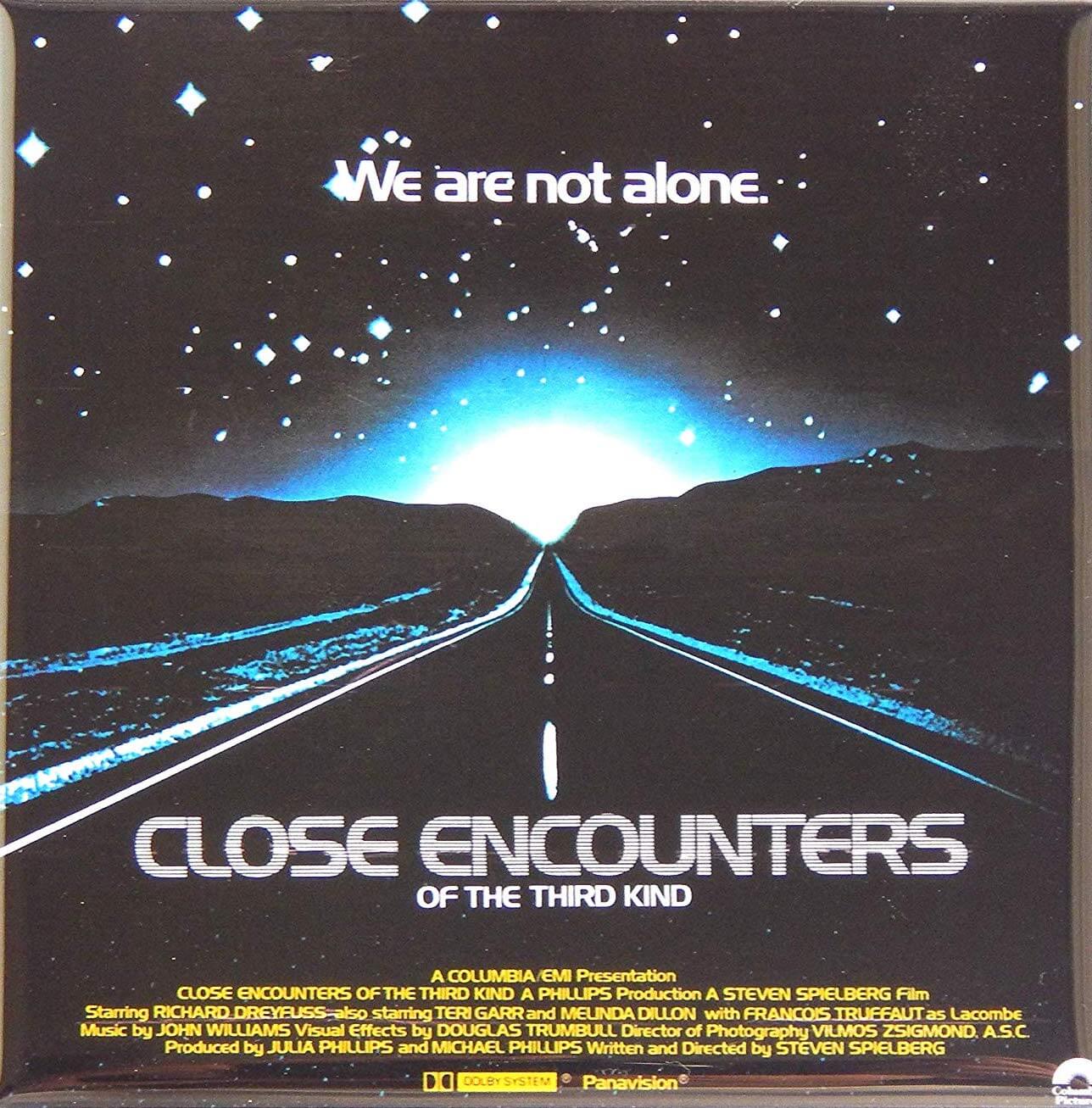
Some taglines pique interest right away
Action movie taglines, 8. get the adrenaline flowing.
The action movie is no stranger to puns or one-liners. In fact, we should rank those sometime in another post...
As a result, the action movie taglines tend to be pretty solid. There is a natural fit. Combining a little humor with a little edge... that's an action movie's wheelhouse.
Learn how to write and shoot action here , but for now..
Here are some of the best action movie movie taglines:
I am Legend
"The last man on Earth is not alone."
Again notice the use of a contradiction here. It poses the question the movie will answer. If he's not alone... who else is there?
"Reality is a thing of the past."
The Matrix 's tagline is genius in its simplicity. Six words that cover the whole concept, but leave you with questions that need answering.
"When he said I do he never said what he did."
The title of this movie is its own tagline.
You have to imagine there were a ton of solid options turned down before they settled on this one.
Contradiction, unanswered questions... check and double check.
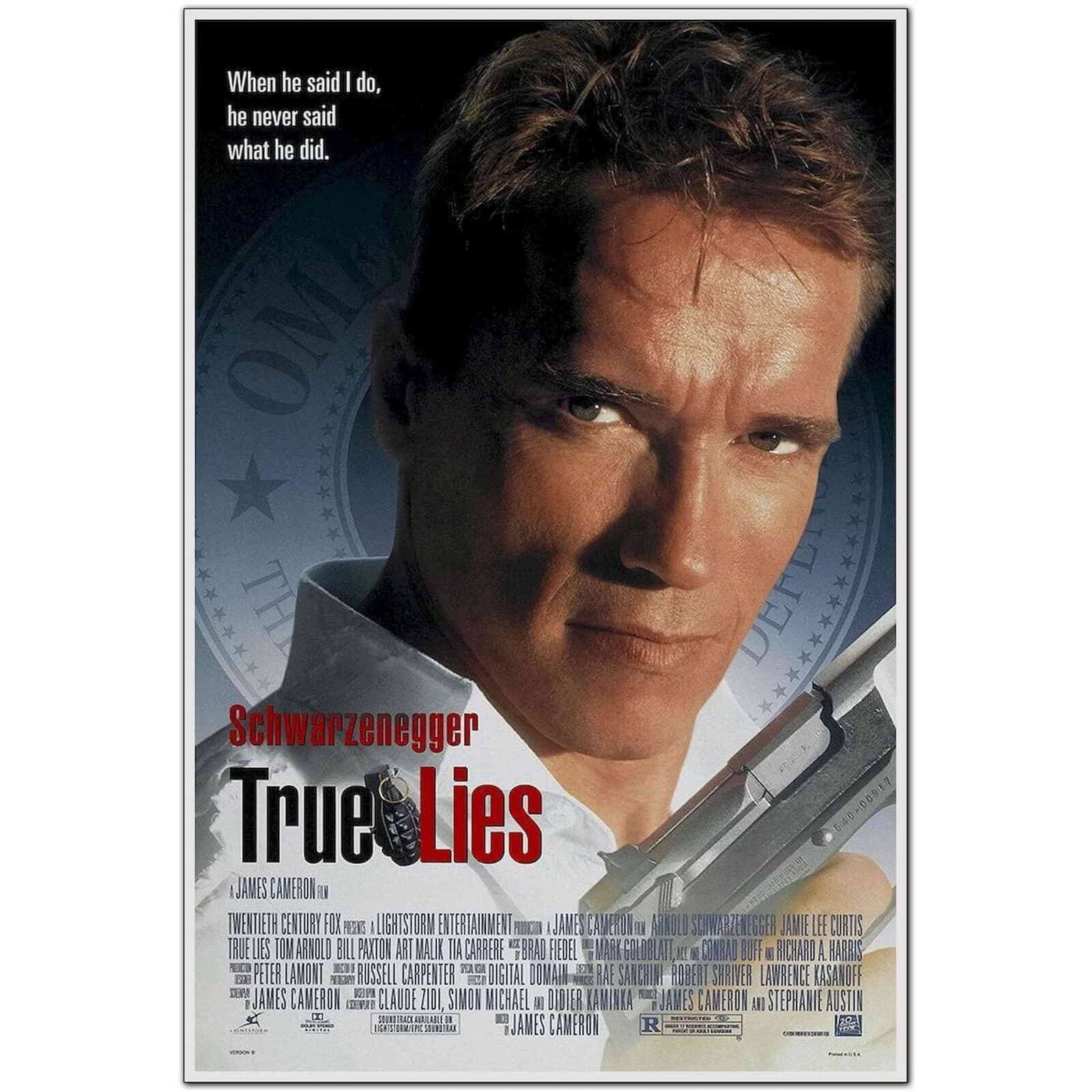
Tagling in the title
The good the bad and the ugly.
"For three men the civil war wasn't hell. It was practice."
Sergio Leone is a master of anticipating violence in cinema. The violence itself isn't the point; it's the waiting. This tagline does in two sentences what his movies do in every scene. Tee you up for something brutal.
T2: Judgement Day
"Same Make. Same Model. New Mission."
This tagline says enough will be the same that you will like this, but enough will be different that you have to see it. It's a winning formula when it comes to sequels.
Dirty Harry
"You don't assign him to murder cases. You just turn him loose."
You can bet on the action and violence in this story, and it's guilt-free because it'll be about targeting bad guys. Sign us up!
So Bad They're Terrible
10 worst taglines.
We're getting down to it now. The fun part. The rankings.
The difference between the best and the worst when it comes to movie taglines is slim. In some ways, this is its own best movie taglines list.
But in some ways, these movie taglines are just so awful. So beautifully terrible. Here there are in reverse order:
The Mutilator
10. "By sword, by pick, by ax, bye bye."
This is almost a good tagline. Maybe it is a good tagline. The mutilator truly toes that thin tagline line.
Scary Movie 3
9. "Great Trilogies Come in 3's."
This is an attempt at the type of humor Naked Gun movies employed in their movie taglines. But it doesn't quite work. It's just flat out bad. There is a fine line. Maybe the movie being awful hurts it too.
Beach Party
8. "The Perfect Summer when the urge meets the surge."
An attempt at wordplay that just feels kinda gross.
Jaws the Revenge
7. "This time it's personal."
This became a stock bad tagline. It's almost a tagline meme. Plus, does a shark really take things personally?
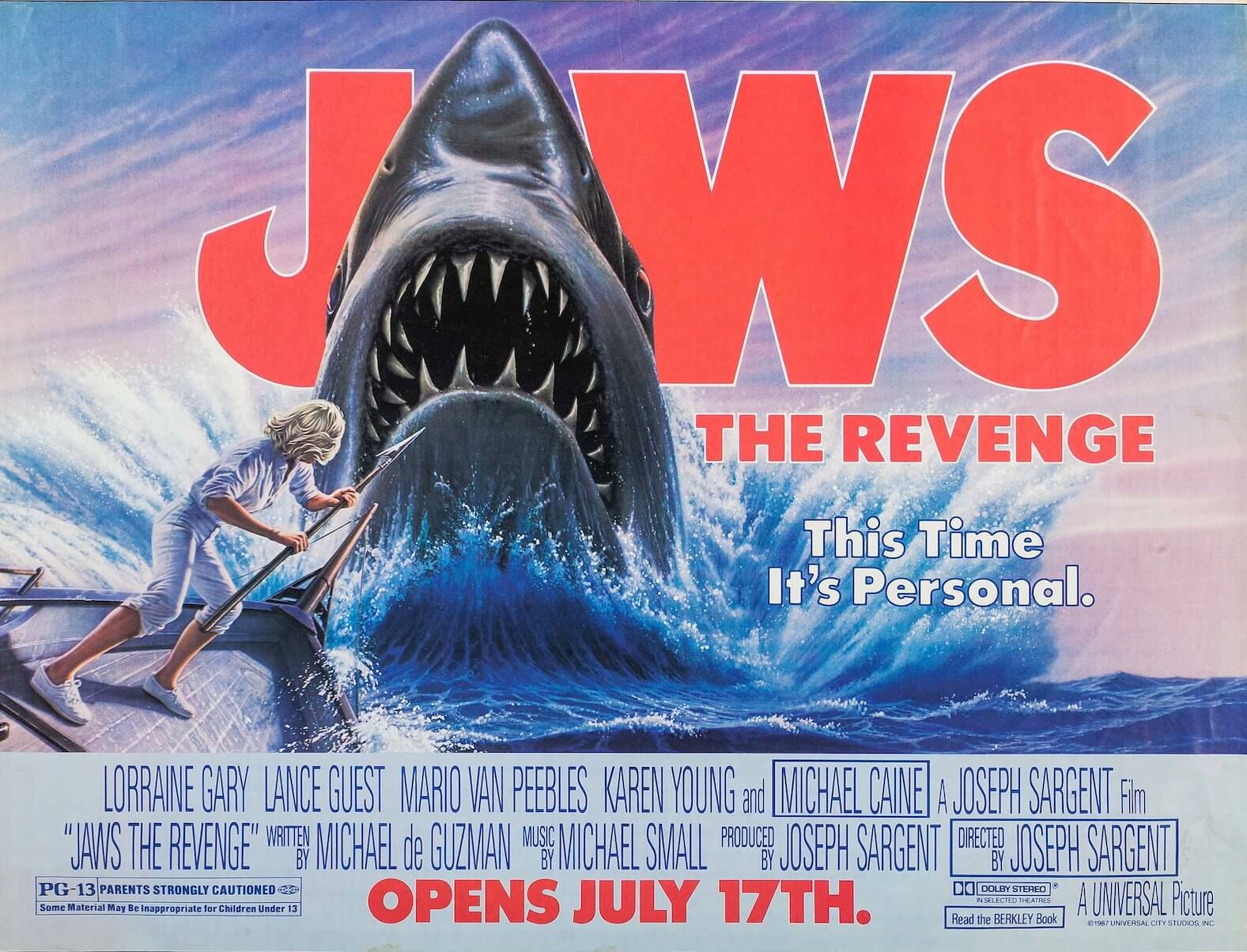
I take this tagline personally.
The lift movie.
6. "Take the stairs take the stairs for god's sake take the stairs."
I think this movie wants us to take the stairs.
Glen or Glenda
5. "I change my sex!"
Ok! No need to yell!
The truth is no worst list is complete without Ed Wood making a cameo.
I Was a Teenage Werewolf
4. "The most amazing motion picture of our time."
A common awful tagline tactic is just to claim general awesomeness of the movie in question. Unless the movie is Scary Movie 6 and it's an obvious joke, this sort of tagline is always a bad call.
Ice, Ice Baby
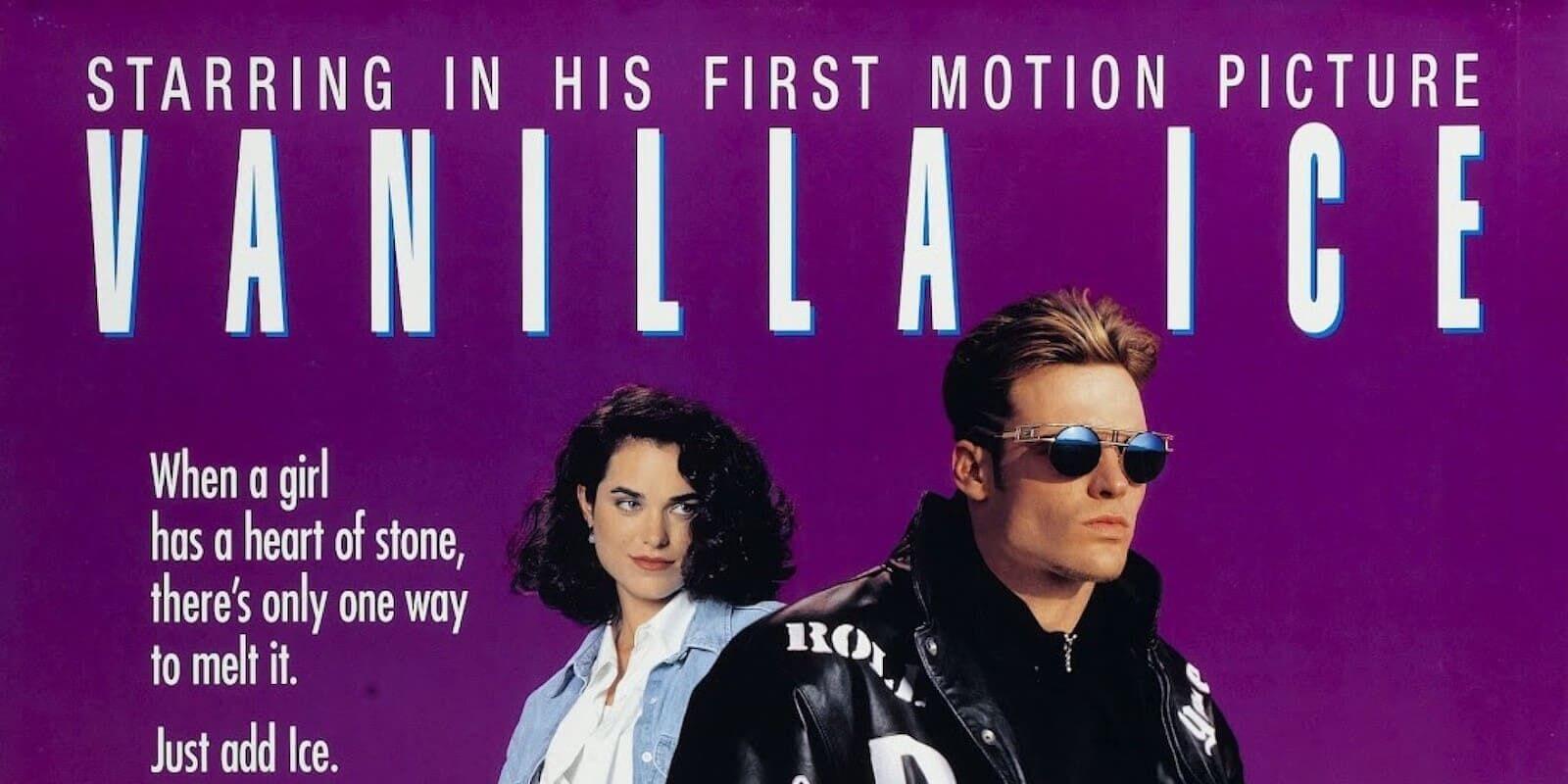
This tagline is too cold, too cold
This tagline doesn't make any sense. Sort of like Vanilla Ice's career.
Charlie St. Cloud
2. "Life is for living."
And water is wet, and the sky is blue and did someone really gets paid to write this?
Day of the Dolphin
1. "Unwittingly he trained a dolphin to kill the President of the United States."
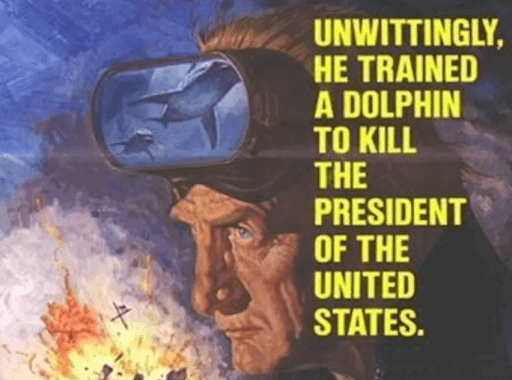
Some of the taglines are worse than the movies and vice versa.
This is a real movie. It stars George C. Scott and was directed by Mike Nichols. So many questions so few answers.
Leave Em Wanting More
Top 10 best movie taglines.
We finally made it. The definitive ranking of the ten best movie taglines of all time. If you read this far, you have survived countless puns and ten pretty awful movie taglines. You deserve the goods.
These tags accomplish much of what we have laid out so far as the keys to great movie taglines. But they do something more. They are greater than the sum of their parts. So here we go:
10. "Just when you thought it was safe to go back in the water."
This tagline plays well upon the original, which was also a winner. But it adds a new wrinkle.
9. "Houston, we have a problem."
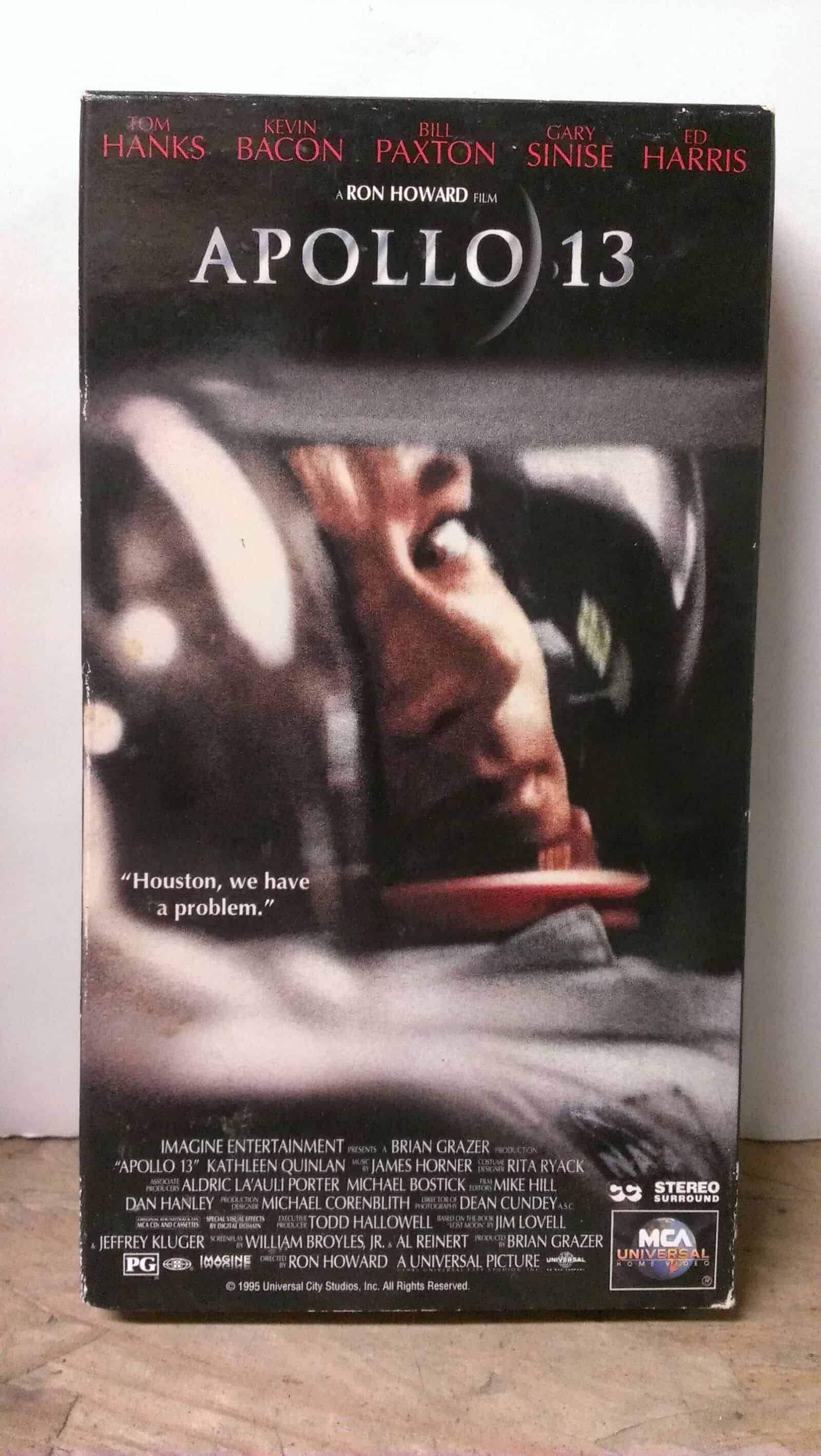
The best movie tagline of all time?
This tagline is just a line from the movie, but it teased what we all knew about the true story. Another one that's with us forever.
8. "His whole life was a million to one shot"
Rocky is the ultimate underdog story. The tagline embodies that. The whole franchise embodies that. With every new film, comes another montage dedicated to this tagline.
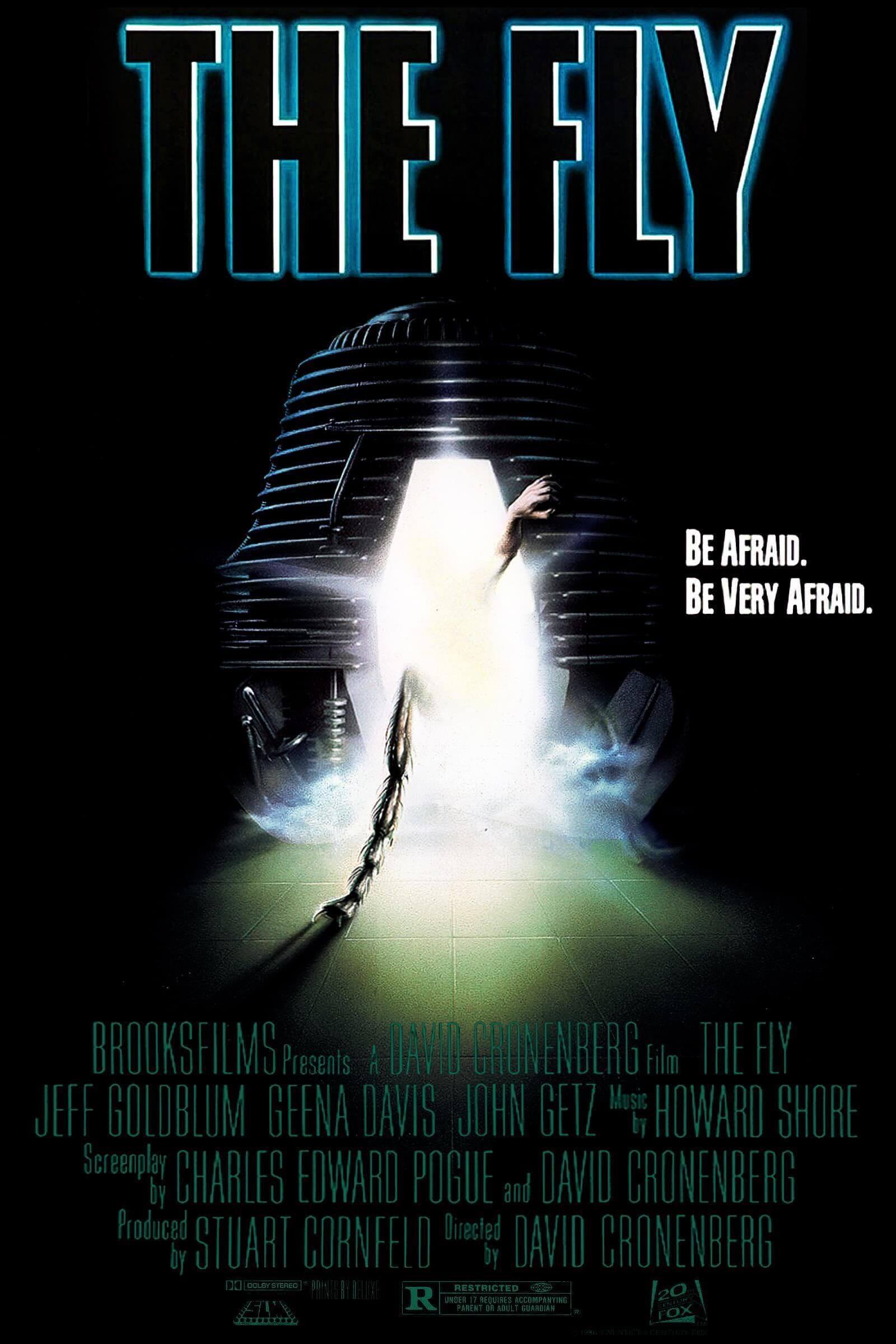
The tagline scares you into seeing the movie
Another tagline that transcends being just a tagline. It might even be more famous than the movie.
6. "Part man. Part Machine. All Cop."
Robocop is an excellent movie, and the tagline tee's it up pretty well.
The 40-Year-Old Virgin
5. "The longer you wait, the harder it gets."
The tagline double entendre at its pinnacle... no pun intended.
4. "Check-in. Relax. Take a shower."
When you're teeing up one of the most famous scenes in movie history, you can't go wrong.
3. "In Space, no-one can hear you scream."
This is arguably number one. It was very close…
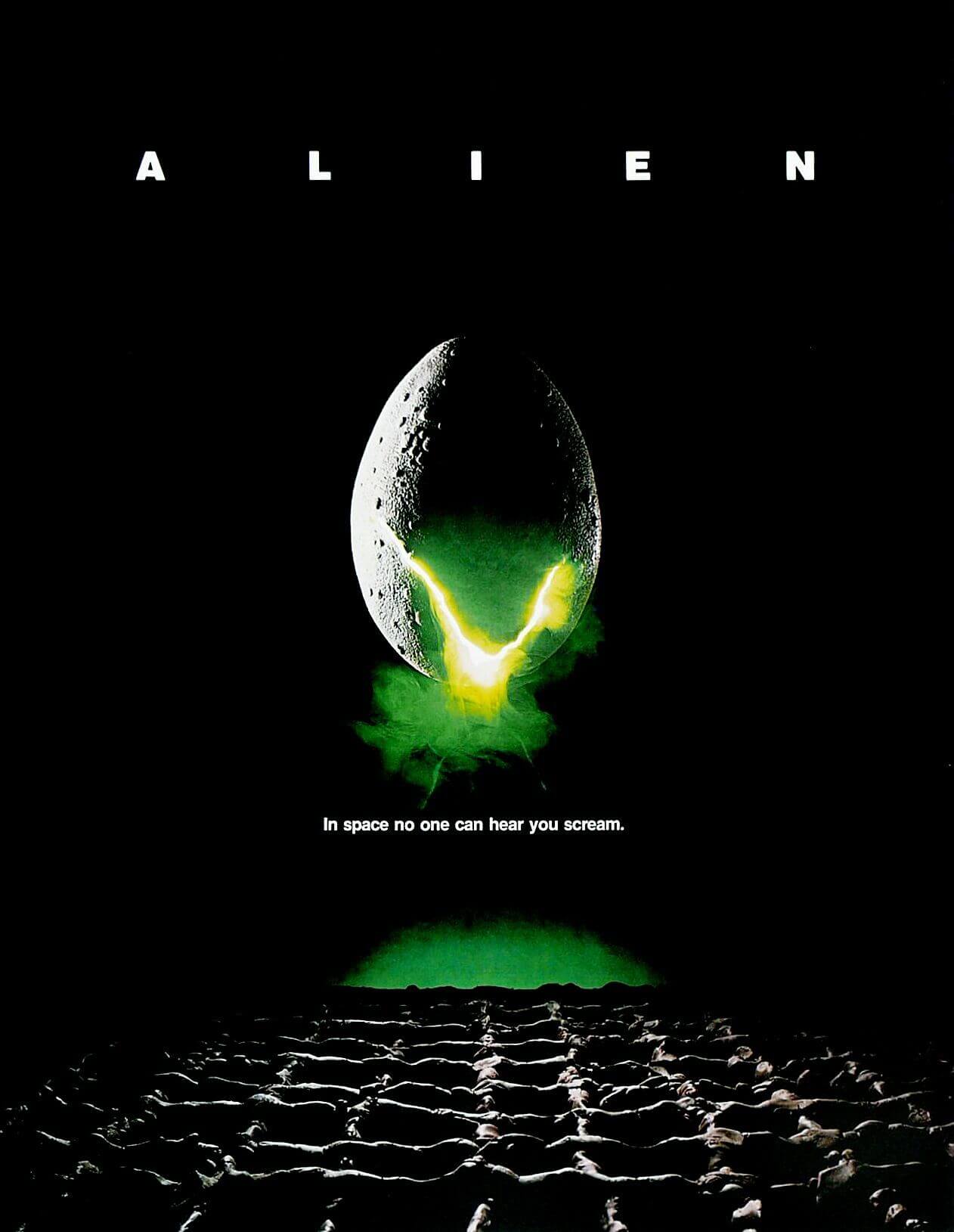
A terrifying tagline that gives you the creeps
2. "A long time ago in a galaxy far, far away..."
The tagline that launched a thousand starships. And toys. And spinoffs. And rides... and it's still going.
1. "When he pours, he reigns"
They should also be cool, because they are, after all, marketing slogans. Cocktail’s tagline does it all.
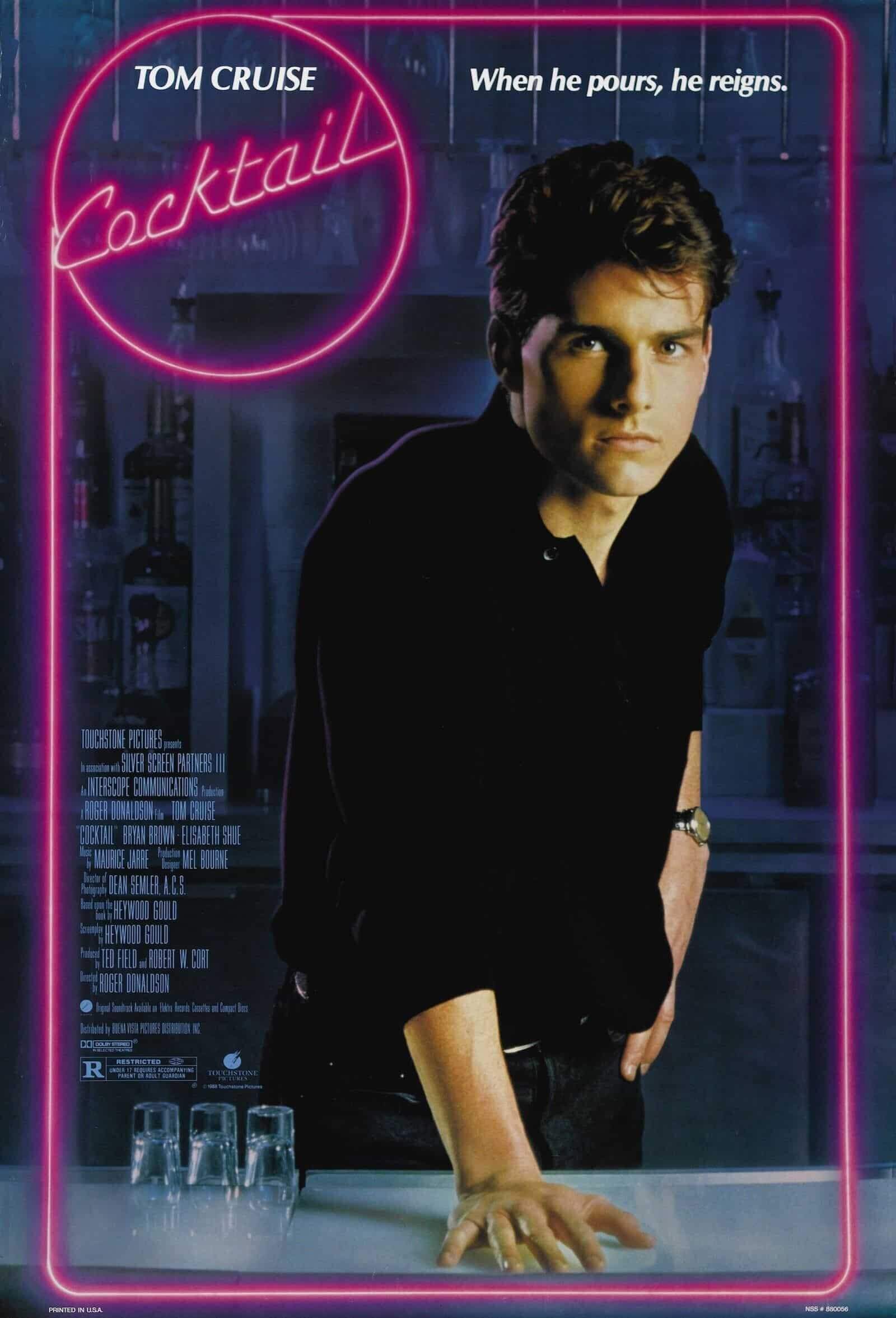
Still reigning thirty years later with this tagline.
Movie taglines should be fun. They should be simple.
They should have just the right amount of cheesy wordplay and tell us enough about the movie.
In the end, movie taglines are designed to get audiences to want to see your movie. Plant the seed of an idea, a drama, a conflict… and it will grow into a story in their imagination. Now hopefully, you already have a fully developed story. If you don't, grab some more tools below.
You can use StudioBinder's Screenwriting Software to write new scripts, import old scripts, and even collaborate for rewrite feedback.
Screenwriting is here
If you want to see your words on a movie poster one day, stop wasting time and write down the words!
Plot tools for dramatic writing
Before you get to the tagline you first have to get through the plot. The structure of your plot is as important as the script itself. Make sure you know how to structure your plat so that all the elements of your drama come through.
Up Next: Tools for dramatic writing →
Write and produce your scripts all in one place..
Write and collaborate on your scripts FREE . Create script breakdowns, sides, schedules, storyboards, call sheets and more.
- Pricing & Plans
- Product Updates
- Featured On
- StudioBinder Partners
- The Ultimate Guide to Call Sheets (with FREE Call Sheet Template)
- How to Break Down a Script (with FREE Script Breakdown Sheet)
- The Only Shot List Template You Need — with Free Download
- Managing Your Film Budget Cashflow & PO Log (Free Template)
- A Better Film Crew List Template Booking Sheet
- Best Storyboard Softwares (with free Storyboard Templates)
- Movie Magic Scheduling
- Gorilla Software
- Storyboard That
A visual medium requires visual methods. Master the art of visual storytelling with our FREE video series on directing and filmmaking techniques.
We’re in a golden age of TV writing and development. More and more people are flocking to the small screen to find daily entertainment. So how can you break put from the pack and get your idea onto the small screen? We’re here to help.
- Making It: From Pre-Production to Screen
- Is Film School Worth It — Why You Should or Shouldn’t Go
- How to Write a Poem — A Step-by-Step Guide
- What is a Character Flaw — And Why Writers Love Them
- How to Become a Movie Critic — Career Tips Explained
- What is an Indie Film — Definition & History Explained
- 647 Facebook
- 180 Pinterest
- 66 LinkedIn

Join Discovery, the new community for book lovers
Trust book recommendations from real people, not robots 🤓
Blog – Posted on Friday, Mar 29
17 book review examples to help you write the perfect review.

It’s an exciting time to be a book reviewer. Once confined to print newspapers and journals, reviews now dot many corridors of the Internet — forever helping others discover their next great read. That said, every book reviewer will face a familiar panic: how can you do justice to a great book in just a thousand words?
As you know, the best way to learn how to do something is by immersing yourself in it. Luckily, the Internet (i.e. Goodreads and other review sites , in particular) has made book reviews more accessible than ever — which means that there are a lot of book reviews examples out there for you to view!
In this post, we compiled 17 prototypical book review examples in multiple genres to help you figure out how to write the perfect review . If you want to jump straight to the examples, you can skip the next section. Otherwise, let’s first check out what makes up a good review.
Are you interested in becoming a book reviewer? We recommend you check out Reedsy Discovery , where you can earn money for writing reviews — and are guaranteed people will read your reviews! To register as a book reviewer, sign up here.
Pro-tip : But wait! How are you sure if you should become a book reviewer in the first place? If you're on the fence, or curious about your match with a book reviewing career, take our quick quiz:
Should you become a book reviewer?
Find out the answer. Takes 30 seconds!
What must a book review contain?
Like all works of art, no two book reviews will be identical. But fear not: there are a few guidelines for any aspiring book reviewer to follow. Most book reviews, for instance, are less than 1,500 words long, with the sweet spot hitting somewhere around the 1,000-word mark. (However, this may vary depending on the platform on which you’re writing, as we’ll see later.)
In addition, all reviews share some universal elements, as shown in our book review templates . These include:
- A review will offer a concise plot summary of the book.
- A book review will offer an evaluation of the work.
- A book review will offer a recommendation for the audience.
If these are the basic ingredients that make up a book review, it’s the tone and style with which the book reviewer writes that brings the extra panache. This will differ from platform to platform, of course. A book review on Goodreads, for instance, will be much more informal and personal than a book review on Kirkus Reviews, as it is catering to a different audience. However, at the end of the day, the goal of all book reviews is to give the audience the tools to determine whether or not they’d like to read the book themselves.
Keeping that in mind, let’s proceed to some book review examples to put all of this in action.
How much of a book nerd are you, really?
Find out here, once and for all. Takes 30 seconds!
Book review examples for fiction books
Since story is king in the world of fiction, it probably won’t come as any surprise to learn that a book review for a novel will concentrate on how well the story was told .
That said, book reviews in all genres follow the same basic formula that we discussed earlier. In these examples, you’ll be able to see how book reviewers on different platforms expertly intertwine the plot summary and their personal opinions of the book to produce a clear, informative, and concise review.
Note: Some of the book review examples run very long. If a book review is truncated in this post, we’ve indicated by including a […] at the end, but you can always read the entire review if you click on the link provided.
Examples of literary fiction book reviews
Kirkus Reviews reviews Ralph Ellison’s The Invisible Man :
An extremely powerful story of a young Southern Negro, from his late high school days through three years of college to his life in Harlem.
His early training prepared him for a life of humility before white men, but through injustices- large and small, he came to realize that he was an "invisible man". People saw in him only a reflection of their preconceived ideas of what he was, denied his individuality, and ultimately did not see him at all. This theme, which has implications far beyond the obvious racial parallel, is skillfully handled. The incidents of the story are wholly absorbing. The boy's dismissal from college because of an innocent mistake, his shocked reaction to the anonymity of the North and to Harlem, his nightmare experiences on a one-day job in a paint factory and in the hospital, his lightning success as the Harlem leader of a communistic organization known as the Brotherhood, his involvement in black versus white and black versus black clashes and his disillusion and understanding of his invisibility- all climax naturally in scenes of violence and riot, followed by a retreat which is both literal and figurative. Parts of this experience may have been told before, but never with such freshness, intensity and power.
This is Ellison's first novel, but he has complete control of his story and his style. Watch it.
Lyndsey reviews George Orwell’s 1984 on Goodreads:
YOU. ARE. THE. DEAD. Oh my God. I got the chills so many times toward the end of this book. It completely blew my mind. It managed to surpass my high expectations AND be nothing at all like I expected. Or in Newspeak "Double Plus Good." Let me preface this with an apology. If I sound stunningly inarticulate at times in this review, I can't help it. My mind is completely fried.
This book is like the dystopian Lord of the Rings, with its richly developed culture and economics, not to mention a fully developed language called Newspeak, or rather more of the anti-language, whose purpose is to limit speech and understanding instead of to enhance and expand it. The world-building is so fully fleshed out and spine-tinglingly terrifying that it's almost as if George travelled to such a place, escaped from it, and then just wrote it all down.
I read Fahrenheit 451 over ten years ago in my early teens. At the time, I remember really wanting to read 1984, although I never managed to get my hands on it. I'm almost glad I didn't. Though I would not have admitted it at the time, it would have gone over my head. Or at the very least, I wouldn't have been able to appreciate it fully. […]
The New York Times reviews Lisa Halliday’s Asymmetry :
Three-quarters of the way through Lisa Halliday’s debut novel, “Asymmetry,” a British foreign correspondent named Alistair is spending Christmas on a compound outside of Baghdad. His fellow revelers include cameramen, defense contractors, United Nations employees and aid workers. Someone’s mother has FedExed a HoneyBaked ham from Maine; people are smoking by the swimming pool. It is 2003, just days after Saddam Hussein’s capture, and though the mood is optimistic, Alistair is worrying aloud about the ethics of his chosen profession, wondering if reporting on violence doesn’t indirectly abet violence and questioning why he’d rather be in a combat zone than reading a picture book to his son. But every time he returns to London, he begins to “spin out.” He can’t go home. “You observe what people do with their freedom — what they don’t do — and it’s impossible not to judge them for it,” he says.
The line, embedded unceremoniously in the middle of a page-long paragraph, doubles, like so many others in “Asymmetry,” as literary criticism. Halliday’s novel is so strange and startlingly smart that its mere existence seems like commentary on the state of fiction. One finishes “Asymmetry” for the first or second (or like this reader, third) time and is left wondering what other writers are not doing with their freedom — and, like Alistair, judging them for it.
Despite its title, “Asymmetry” comprises two seemingly unrelated sections of equal length, appended by a slim and quietly shocking coda. Halliday’s prose is clean and lean, almost reportorial in the style of W. G. Sebald, and like the murmurings of a shy person at a cocktail party, often comic only in single clauses. It’s a first novel that reads like the work of an author who has published many books over many years. […]
Emily W. Thompson reviews Michael Doane's The Crossing on Reedsy Discovery :
In Doane’s debut novel, a young man embarks on a journey of self-discovery with surprising results.
An unnamed protagonist (The Narrator) is dealing with heartbreak. His love, determined to see the world, sets out for Portland, Oregon. But he’s a small-town boy who hasn’t traveled much. So, the Narrator mourns her loss and hides from life, throwing himself into rehabbing an old motorcycle. Until one day, he takes a leap; he packs his bike and a few belongings and heads out to find the Girl.
Following in the footsteps of Jack Kerouac and William Least Heat-Moon, Doane offers a coming of age story about a man finding himself on the backroads of America. Doane’s a gifted writer with fluid prose and insightful observations, using The Narrator’s personal interactions to illuminate the diversity of the United States.
The Narrator initially sticks to the highways, trying to make it to the West Coast as quickly as possible. But a hitchhiker named Duke convinces him to get off the beaten path and enjoy the ride. “There’s not a place that’s like any other,” [39] Dukes contends, and The Narrator realizes he’s right. Suddenly, the trip is about the journey, not just the destination. The Narrator ditches his truck and traverses the deserts and mountains on his bike. He destroys his phone, cutting off ties with his past and living only in the moment.
As he crosses the country, The Narrator connects with several unique personalities whose experiences and views deeply impact his own. Duke, the complicated cowboy and drifter, who opens The Narrator’s eyes to a larger world. Zooey, the waitress in Colorado who opens his heart and reminds him that love can be found in this big world. And Rosie, The Narrator’s sweet landlady in Portland, who helps piece him back together both physically and emotionally.
This supporting cast of characters is excellent. Duke, in particular, is wonderfully nuanced and complicated. He’s a throwback to another time, a man without a cell phone who reads Sartre and sleeps under the stars. Yet he’s also a grifter with a “love ‘em and leave ‘em” attitude that harms those around him. It’s fascinating to watch The Narrator wrestle with Duke’s behavior, trying to determine which to model and which to discard.
Doane creates a relatable protagonist in The Narrator, whose personal growth doesn’t erase his faults. His willingness to hit the road with few resources is admirable, and he’s prescient enough to recognize the jealousy of those who cannot or will not take the leap. His encounters with new foods, places, and people broaden his horizons. Yet his immaturity and selfishness persist. He tells Rosie she’s been a good mother to him but chooses to ignore the continuing concern from his own parents as he effectively disappears from his old life.
Despite his flaws, it’s a pleasure to accompany The Narrator on his physical and emotional journey. The unexpected ending is a fitting denouement to an epic and memorable road trip.
The Book Smugglers review Anissa Gray’s The Care and Feeding of Ravenously Hungry Girls :
I am still dipping my toes into the literally fiction pool, finding what works for me and what doesn’t. Books like The Care and Feeding of Ravenously Hungry Girls by Anissa Gray are definitely my cup of tea.
Althea and Proctor Cochran had been pillars of their economically disadvantaged community for years – with their local restaurant/small market and their charity drives. Until they are found guilty of fraud for stealing and keeping most of the money they raised and sent to jail. Now disgraced, their entire family is suffering the consequences, specially their twin teenage daughters Baby Vi and Kim. To complicate matters even more: Kim was actually the one to call the police on her parents after yet another fight with her mother. […]
Examples of children’s and YA fiction book reviews
The Book Hookup reviews Angie Thomas’ The Hate U Give :
♥ Quick Thoughts and Rating: 5 stars! I can’t imagine how challenging it would be to tackle the voice of a movement like Black Lives Matter, but I do know that Thomas did it with a finesse only a talented author like herself possibly could. With an unapologetically realistic delivery packed with emotion, The Hate U Give is a crucially important portrayal of the difficulties minorities face in our country every single day. I have no doubt that this book will be met with resistance by some (possibly many) and slapped with a “controversial” label, but if you’ve ever wondered what it was like to walk in a POC’s shoes, then I feel like this is an unflinchingly honest place to start.
In Angie Thomas’s debut novel, Starr Carter bursts on to the YA scene with both heart-wrecking and heartwarming sincerity. This author is definitely one to watch.
♥ Review: The hype around this book has been unquestionable and, admittedly, that made me both eager to get my hands on it and terrified to read it. I mean, what if I was to be the one person that didn’t love it as much as others? (That seems silly now because of how truly mesmerizing THUG was in the most heartbreakingly realistic way.) However, with the relevancy of its summary in regards to the unjust predicaments POC currently face in the US, I knew this one was a must-read, so I was ready to set my fears aside and dive in. That said, I had an altogether more personal, ulterior motive for wanting to read this book. […]
The New York Times reviews Melissa Albert’s The Hazel Wood :
Alice Crewe (a last name she’s chosen for herself) is a fairy tale legacy: the granddaughter of Althea Proserpine, author of a collection of dark-as-night fairy tales called “Tales From the Hinterland.” The book has a cult following, and though Alice has never met her grandmother, she’s learned a little about her through internet research. She hasn’t read the stories, because her mother, Ella Proserpine, forbids it.
Alice and Ella have moved from place to place in an attempt to avoid the “bad luck” that seems to follow them. Weird things have happened. As a child, Alice was kidnapped by a man who took her on a road trip to find her grandmother; he was stopped by the police before they did so. When at 17 she sees that man again, unchanged despite the years, Alice panics. Then Ella goes missing, and Alice turns to Ellery Finch, a schoolmate who’s an Althea Proserpine superfan, for help in tracking down her mother. Not only has Finch read every fairy tale in the collection, but handily, he remembers them, sharing them with Alice as they journey to the mysterious Hazel Wood, the estate of her now-dead grandmother, where they hope to find Ella.
“The Hazel Wood” starts out strange and gets stranger, in the best way possible. (The fairy stories Finch relays, which Albert includes as their own chapters, are as creepy and evocative as you’d hope.) Albert seamlessly combines contemporary realism with fantasy, blurring the edges in a way that highlights that place where stories and real life convene, where magic contains truth and the world as it appears is false, where just about anything can happen, particularly in the pages of a very good book. It’s a captivating debut. […]
James reviews Margaret Wise Brown’s Goodnight, Moon on Goodreads:
Goodnight Moon by Margaret Wise Brown is one of the books that followers of my blog voted as a must-read for our Children's Book August 2018 Readathon. Come check it out and join the next few weeks!
This picture book was such a delight. I hadn't remembered reading it when I was a child, but it might have been read to me... either way, it was like a whole new experience! It's always so difficult to convince a child to fall asleep at night. I don't have kids, but I do have a 5-month-old puppy who whines for 5 minutes every night when he goes in his cage/crate (hopefully he'll be fully housebroken soon so he can roam around when he wants). I can only imagine! I babysat a lot as a teenager and I have tons of younger cousins, nieces, and nephews, so I've been through it before, too. This was a believable experience, and it really helps show kids how to relax and just let go when it's time to sleep.
The bunny's are adorable. The rhymes are exquisite. I found it pretty fun, but possibly a little dated given many of those things aren't normal routines anymore. But the lessons to take from it are still powerful. Loved it! I want to sample some more books by this fine author and her illustrators.
Publishers Weekly reviews Elizabeth Lilly’s Geraldine :
This funny, thoroughly accomplished debut opens with two words: “I’m moving.” They’re spoken by the title character while she swoons across her family’s ottoman, and because Geraldine is a giraffe, her full-on melancholy mode is quite a spectacle. But while Geraldine may be a drama queen (even her mother says so), it won’t take readers long to warm up to her. The move takes Geraldine from Giraffe City, where everyone is like her, to a new school, where everyone else is human. Suddenly, the former extrovert becomes “That Giraffe Girl,” and all she wants to do is hide, which is pretty much impossible. “Even my voice tries to hide,” she says, in the book’s most poignant moment. “It’s gotten quiet and whispery.” Then she meets Cassie, who, though human, is also an outlier (“I’m that girl who wears glasses and likes MATH and always organizes her food”), and things begin to look up.
Lilly’s watercolor-and-ink drawings are as vividly comic and emotionally astute as her writing; just when readers think there are no more ways for Geraldine to contort her long neck, this highly promising talent comes up with something new.
Examples of genre fiction book reviews
Karlyn P reviews Nora Roberts’ Dark Witch , a paranormal romance novel , on Goodreads:
4 stars. Great world-building, weak romance, but still worth the read.
I hesitate to describe this book as a 'romance' novel simply because the book spent little time actually exploring the romance between Iona and Boyle. Sure, there IS a romance in this novel. Sprinkled throughout the book are a few scenes where Iona and Boyle meet, chat, wink at each, flirt some more, sleep together, have a misunderstanding, make up, and then profess their undying love. Very formulaic stuff, and all woven around the more important parts of this book.
The meat of this book is far more focused on the story of the Dark witch and her magically-gifted descendants living in Ireland. Despite being weak on the romance, I really enjoyed it. I think the book is probably better for it, because the romance itself was pretty lackluster stuff.
I absolutely plan to stick with this series as I enjoyed the world building, loved the Ireland setting, and was intrigued by all of the secondary characters. However, If you read Nora Roberts strictly for the romance scenes, this one might disappoint. But if you enjoy a solid background story with some dark magic and prophesies, you might enjoy it as much as I did.
I listened to this one on audio, and felt the narration was excellent.
Emily May reviews R.F. Kuang’s The Poppy Wars , an epic fantasy novel , on Goodreads:
“But I warn you, little warrior. The price of power is pain.”
Holy hell, what did I just read??
➽ A fantasy military school
➽ A rich world based on modern Chinese history
➽ Shamans and gods
➽ Detailed characterization leading to unforgettable characters
➽ Adorable, opium-smoking mentors
That's a basic list, but this book is all of that and SO MUCH MORE. I know 100% that The Poppy War will be one of my best reads of 2018.
Isn't it just so great when you find one of those books that completely drags you in, makes you fall in love with the characters, and demands that you sit on the edge of your seat for every horrific, nail-biting moment of it? This is one of those books for me. And I must issue a serious content warning: this book explores some very dark themes. Proceed with caution (or not at all) if you are particularly sensitive to scenes of war, drug use and addiction, genocide, racism, sexism, ableism, self-harm, torture, and rape (off-page but extremely horrific).
Because, despite the fairly innocuous first 200 pages, the title speaks the truth: this is a book about war. All of its horrors and atrocities. It is not sugar-coated, and it is often graphic. The "poppy" aspect refers to opium, which is a big part of this book. It is a fantasy, but the book draws inspiration from the Second Sino-Japanese War and the Rape of Nanking.
Crime Fiction Lover reviews Jessica Barry’s Freefall , a crime novel:
In some crime novels, the wrongdoing hits you between the eyes from page one. With others it’s a more subtle process, and that’s OK too. So where does Freefall fit into the sliding scale?
In truth, it’s not clear. This is a novel with a thrilling concept at its core. A woman survives plane crash, then runs for her life. However, it is the subtleties at play that will draw you in like a spider beckoning to an unwitting fly.
Like the heroine in Sharon Bolton’s Dead Woman Walking, Allison is lucky to be alive. She was the only passenger in a private plane, belonging to her fiancé, Ben, who was piloting the expensive aircraft, when it came down in woodlands in the Colorado Rockies. Ally is also the only survivor, but rather than sitting back and waiting for rescue, she is soon pulling together items that may help her survive a little longer – first aid kit, energy bars, warm clothes, trainers – before fleeing the scene. If you’re hearing the faint sound of alarm bells ringing, get used to it. There’s much, much more to learn about Ally before this tale is over.
Kirkus Reviews reviews Ernest Cline’s Ready Player One , a science-fiction novel :
Video-game players embrace the quest of a lifetime in a virtual world; screenwriter Cline’s first novel is old wine in new bottles.
The real world, in 2045, is the usual dystopian horror story. So who can blame Wade, our narrator, if he spends most of his time in a virtual world? The 18-year-old, orphaned at 11, has no friends in his vertical trailer park in Oklahoma City, while the OASIS has captivating bells and whistles, and it’s free. Its creator, the legendary billionaire James Halliday, left a curious will. He had devised an elaborate online game, a hunt for a hidden Easter egg. The finder would inherit his estate. Old-fashioned riddles lead to three keys and three gates. Wade, or rather his avatar Parzival, is the first gunter (egg-hunter) to win the Copper Key, first of three.
Halliday was obsessed with the pop culture of the 1980s, primarily the arcade games, so the novel is as much retro as futurist. Parzival’s great strength is that he has absorbed all Halliday’s obsessions; he knows by heart three essential movies, crossing the line from geek to freak. His most formidable competitors are the Sixers, contract gunters working for the evil conglomerate IOI, whose goal is to acquire the OASIS. Cline’s narrative is straightforward but loaded with exposition. It takes a while to reach a scene that crackles with excitement: the meeting between Parzival (now world famous as the lead contender) and Sorrento, the head of IOI. The latter tries to recruit Parzival; when he fails, he issues and executes a death threat. Wade’s trailer is demolished, his relatives killed; luckily Wade was not at home. Too bad this is the dramatic high point. Parzival threads his way between more ’80s games and movies to gain the other keys; it’s clever but not exciting. Even a romance with another avatar and the ultimate “epic throwdown” fail to stir the blood.
Too much puzzle-solving, not enough suspense.
Book review examples for non-fiction books
Nonfiction books are generally written to inform readers about a certain topic. As such, the focus of a nonfiction book review will be on the clarity and effectiveness of this communication . In carrying this out, a book review may analyze the author’s source materials and assess the thesis in order to determine whether or not the book meets expectations.
Again, we’ve included abbreviated versions of long reviews here, so feel free to click on the link to read the entire piece!
The Washington Post reviews David Grann’s Killers of the Flower Moon :
The arc of David Grann’s career reminds one of a software whiz-kid or a latest-thing talk-show host — certainly not an investigative reporter, even if he is one of the best in the business. The newly released movie of his first book, “The Lost City of Z,” is generating all kinds of Oscar talk, and now comes the release of his second book, “Killers of the Flower Moon: The Osage Murders and the Birth of the FBI,” the film rights to which have already been sold for $5 million in what one industry journal called the “biggest and wildest book rights auction in memory.”
Grann deserves the attention. He’s canny about the stories he chases, he’s willing to go anywhere to chase them, and he’s a maestro in his ability to parcel out information at just the right clip: a hint here, a shading of meaning there, a smartly paced buildup of multiple possibilities followed by an inevitable reversal of readerly expectations or, in some cases, by a thrilling and dislocating pull of the entire narrative rug.
All of these strengths are on display in “Killers of the Flower Moon.” Around the turn of the 20th century, oil was discovered underneath Osage lands in the Oklahoma Territory, lands that were soon to become part of the state of Oklahoma. Through foresight and legal maneuvering, the Osage found a way to permanently attach that oil to themselves and shield it from the prying hands of white interlopers; this mechanism was known as “headrights,” which forbade the outright sale of oil rights and granted each full member of the tribe — and, supposedly, no one else — a share in the proceeds from any lease arrangement. For a while, the fail-safes did their job, and the Osage got rich — diamond-ring and chauffeured-car and imported-French-fashion rich — following which quite a large group of white men started to work like devils to separate the Osage from their money. And soon enough, and predictably enough, this work involved murder. Here in Jazz Age America’s most isolated of locales, dozens or even hundreds of Osage in possession of great fortunes — and of the potential for even greater fortunes in the future — were dispatched by poison, by gunshot and by dynamite. […]
Stacked Books reviews Malcolm Gladwell’s Outliers :
I’ve heard a lot of great things about Malcolm Gladwell’s writing. Friends and co-workers tell me that his subjects are interesting and his writing style is easy to follow without talking down to the reader. I wasn’t disappointed with Outliers. In it, Gladwell tackles the subject of success – how people obtain it and what contributes to extraordinary success as opposed to everyday success.
The thesis – that our success depends much more on circumstances out of our control than any effort we put forth – isn’t exactly revolutionary. Most of us know it to be true. However, I don’t think I’m lying when I say that most of us also believe that we if we just try that much harder and develop our talent that much further, it will be enough to become wildly successful, despite bad or just mediocre beginnings. Not so, says Gladwell.
Most of the evidence Gladwell gives us is anecdotal, which is my favorite kind to read. I can’t really speak to how scientifically valid it is, but it sure makes for engrossing listening. For example, did you know that successful hockey players are almost all born in January, February, or March? Kids born during these months are older than the others kids when they start playing in the youth leagues, which means they’re already better at the game (because they’re bigger). Thus, they get more play time, which means their skill increases at a faster rate, and it compounds as time goes by. Within a few years, they’re much, much better than the kids born just a few months later in the year. Basically, these kids’ birthdates are a huge factor in their success as adults – and it’s nothing they can do anything about. If anyone could make hockey interesting to a Texan who only grudgingly admits the sport even exists, it’s Gladwell. […]
Quill and Quire reviews Rick Prashaw’s Soar, Adam, Soar :
Ten years ago, I read a book called Almost Perfect. The young-adult novel by Brian Katcher won some awards and was held up as a powerful, nuanced portrayal of a young trans person. But the reality did not live up to the book’s billing. Instead, it turned out to be a one-dimensional and highly fetishized portrait of a trans person’s life, one that was nevertheless repeatedly dubbed “realistic” and “affecting” by non-transgender readers possessing only a vague, mass-market understanding of trans experiences.
In the intervening decade, trans narratives have emerged further into the literary spotlight, but those authored by trans people ourselves – and by trans men in particular – have seemed to fall under the shadow of cisgender sensationalized imaginings. Two current Canadian releases – Soar, Adam, Soar and This One Looks Like a Boy – provide a pointed object lesson into why trans-authored work about transgender experiences remains critical.
To be fair, Soar, Adam, Soar isn’t just a story about a trans man. It’s also a story about epilepsy, the medical establishment, and coming of age as seen through a grieving father’s eyes. Adam, Prashaw’s trans son, died unexpectedly at age 22. Woven through the elder Prashaw’s narrative are excerpts from Adam’s social media posts, giving us glimpses into the young man’s interior life as he traverses his late teens and early 20s. […]
Book Geeks reviews Elizabeth Gilbert’s Eat, Pray, Love :
WRITING STYLE: 3.5/5
SUBJECT: 4/5
CANDIDNESS: 4.5/5
RELEVANCE: 3.5/5
ENTERTAINMENT QUOTIENT: 3.5/5
“Eat Pray Love” is so popular that it is almost impossible to not read it. Having felt ashamed many times on my not having read this book, I quietly ordered the book (before I saw the movie) from amazon.in and sat down to read it. I don’t remember what I expected it to be – maybe more like a chick lit thing but it turned out quite different. The book is a real story and is a short journal from the time when its writer went travelling to three different countries in pursuit of three different things – Italy (Pleasure), India (Spirituality), Bali (Balance) and this is what corresponds to the book’s name – EAT (in Italy), PRAY (in India) and LOVE (in Bali, Indonesia). These are also the three Is – ITALY, INDIA, INDONESIA.
Though she had everything a middle-aged American woman can aspire for – MONEY, CAREER, FRIENDS, HUSBAND; Elizabeth was not happy in her life, she wasn’t happy in her marriage. Having suffered a terrible divorce and terrible breakup soon after, Elizabeth was shattered. She didn’t know where to go and what to do – all she knew was that she wanted to run away. So she set out on a weird adventure – she will go to three countries in a year and see if she can find out what she was looking for in life. This book is about that life changing journey that she takes for one whole year. […]
Emily May reviews Michelle Obama’s Becoming on Goodreads:
Look, I'm not a happy crier. I might cry at songs about leaving and missing someone; I might cry at books where things don't work out; I might cry at movies where someone dies. I've just never really understood why people get all choked up over happy, inspirational things. But Michelle Obama's kindness and empathy changed that. This book had me in tears for all the right reasons.
This is not really a book about politics, though political experiences obviously do come into it. It's a shame that some will dismiss this book because of a difference in political opinion, when it is really about a woman's life. About growing up poor and black on the South Side of Chicago; about getting married and struggling to maintain that marriage; about motherhood; about being thrown into an amazing and terrifying position.
I hate words like "inspirational" because they've become so overdone and cheesy, but I just have to say it-- Michelle Obama is an inspiration. I had the privilege of seeing her speak at The Forum in Inglewood, and she is one of the warmest, funniest, smartest, down-to-earth people I have ever seen in this world.
And yes, I know we present what we want the world to see, but I truly do think it's genuine. I think she is someone who really cares about people - especially kids - and wants to give them better lives and opportunities.
She's obviously intelligent, but she also doesn't gussy up her words. She talks straight, with an openness and honesty rarely seen. She's been one of the most powerful women in the world, she's been a graduate of Princeton and Harvard Law School, she's had her own successful career, and yet she has remained throughout that same girl - Michelle Robinson - from a working class family in Chicago.
I don't think there's anyone who wouldn't benefit from reading this book.
Hopefully, this post has given you a better idea of how to write a book review. You might be wondering how to put all of this knowledge into action now! Many book reviewers start out by setting up a book blog. If you don’t have time to research the intricacies of HTML, check out Reedsy Discovery — where you can read indie books for free and review them without going through the hassle of creating a blog. To register as a book reviewer , go here .
And if you’d like to see even more book review examples, simply go to this directory of book review blogs and click on any one of them to see a wealth of good book reviews. Beyond that, it's up to you to pick up a book and pen — and start reviewing!
Continue reading
More posts from across the blog.
The 115 Best Books of All Time
Let’s take a trip through time and discover the world’s literary trends, from epic poems to dystopian novels, by looking at 115 of the best books of all time!
The 20+ Best Places To Find Free Audiobooks Online
It’s not hard to see why audiobooks have recently grown in popularity: there’s something uniquely magnetic about stories brought to life by professional actors who can add texture to various personalities. If you want to absorb stories while you walk, do your chores, or lie do...
125 Best Children's Books of All Time
Whether it’s read out loud by a parent, covertly read under the covers with a flashlight after bedtime, or assigned as class reading — children’s books have the ability to
Heard about Reedsy Discovery?
Trust real people, not robots, to give you book recommendations.
Or sign up with an
Or sign up with your social account
- Submit your book
- Reviewer directory

Want to be a book reviewer?
Review new books and start building your portfolio.

IMAGES
VIDEO
COMMENTS
A classic movie review example has a neat structure that clearly communicates the author's sentiment toward the film in a clean, straightforward manner. Roger Ebert's review of North is the perfect example of that. 1. "North" by Roger Ebert. This review starts with a catchy hook, making readers curious for Ebert to elaborate on his ...
Step 1: Watch the Movie. Before you can write a movie review, you need to watch the film attentively. Take notes while watching, paying attention to the plot, characters, cinematography, acting, and any other elements that stand out. Understanding the movie in its entirety is crucial to providing an informed perspective in your review.
The basic principles for review headlines are simple: Avoid blandness, make a brief but interesting point, don't try to say too much, and use keywords when possible. Let's look at an example. cheapest oakley sunglasses. You've just been to a restaurant where the food was excellent but the service left much to be desired.
The title of the film/documentary - Mention the title of the film twice in our headline features the name of the movie or documentary. Don't skip mentioning the headline in the text. ... If you look at our movie review examples available for free, you can notice that the structure of such papers is different from an ordinary essay's ...
Find a place to mention the director's name and the full movie title. If you feel you must discuss information that might "spoil" things for readers, warn them first. 2. Start to talk about the film's technical and artistic choices. Plot is just one piece of a movie, and shouldn't dictate your entire review.
If you are staring at a blank screen unable to come up with ideas, go through the steps given below to write a film review: Let us discuss these steps in detail. 1. Watch the Movie Twice. It may sound obvious, but most of the students ignore it and simply copy-paste content posted by professional reviewers.
1. Take notes. As you watch the film, note any critical elements you want to discuss in your review. Write down factors that pique your interest, like performance, lighting choices, music placement, CGI, thematic arcs, and other elements you think the audience will find interesting. 2.
Likewise, if your review includes a comprehensive summary of the movie's plot, you're doing it wrong. To be sure, you need to make clear whether the movie is a soft-spoken arthouse film or the latest installment in the ever-growing pantheon of big-budget superhero flicks, and whether it's set in 9th century China or on Mars.
Step-by-step review writing tips. 1. Watch the movie. The first time that you watch the movie, look for overarching themes or patterns, and establish what the film is primarily about. Take note of the main characters, as well as the setting. 2. Watch the movie again and take notes.
At first, you need to watch the movie or film in one sitting. Here, you need to grasp the general idea of the film. Write whatever you got from the movie and your general reaction to the film, noting the main focus and lessons you think the film wants to pass across. Watch the film again, this time being keen with every attribute of the film.
1. Watch the film at least once. For new reviewers, it's impossible to capture everything after one viewing. Watching the film first, then watching to take notes, is an easy way to improve the quality of your final review. This will also make it easy to recall in-the-moment thoughts and reactions.
4. Bring the feelings. In addition to presenting the plot of the film, you should add emotions to the text of the review and show what you felt while watching it. 5. Define the main purpose of the movie. Perhaps the film's purpose is hidden in its plot.
Name of the director. Title of the book (if based on a book) Draft the review outline: Draft an outline with which you will write the review. The overview will help you organize your review concisely and logically. The outline is more like the skeletal frame on which the whole study will stand.
2. Express your opinion of the film, but support your criticism. If you are offended or disappointed or embarrassed, provide a valid reason, even if you think it is obvious. A film review that comes across as a personal attack on an actor, director, or screenwriter or a diatribe about a genre is a failed review. 3.
Another thing to remember is that your review should always have a title, and that title should include the name of the film. Introduction - Essential details and mini-summary. Summary - A description of the film and some important details. Analysis - An evaluation of different elements. Conclusion - Your opinion and a recommendation.
Freedom Writers. Directed by Richard LaGravenese. Biography, Crime, Drama. PG-13. 2h 3m. By Manohla Dargis. Jan. 5, 2007. As a cinematic subspecies, films about teachers working with throwaway ...
Even if your headline contains this title, you should indicate it at the beginning of your essay also and even once or twice after. ... To ensure your writing process's certainty, we have prepared for you a good movie review example. Mulan . This movie originates from a Disney cartoon with the same title. Still, the recently presented movie ...
"The Dark Knight" was my dorm-room poster movie — I'm part of the generation that explored films through the IMDb Top 250 growing up — though as my cinematic horizons expanded and my ...
The director's name. The names of the lead actors. The genre. 2. Take notes on the movie as you watch it. That's like a job of a journalist or something. But if you are really serious about reviewing a specific movie, grab a notepad or even your laptop. You may also see chapter outline example.
Double Indemnity. "From the moment they met it was murder." One of the great noir tagline examples. Billy Wilder's Double Indemnity is a work of noir genius. Every line of dialogue is as sharp as the tagline itself. If you haven't seen it, you're in for a treat. Learn more dialogue tips for your own writing and also for your inevitable tagline.
This is what makes writing a good headline critical to getting clicks, but also hard to do. That's why today we're going through 88 headline examples to help you grab the attention of your audience and make a memorable impression. Jump to: But first, let's talk about what makes a successful headline.
Click Write Review at the top right of the page. Select Company Review. Choose your Employer Status. Rate your company by choosing a star rating, and add details in the fields provided. Add feedback up to 5000 characters for overall rating, title of your review (this is the review headline that displays on the site), pros, cons, advice to ...
It is a fantasy, but the book draws inspiration from the Second Sino-Japanese War and the Rape of Nanking. Crime Fiction Lover reviews Jessica Barry's Freefall, a crime novel: In some crime novels, the wrongdoing hits you between the eyes from page one. With others it's a more subtle process, and that's OK too.